- Lifestyle and Cuisine

A Guide to German Etiquette
Nothing’s as easy as sticking your foot in it when you’re abroad. But don’t worry. Here the do's and don’ts.

Shaking hands
Germans are great hand-shakers, and they like to do so both when arriving and when departing. It is common for a person who is joining a group to shake hands with every single individual.
Beer and wine are part of a normal dinner and alcoholic drinks are usually offered to guests. Not drinking, however, is completely accepted. Do not insist on alcoholic drinks if a person has rejected your initial offer and don’t order them for them. A German who rejects a drink is not just being shy or polite but does not want to drink. For some cultures it is uncommon to see teenagers order a beer at restaurants and pubs. Remember that the legal drinking age in Germany is 16 for beer and wine and 18 for spirits.
Punctuality
Don’t turn up late for an appointment or when meeting people. Germans are extremely punctual, and even a few minutes’ delay can offend. Be five to 10 minutes early for important appointments and be sure to call the people you are meeting if you really cannot make it in time.
In private, the older person suggests using the informal "du" to the younger person. In the business world, the higher ranking person–regardless of age and sex–would always be the one to suggest switching to "du." A nice intermediate step is to address a person by their first name but then use the formal "Sie." Always ask, however, before you decide to take this step. If you’re not on a first-name basis in German, you can still switch when speaking English. But don’t forget to switch back.
Bring flowers if you’re invited to a German home for some social occasion. If the flowers are wrapped in paper, remember to take off the wrapping just before you enter the home.
Germans are extremely environmentally conscious and separate their garbage to facilitate recycling. If your neighbors spot you throwing recyclable glass or paper into the regular garbage, your relationship could be strained for good.
When close friends greet each other, it is common to kiss both the left and right cheeks. However, this is considered inappropriate in a business setting.
Silverware language
Crossing the knife and fork on your plate is an indication that you are not yet finished with your meal. Placing knife and fork on the right side of the plate in parallel is a signal to the waiter that you have finished and that the plate can be cleared away.
It is polite to address everyone by their family name and "Sie." Do not leave off double-barreled names, such as Frau Müller-Weber. Names are inserted into conversation after every few sentences.
Forget this outdated form of addressing young women. These days, rather than being seen as polite, it can be offensive. Just use the normal "Frau Müller."
In Germany, you might be confronted with a much more tolerant, open attitude to public nudity than might be the case in your home country. Saunas, a minority of swimming pools and even some public parks on sunny days are considered to be "textile free," at least at particular times. Getting together completely naked in a sauna, however, has no sexual dimension to it whatsoever. But if you feel you would be uncomfortable, it may be a good idea to ask first before you join a trip to the pool. This attitude spills over to television, where the programs and even the commercials can feature more nudity than is the case in most countries.
When customers enter shops, especially smaller outlets, they greet everyone in the shop. The same is true of doctors’ waiting rooms. So practice saying "Guten Tag" and "Auf Wiedersehen."
Seating in restaurants
It is common to share tables with perfect strangers when restaurants are full and very busy. Before you do so, however, always point to the free seat and ask, "Ist dieser Platz noch frei?" (Is this seat occupied?). Also, wish the other diners at the table "Guten Appetit." But don’t expect any further conversation at the table. It may be very welcome, but you shouldn’t force it. When you leave, be sure to bid farewell to your table companions.
It’s common to clink glasses with a "Prost" ("cheers") or "Zum Wohl" ("good health") before drinking. At official dinners, it is more common to lift the glass by the stem and nod meaningfully to the others. The host should lead the toast. At a dinner party or in a restaurant, you should not start eating or drinking until everyone in the group has received their drink or their meal, and then follow the lead of the host.
© www.deutschland.de
You would like to receive regular information about Germany? Subscribe here:
- Newsletter #UpdateGermany
Related content

The ultimate guide to understanding German etiquette
Recently updated on June 12th, 2020 at 05:14 pm
Proper German etiquette goes beyond simply knowing what greeting to use. From not leaving your hotel room with wet hair to not staring at naked bodies, we’ve got you covered.
Don’t get caught red-faced on your visit. This ultimate travel guide to German etiquette will have you exploring like a local.
Use the proper greetings
Greetings in Germany are more nuanced than merely waving a casual “hi”and “bye”. Appropriate greetings depend on who you’re welcoming, and when you’re doing so.
Until midday: Guten Morgen (good morning)
In the afternoon until sunset: Guten Tag (Good day)
In the evening: Guten Abend (Good evening)
Regional differences also come into play. In Bavaria, in the famous foot-stomping, festive beer halls of Munich and surrounds, the locals may say Grüß Gott (God’s greetings). All Trafalgar’s best-selling Germany trips visit Bavaria, so chances are you’ll hear it on your journey. Although unusual for visitors to use this term, you may get an overtly friendlier reception. Go on, give it a try.

To say goodbye, in a formal setting such as work or with strangers, say Auf Wiedersehen (until we see each other again) or just Wiedersehen .
In a less formal environment, a simple Tschüss (bye) works. Use the formal greeting unless the other person opts for the more casual farewell first.
Remember, a simple “ Hallo ” is better than not saying something.
Shaking hands with everyone in the group is also good German etiquette, whether arriving or departing.
Forget the small talk
The misconception that Germans are not friendly and rather blunt may boil down to this simple German etiquette rule: It’s not normal to make small talk.
Generally speaking, of course, Germans pride themselves on being serious, frank and deep thinkers. So, whilst discussing the weather or what you ate for lunch may pass for friendly banter elsewhere in the world, in Germany that chitchat may be seen as a superficial waste of time. Think of it as American small talk versus German no talk .
Nudity is normal
German small talk may not progress beyond the bare-bones, but baring your body, on the other hand, is completely normal.
On a sunny summer’s day, beaches, parks and swimming pools will feature some textilfrei (textile free) locals. Warm-up in winter with a visit to the sauna. Clothes are not optional – locals will stare if you roam around in your bathing suit. So when in Germany, do as the Germans do and embrace your birthday suit.
Dry your hair
In a rush to get to breakfast in the morning? Yes, time is of the essence to explore Germany’s incredible sights, but don’t step in public with wet hair. It’s a no-no. If you’ve been at the gym, sauna or swimming pool, dry your hair before leaving.
RELATED CONTENT: 5 Hidden Gems of Germany
Maintain eye contact when clinking your stein of beer with your fellow revellers. Legend has it that failure to do so results in seven years of bad luck – specifically in the ‘bedroom’ department.

No-no to tap water
In many parts of the world, you can ask for a glass of tap water in restaurants. But in Germany, you’ll likely receive a blank stare.
While tap water is safe to drink in Germany, the reason why drinking water straight from the tap is a no-no is a linguistic one. In German, the word for tap water is Leitungswasser . The rather unfortunate translation is plumbing water. The thought of sewer water is likely not what you’d want to quench your thirst. While the water is indeed safe to drink, don’t alarm the locals. Instead, request a glass of bottled water (still or sparkling).
Time waits for no-one, especially not in Germany. Germans pride themselves on their punctuality. Being late and too early is as bad as each other. Never arrive more than five minutes early, and certainly don’t be late. If you’re running late or ahead of schedule, let your host know.

Obey the rules of the road
While elsewhere in the world, crossing the road when the lights are red when there are no other cars in sight, is a sneaky yet not uncommon sight. In Germany, don’t. You’ll be in for a scolding from a law-abiding citizen.
In a country filled with dedicated pedestrian lanes, ensure you obey the laws. Watch where you walk, cycle and drive. Everything has its place.
Pay with cash in restaurants
Dining out in Germany or Austria? Whether you’re in the cities, dining in the countryside a la Sound of Music or exploring the best German Christmas markets, bring cash with you. Many restaurants and eateries don’t accept credit cards.
GET INSPIRED : Best of Germany
Also, don’t wait to be seated. You’ll be standing for a long time. It’s acceptable in Germany for diners to find their seats.
Expect to be seated with strangers – especially in busy restaurants. Politely greet your new table companions but don’t worry, you’re not expected to make conversation.
Your bill or cheque won’t appear magically after dessert. Ask for it, with a polite “ Zahlen bitte! ” Tipping is good manners (5 to 10%, sometimes even 15%). And don’t leave your tip unattended on your table – hand it directly to the waiter or waitress when paying.
With this ultimate guide to German etiquette, rest assured that you won’t be putting your foot in it on your next trip to Deutschland. And if we’ve missed anything, we’d love to hear your contributions to our definitive guide to German etiquette. Share your insights in the comments below…
Want to hear more from us?
Sign up to receive inspiring travel articles, offers & news
" * " indicates required fields
Privacy Overview
Sign up for our emails.
You are using an outdated browser. Please upgrade your browser or activate Google Chrome Frame to improve your experience.
German Etiquette: Customs, Norms and How to Be Superpolite
You’re probably here for an in-depth exploration of German etiquette, and so that’s what you’ll get today.
In this post, we’ll be looking at the things that you should and shouldn’t do while visiting Germany, Austria or Switzerland .
Of course, this is a blog about the German language, so we’ll also get into some details about the vocabulary used in different situations throughout Germany, Austria and German-speaking Switzerland.
Nevertheless, to avoid that long phrase, I’ll often simply refer to “Germany” or “Germans,” purely for simplicity’s sake. But as with many things, regional differences can be a big deal , so I’ll mention a few regional etiquette differences when they’re relevant.
German Etiquette for Everyday Life
Use the proper greetings and goodbyes., formal vs. informal: use sie when in doubt., punctuality: don’t be early, don’t be late., dress the part., don’t stare at the naked people., don’t misinterpret the more reserved attitude., get some “house shoes.”, keep an open mind about closed doors., guys, think about how you pee., “don’t mention the war”, german etiquette for work, plan, plan and plan again., shake hands. repeat., but don’t overdo it. that’s enough with the touching, learn how to dress., dining etiquette: eating in germany, use your utensils..
- Mahlzeit! Eat with good wishes.
Maintain eye contact when toasting.
Drink if you want to., keep your hands on the table, but not your elbows., together or separate pay attention when paying., when in berlin, do as the berliners do, and one more thing....
Download: This blog post is available as a convenient and portable PDF that you can take anywhere. Click here to get a copy. (Download)
When you arrive at a new place or leave it, you’ll normally have to interact with the people in that place, whether it’s a house, an office, a store or any other public or private area.
Generally speaking, greetings and farewells are more acknowledged in German-speaking countries than they are in English-speaking countries.
If you walk into a party in the US, for example, a casual “hey” and a wave to the room will often be enough. In Germany, however, you’ll generally greet or be introduced to most people in the room, and that involves lots of hand shaking.
Depending on the time of day and the place, you can usually feel free to say to most people you meet a hearty Guten Morgen (good morning) , used until noon; Guten Tag (good day), used basically any time the sun is up, but more in the afternoon; or Guten Abend (good evening). When saying goodbye to someone at might, Gute Nacht (good night) is the appropriate German expression .
Other, less formal greetings, such as Hallo , aren’t as common, especially if you don’t know the person well. But as a near-cognate, Hallo is really easy for English speakers to remember, and it can work in a pinch.
If you’re down south in Bavaria or Austria, you’ll often hear the phrase Grüß Gott , which basically means “God’s greetings.” If you say that as a tourist or visitor, it may feel a bit strange, but it can lead to a warmer reception if you go into a store, for example. Similar (in use, but not necessarily meaning) greeting words are Grüezi in Switzerland and Moin in parts of northern Germany. These tend to be used more commonly by natives, though, and it may seem strange to hear visitors using it. If in doubt, you can always revert back to a Guten [x] .
For taking leave, the word Tschüss (bye) can work in many situations. It’s not really formal, but if someone says it to you, you can certainly say it back.
If you’re in a store, at work or in any more formal situation, you can say Auf Wiedersehen (until we see each other again) or just Wiedersehen . In parts of the South, people will probably say Wiederschauen instead ( sehen is more like “see,” and schauen is more like “look”), but it means the same thing.
If you’re talking on the phone, you’re not actually seeing or looking at the other person, so then you should say Auf Wiederhören (until we hear each other again).
For both on the phone and in person, the same rule of thumb applies: If someone says a certain greeting or a goodbye to you first, you can probably reciprocate with the same thing.
Here’s where language plays a huge role, and it often causes trouble for English speakers.
In English, if we want to speak “formally” with someone, we generally change the specific words we use, such as substituting “vulgar” or common words for euphemisms or other words that make our speech sound more intelligent. We may also use a title like “Mister,” “Miss,” etc., but we don’t actually change the pronouns; we still say “you.”
In German, as well as in some other languages such as Spanish, there are different ways of addressing people. We often call this “formal” or “informal,” but it’s a bit more intricate than that. It has a lot to do with culture and relationships, and it’s also connected to the types of interactions you’re dealing with.
If you’re speaking to someone using the pronoun Sie , the action is called siezen , and that’s the “formal” one.
If you’re speaking less formally or with a friend or family member , you’ll use the pronoun du , and the action is called duzen .
It’s a bit difficult to know what to do in every situation, but if you’re not sure, try to use Sie . It’s actually easier in some ways, since you don’t really have to change the verbs to conjugate them. For example, for the verb essen (to eat), you could ask, Essen Sie Fisch? (Do you eat fish?) if you’re using Sie, and you don’t need to change the verb. If you’re using du, though, you’d have to ask, Isst du Fisch? which takes a bit more thought and learning to produce.
Ultimately, this is something that depends a bit on the region you’re in, who you’re speaking with and your relationship to that person. It’s also a phenomenon that’s changing and developing, to make things even more complicated—but at least it’s also a cause for concern for native speakers, so you’re not alone in your angst!
When in doubt, use Herr [last name] for men, Frau [last name] for women and Sie for a pronoun.
You may well hear the person you’re talking to say something like Du kannst ‘du’ sagen (You can say du ) or Ich glaube, wir können uns duzen (I think we can say du to each other). If you hear that, then try to switch to du .
Speaking of last names and titles, Germans tend to place a lot of importance on both, and you’ll often come across people with multiple titles (such as a Herr Professor Doktor Müller or Frau Doktor Doktor Schmidt ). If a person is introduced to you with those titles, use them, unless the person tells you it’s not necessary.
The last two points were really long and complicated, but this one isn’t: Be on time . Don’t be more than a few minutes early, and definitely don’t be more than a few minutes late.
If you’re late for a train or bus in Germany, it will leave the station without you, probably even if the driver sees you running towards it. There’s a similar lack of understanding for lateness in the German business world, and even if you’re just going to meet with a friend for a social occasion.
“Fashionably late” is just “late,” and it’s not at all fashionable in a country where you often hear the phrase Ordnung muss sein (There has to be order).
If, for some unavoidable reason out of your control, you find that you’ll be late to a meeting or a get-together, call to let the host or organizer know what’s going on and when you’ll be there.
Always give yourself extra time to get to an appointment—and go for a nice stroll around the neighborhood if you get there early, since arriving early can also be awkward or frowned upon. That will also give you a few minutes to go buy a bouquet of flowers, a bottle of wine or some other small gift to give to the host, in case you forgot!
You’ll definitely notice this if you’re in Germany, Austria or Switzerland, but you can actually also learn a lot about etiquette dos and don’ts by checking out German-language media, including the videos on FluentU.
FluentU takes authentic videos—like music videos, movie trailers, news and inspiring talks—and turns them into personalized language learning lessons.
You can try FluentU for free for 2 weeks. Check out the website or download the iOS app or Android app.
P.S. Click here to take advantage of our current sale! (Expires at the end of this month.)

Try FluentU for FREE!
For whatever activity you’re doing, there’s likely some “appropriate” piece of clothing, whether it’s a formal suit, some “business casual wear” (whatever that means) or even Tischtennisschuhe (table tennis shoes)—and yes, they exist , and there’s a whole protocol about when you should or shouldn’t wear them.
You don’t always have to wear the “appropriate” clothing, but there are times when certain clothing is highly recommended or even obligatory. And if you don’t wear said clothing, prepare to be noticed and maybe even corrected.
For example, I always wondered how Germans could tell who was American and Canadian, so one day I asked a German friend. He told me it was basically because of the socks and shoes: Americans—especially as tourists who walk around a lot—tend to wear white socks and white tennis shoes, and Germans basically never do.
You may have also heard anecdotes about a specific area where the rule is no clothing: the sauna. Generally, they’re referred to as textilfrei (textile/clothing-free), and you really do have to go in naked . But don’t forget the sauna towels (yes, of course there are towels specifically for saunas ), since bare, sweaty skin on the sauna wood is definitely frowned upon, and dripping sweat onto the wood or, God forbid, another person in the sauna, is definitely a no-no .
By the way, schedules for saunas are normally available, but they’re generally co-ed (indicated by Gemischt or Gemischter Betrieb , meaning “mixed” or “mixed operation”). Most also have a few hours a week for a Damensauna (ladies’ sauna) or Frauensauna (women’s sauna), which are two names that mean the same thing: no sausage party, so to speak.
So as a general rule of thumb, unless you’re going into a sauna, you should probably dress slightly nicer in Germany than you would in the US. People tend to look sharp at work, at school and even at play. In other words, if you’re an exchange student in Germany, don’t wear pajama pants and flip-flops to your classes. That may fly in Los Angeles, but it won’t in Berlin.
To continue our train of thought from the previous point, there tends to be more nudity and more acceptance of nudity and the human body in Germany than in many other countries. This isn’t necessarily an etiquette issue, but it’s something interesting that comes up frequently and is good to be aware of. Basically, for most Germans, nudity just isn’t a big deal.
You’ll notice that, in addition to saunas, many other realms have a less-prudish approach to nudity. If you go to a pool or a locker room, you’ll be exposed, literally, to this attitude. Most people will strip down for public showers or to change, and many beaches have lots of topless women and even nude areas (called “FKK” areas, which stands for Freikörperkultur , or “free body culture”).
You may also notice the attitude towards nudity is more relaxed in advertisements, albeit in a very different way. You’re more likely to see TV advertisements showing nudity, and to an outsider, some of that nudity may seem a bit gratuitous. There’s a difference between nudity and sex, of course, but a lot of German nudity on TV (unlike in the sauna) may come off as blatantly provocative and sexy.
For example, using naked people—almost always women—to sell Nivea body wash or FA brand soap at least seems logical (you’re generally naked when you use their products, after all), but Lätta ( NSFW ) actually included a naked woman swimming in a mountain lake for a commercial for their margarine. In that commercial, after the woman takes a refreshing morning swim, she squeezes the water out of her hair onto a sleeping man to wake him up for some delicious toast with margarine.
To be fair, it seems the producers did try to even things out a little bit by implying that the man in that commercial was also nude, although we never actually see his “bratwurst.”
So in summary, while it’s interesting that nudity in these cases seems to be mostly provocative and not natural or incidental (like in the sauna or at the beach in everyday life), it’s important to understand that in German culture, nudity in general is far from unusual.
Personally, watching that commercial just makes me wonder how they toasted the bread while camping out in the middle of nowhere.
Maybe the Germans reading this are just chuckling at our non-German prudishness, with our labeling of the video links as “NSFW” and our hand-wringing over some nipples and buttocks. Perhaps they’d just shake their heads and say, “What’s the big deal?”
You’d think that a culture that’s so down for getting naked and drinking booze would correspondingly have a freewheeling, party-loving reputation. But you’d be wrong. For whatever reason, Germans often get a reputation for being “cold,” although that’s not necessarily fair or accurate.
I used to think that the first English word that German schoolchildren learned was “superficial,” so that they could say the phrase “Americans are so superficial”—since many people declared that to me when I lived there. Although now I live in Latin America, which tends to have much more outwardly-visible displays of affection, so I can’t even begin to imagine what they’d say about people here.
But in any case, a lot of this issue has to do with cultural differences and the way we interpret them. Just because a German isn’t constantly smiling or laughing, it doesn’t mean that they don’t like you or that they don’t like what you’re saying.
Generally speaking, Germans do tend to form friendships less quickly than Americans or Latin Americans, and they also may claim to have fewer close friends. However, when they do form friendships, they’re generally very strong and often last for the rest of their lives.
This can often lead to Germans being less interested in small talk or casual, chatty interactions. The phrase Wie geht’s? literally means “How’s it going?” but unlike in English, it’s almost never used in casual conversation, and usually not as a greeting. You may ask that to a friend who you’ve not seen in months, but definitely not to a stranger you happen to sit next to on the bus.
Instead of prattling on and on about the weather, German “small talk” can often revolve around politics, religion, education and philosophy—and I’m only mildly joking here! It’s not for nothing that Germany’s nickname is Das Land der Dichter und Denker (The Land of Poets and Thinkers). That can be good, though. It may lead to less chit-chat, but it can also lead to some really interesting, fulfilling conversations.
The point is this: It may be harder to make friends at first in Germany, but if you try to be friendly without being overbearing, you’ll eventually meet some people. Try to join activity groups or clubs that interest you; don’t despair and don’t give up. Germans are indeed friendly and warm, but not to everyone they happen to meet on the street.
If you’re spending any amount of time in Germany, you’ll often see that many houses and families have Hausschuhe (house shoes). They’re basically what the name indicates: shoes to wear inside your house. While not necessarily as often as in many parts of Scandinavia, many German households will expect visitors to take off their shoes at the entrance, and if so, many families even have Hausschuhe for guests.
Some visitors may think it’s bizarre or even rude to ask guests to take off their shoes, but you have to admit that it does help keep the inside of the house clean—and in the cold winter months, it can contribute to a feeling of Gemütlichkeit (coziness).
This is another topic related to home life, but it can also play a role at work. If someone closes their door, it doesn’t necessarily mean that they don’t want to see you. They may just want to concentrate on work or even keep the heat inside the room if it’s winter.
As with many issues surrounding German life, this can get unnecessarily complicated. In fact, there’s even a German saying about this: Warum einfach, wenn es auch kompliziert geht? (Why make it easy, if you can also make it complicated?).
If you’re not sure what to do, just knock. More likely than not, you’ll hear a voice from inside say “Herein” (Come in).
There’s a big debate about this in Germany, at least in regards to men. There are the Sitzpinkler (sitting pee-er) and the Stehpinkler (standing pee-er) camps, depending on whether one believes that a man should sit or stand to urinate.
If you have your own place, you can basically do what you want , unless you have a logistically-baffling “shelf toilet.” But if you’re a Stehpinkler and you’re visiting a Sitzpinkler household, just be aware that you could cause some bad vibes if you’re heard doing your business standing up.
If you’re set in your standing ways, the best solution may be to either hold it in, or to exclusively visit friends at their beach houses, so you can just take a quick dip and pee in the ocean every time you need to go.
In the 1970s British show “Fawlty Towers,” John Cleese’s character Basil Fawlty runs a hotel, and in one episode he’s serving some Germans. He knows that he shouldn’t mention World War II, but after a head injury, he’s unable to stop making continual references and jokes about the war and the Nazis. He’s exaggerating, of course, but there’s still a kernel of truth to his jokes.
This whole area is still a sensitive topic, even though many of the people directly involved in the war have already died and young Germans and Austrians (reasonably) don’t really feel as much connection to or responsibility for the actions of the previous generations. Because of that, it’s not generally a topic that Germans will bring up in normal conversation, but they also don’t necessarily try to avoid it.
There have been many attempts to reconcile the past atrocities of the Nazis with the reality of the modern, progressive German society of today. There’s even a German word that roughly means “coming to terms with the past”: Vergangenheitsbewältigung .
For example, modern German students have to visit concentration camps on school field trips so that they can understand what the country did in the past. In addition, unlike in the US, the Nazi party is banned in Germany, as are Nazi symbols like the swastika. That kind of frank acknowledgement of the past is seen as a good thing, so it’s probably unfair for visitors to complain that their taxi driver is a real “Nazi” or to compare anyone or anything to Hitler—and that’s probably sound life advice in general.
The previous section is about everyday life, and for many of us, a lot of every day is spent at work. If you work in Germany , most of the tips above are just as relevant, if not more so. Here are a few more points to keep in mind when in a professional setting.
This is similar to private life, but more intense. Meeting agendas are going to be set well ahead of time and will generally be adhered to closely. This can be very important for all kinds of professional interactions, from a huge conference to a weekend team-building retreat. So pay attention to the emails and memos you get, since they may contain important scheduling information!
Again, this is also common in non-work interactions, but it’s the norm for basically any professional interaction between any two people of any age or gender. If you have a close relationship with a friend, the French style of greeting by kissing twice on the cheeks may be used, but it’s definitely not common in business. So when you go into a room, you should generally go and shake hands with each person present, one at a time.
You may remember that time when former US President George W. Bush received a freaked-out reaction from German Chancellor Angela Merkel when he tried to give her a quick shoulder rub at a meeting. That’s not to say that Germans are “cold”—again, we already put that stereotype to rest—but they’re much less likely to show outward displays of touching and affection, especially in business situations.
So hand shaking may be normal, but that’s basically where the touchy-feely stuff ends. You shouldn’t touch someone’s arm to maintain their attention in a conversation, for example, and you may also find that people have a different perception of appropriate “personal space.”
As we mentioned in the section above, you may find that German business dress is different from that where you live. That doesn’t always mean a suit or tie, though. There are sites that can give you general tips about what to wear, but it’s also good to check out what other employees at the company are wearing.
They’re there for a reason. You’ll almost never eat with your hands while in Germany. Even slices of toast and open-faced sandwiches tend to be served on personal mini cutting boards and eaten with a knife and fork. There was even a legendary story that was whispered among my fellow German master’s program students about a German friend who had once eaten a hamburger with a fork and knife.
Also, if you’re able to eat in the “German” way—in which you keep the fork in your left hand and the knife in your right—that will probably help you avoid some strange looks or questions at dinner. The American technique of cutting with the knife in the right hand and then switching the fork to the right hand to eat the bite is considered strange, and is actually quite a bit less efficient, if you think about it. And Germans do like efficiency.
So get used to using das Messer (the knife), die Gabel (the fork) and der Löffel (the spoon), and don’t be afraid to ask for eine Serviette (a napkin) to keep things clean and orderly when you eat. Oh, but why is the fork feminine, the spoon masculine and the knife neutral ? That’s just one of the sweet mysteries of the German language, my friend!
Mahlzeit! Eat with good wishes.
You should normally say a generalized wish of “good appetite” to everyone at the table before someone starts eating, even if you didn’t actually prepare or serve the food. It’s even common to say something to nearby groups or individuals if you’re sitting in a public area, such as a long table with benches in a Biergarten , for example.
The most common phrase is Guten Appetit (good appetite), but depending on where you are, you may also hear people say Mahlzeit, which actually means “meal” or “meal time,” but carries the same meaning.
Germany is known for its beer, wine and spirits, so it should come as no surprise that it also has customs about toasting before drinking.
The most common phrases you’ll hear are Prost! (Cheers!) or Zum Wohl! (To health!). If you hear one of these, you should briefly look everyone in the group in the eye, take a drink and then make brief eye contact again. Only then should you put down your drink. This is more common and strict when drinking wine, but it’s also done when drinking beer or schnapps.
As for whether or not to clink glasses or bottles together, there seems to be some disagreement about when it’s appropriate, so just play it safe and do what everyone else is doing.
Most meals will have beer, wine or both, and you may also be offered cocktails, schnapps or “digestive” liqueurs before and after eating. That may sound like a lot of booze, and if you say “ja” to every offer, it may well be.
If you want to join in on the drinking, feel free to, but there’s almost universal understanding if you don’t drink or if you just don’t want to overdo it. There’s also very little pressure to drink, and people who do drink tend to do so responsibly (i.e., no drunk driving), even if they do end up getting drunk responsibly and throwing up responsibly.
If you’re eating with both hands (see the section above about utensils), this may not even be an issue, since both hands will be kept busy. But if you’re just using one hand to eat a bowl of soup, for example, it’s considered polite to have the free hand resting on the table. That doesn’t include the forearm or elbow, though.
If you’ve eaten out in the US, you may know how difficult it can be to get separate checks for one group at a restaurant. And let’s not even get into tipping.
If you’re eating out at a restaurant or cafe in Germany, however, it’s very common for servers to ask groups if they want the bill zusammen oder getrennt (together or separate). If they don’t ask, you can also tell them when paying at the end of the meal. It’s not considered strange for friends to pay for their own meals individually, and that often even happens on dates.
If you insist on paying for some reason, you can say Ich lade (dich) ein (I’ll get this one; literally “I invite (you)”), but just know that it may be a bit uncomfortable for the other person if there’s not a good reason for you to offer. And if you do say you’ll pay, especially if you insist on it more than once, be sure that you have money with you, since the other person may simply say “OK.”
Depending on your perspective, the service at German restaurants is either less attentive or less suffocating than in the US. After a meal, you’ll probably have to get a server’s attention by saying Zahlen, bitte! (Pay, please!) or Die Rechnung, bitte! (The check, please!).
Generally the server will come directly to the table and tally up each person’s or group’s items, and then say the total(s). This price will include taxes and service, but it’s common to round up a bit as a tip. For example, if the server says the price is 34 euros and 25 cents, you can give the server the money and simply say “35” (or “36,” if you want to seem like a high roller).
Most people won’t give more gratuity than that unless it’s a special occasion or place (like Oktoberfest), or if the service was excellent.
This guide to German etiquette doesn’t necessarily cover every single social situation you’ll encounter, but then again, that would be impossible. Still, it should help you successfully navigate the waters of social interactions in Germany, Austria or Switzerland.
As a final reminder, don’t forget the basic overlying tip from before: When in Rome, do as the Romans do.
If you’re not sure how to act, just go with the flow.
Another way to pick up on sayings or social cues is by watching how Germans behave. Paying attention and looking for details can help you understand when to use that certain version of “good-bye,” for example.
This can be difficult if you aren’t in Germany, or if you don’t enjoy people-watching. In lieu of creeping on a bunch of Germans having a conversation, you can use the vast world of the internet to find authentic videos to watch.
YouTube is a great place to start. I recommend following some German YouTubers , especially ones that take you on the streets of a German-speaking country. This one-hour long video from The Overlord Girl is a fantastic resource, for instance, since it shows real people speaking the language naturally.
And if you still feel like you’re sticking out like a sore thumb, just ask someone what to do.
It may be a bit uncomfortable, but it’s surely less uncomfortable than committing a major social faux pas—and your question may spark a conversation that leads you to finding a new German friend!
Want to know the key to learning German effectively?
It's using the right content and tools, like FluentU has to offer ! Browse hundreds of videos, take endless quizzes and master the German language faster than you've ever imagine!

Watching a fun video, but having trouble understanding it? FluentU brings native videos within reach with interactive subtitles.

You can tap on any word to look it up instantly. Every definition has examples that have been written to help you understand how the word is used. If you see an interesting word you don't know, you can add it to a vocabulary list.

And FluentU isn't just for watching videos. It's a complete platform for learning. It's designed to effectively teach you all the vocabulary from any video. Swipe left or right to see more examples of the word you're on.

The best part is that FluentU keeps track of the vocabulary that you're learning, and gives you extra practice with difficult words. It'll even remind you when it’s time to review what you’ve learned.
Start using the FluentU website on your computer or tablet or, better yet, download the FluentU app from the iTunes or Google Play store. Click here to take advantage of our current sale! (Expires at the end of this month.)
Enter your e-mail address to get your free PDF!
We hate SPAM and promise to keep your email address safe

- Skip to primary navigation
- Skip to main content
- Skip to primary sidebar

20 Things to Know Before Visiting Germany
April 7, 2018 by Contributor
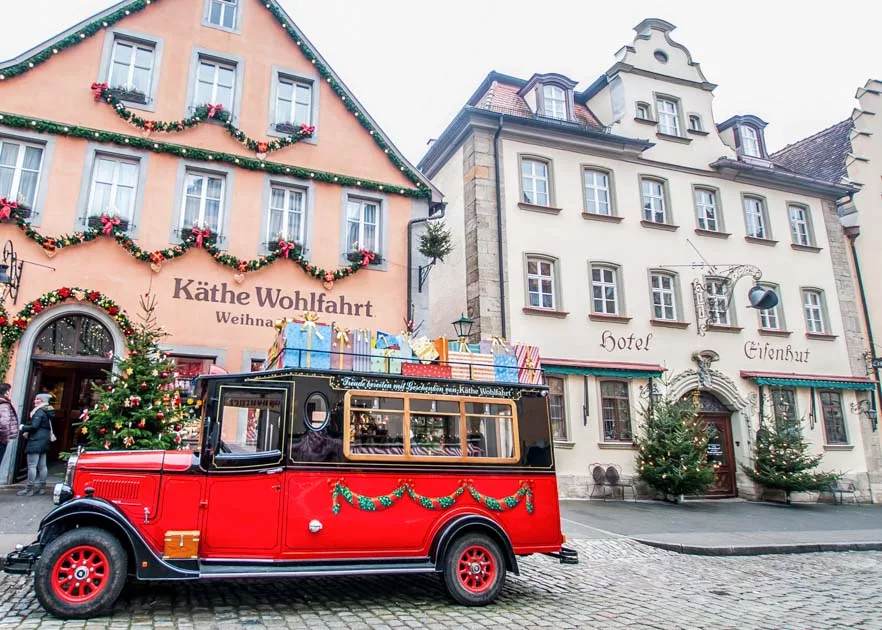
Here we inform you of our 20 Things to Know Before Visiting Germany, including crucial German etiquette standards and how to travel throughout Germany with grace and dignity.
Crucial German Etiquette
How to visit germany with grace.
There are only a handful of countries that are so different yet so similar to North America, then Germany. Walking around Germany, at first glance, looks like a regular day in Canada – a regular day in one of our oldest cities, mind you, but a regular day.
The people wear the same clothes, we eat the same foods (mostly), we even listen to the same music. This is about where the similarities end. Our customs and etiquette standards are almost polar opposites, to the point where many Canadians/Americans have complained about visiting this great country.
It is easy to criticize a society we don’t know much about or have certain preconceived notions that don’t hold up once confronted with the real thing.
1. It’s all about the Cash
Not every place of business takes plastic. Even fewer accept credit cards as payment. It is always helpful to have cash in hand, just in case you run into a place that is cash only. Oh, they won’t tell you in advance, they don’t even have signs at the entrance. You just need to know.
Travel Tip: always have a few 1euro coins and 50Euro cent coins. You never know when you will need them. I have one of each stashed in a little pocket in my wallet. When I need it, it’s there.
2. You have to pay to pee
Speaking of change, just about every toilet you will use is going to cost you. It is generally 50 cents Euro but can go all the way up to 1 euro per person. Children are allowed to enter with a parent free of charge but the change rooms for babies are oftentimes in the handicapped toilet and still require payment to access.
There are free options available, though I wouldn’t suggest using them outside of a restaurant. They can be “interesting”.
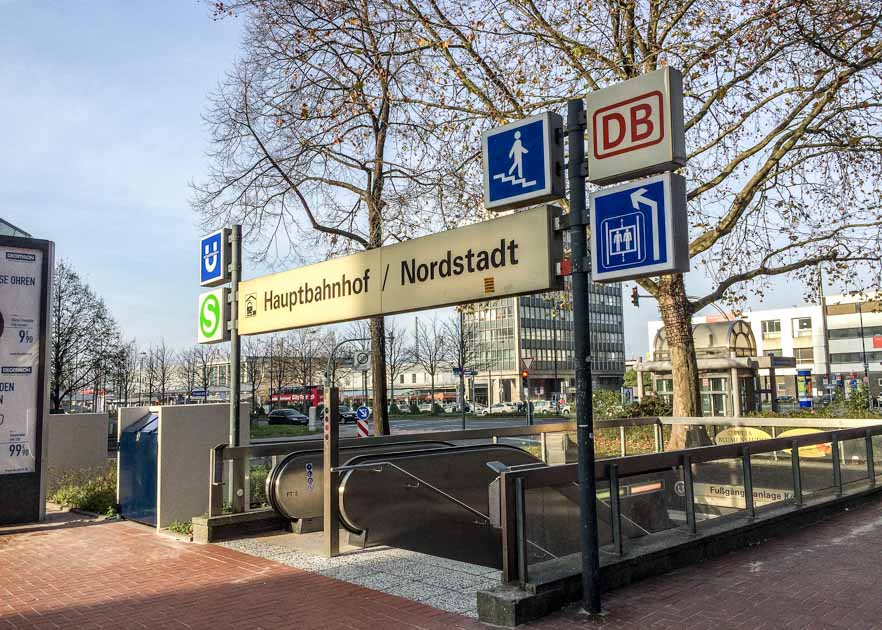
3. There is no Sunday shopping
Germany has very quiet peaceful Sundays. Many locals from NRW travel to the Netherlands on Sundays for shopping. Luckily, the border is packed with great little towns just waiting for shoppers from the German border region to arrive. This has the expected consequence of making Saturdays in Germany a very busy shopping day for the unprepared. Sundays in the Netherlands are a great opportunity for shopping and other activities. This is why I prefer doing all of my shopping online, or just before I pick up the kids from school. That sacred 2-3 pm time at the grocery store is heaven…and the baby is napping in the stroller. Win-Win.
4. If a German says they will be there, they will be there.
Every year around my son’s birthday, I keep thinking back to when he was turning 2 and we invited his whole class from preschool to his party. Every single 20 of them agreed to come, so I made snacks and cake for 20 kids plus a parent. 3 showed up. And 2 of them were related. In Germany, when 20 people RSVP that they will be there, expect 20 people. German punctuality is also something to mention. Never be late for a German; traffic is not an excuse.
5. Germans stare.
Not like, staring at you until you make awkward eye contact then pretending nothing happened. They will stare at you, even after you notice and express your discomfort in it. I can’t tell if they are judging me, trying to figure out what I am saying, or some strange “lost in the moment” face and I happen to be in their line of sight, but it’s weird. I would say you get over it, but you really don’t.
6. We keep our voices down in public.
Germans like rules and they like it when everyone follows the rules. Part of these rules is keeping your voice down; no one wants to hear your conversation, and we don’t want anyone else hearing our conversation. Even the (local) children are aware of this rule. After living here for 4 years, we still stand out like the foreigners that we are. I can’t tell you how many times I have to shh the kids (to no avail) on a 10-minute bus ride, let alone a 45-minute tram ride to downtown.
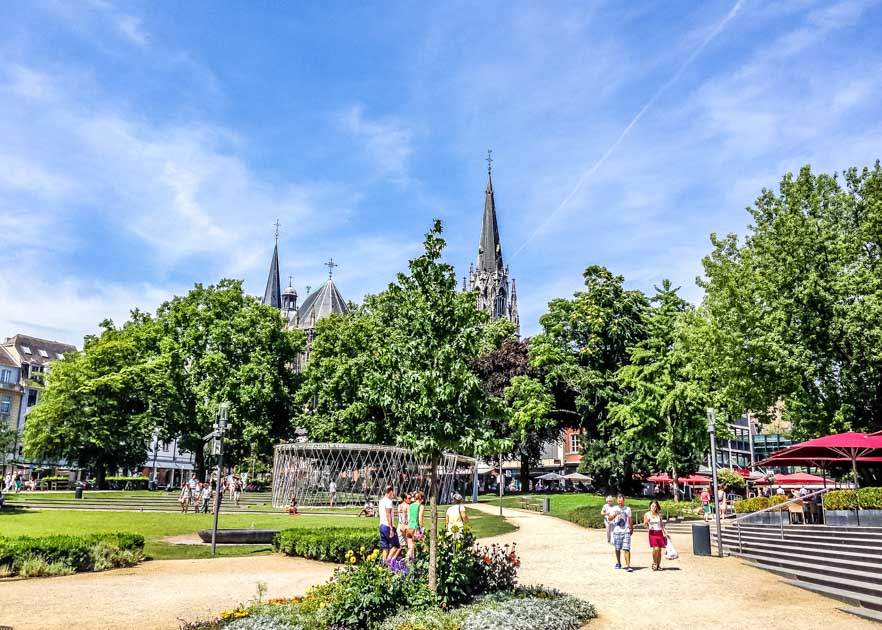
7. Nudity is a thing.
Between the spa, beach, and swimming pools, I have seen way too much nudity. The changing rooms at the pool are communal family rooms, male rooms, and female rooms. And no one is shy about changing in front of strangers. Same with the showers after the pool. Speaking of the spa; a Spanish friend went to the spa with a few of her German girlfriends. They didn’t tell her anything because it is normal for them. She was mortified when she walked into the sauna and saw a bunch of naked old men lounging around. It got worse after she laid down and one of them walked up to her to talk about the flip-flops on the chair.
Nudity in the sauna is mandatory; they believe towels or swimsuits will lock in too much heat and damage your pores and overheat your body, and dirty towels are in the sauna are gross. We learned this the hard way when we went to the Tropical Islands . Fun times.

8. Never ask for tap water in a restaurant
On our very first night here, our waiter was so kind as to inform us of this social etiquette. While you may drink tap water at home, not everyone does. It’s seen as a faux pas. And therefore, restaurants will sell you a bottle of water. Even a pitcher of water with ice will cost a few euros. And be sure to ask for Still water . Germans like to carbonate their water and their juice. I mean, I guess water is pretty boring and those flavor infusion drops have a lot of sugar in them but seriously, carbonated apple juice?
9. Recycle, Recycle, Recycle
Back in the day, everything was taken back to the recycling depot and we were given a few bucks to spend at the candy store. Germany still has that and the depot is conveniently located at the entrance of most (if not all) grocery stores. When purchasing eligible items, we pay a deposit. In turn, we are encouraged to return that item for a refund. Most items start at 25 cents Euro and go up from there.
Many Germans prefer to return their items on a daily basis since they generally go to the store that often. I tend to forget mine and show up once a week with two large bags full of them. Again, more stares and comments. I don’t care – today’s groceries are free. I’m a winner.
There are some things that I just won’t return for a deposit, like my fancy Christmas market mugs . Sure, I COULD take a fun photo with them and pretend as I took it home. It would save me a ton of money and even more cabinet space. But where is the fun in that?

10. Avoid the bike lane.
We have ingrained this fact into our son and he is now schooling the little one. On most sidewalks, there are two lanes, a colored lane, and a grey lane. The colored lane is for bikes and the grey is for pedestrians. Cyclists will ring their little bell until you move out of the way; if they have to go around you, you will hear about it and everyone will know what you have done, see rules 5 & 6.
We learned this on our House Hunting Trip a few years ago. We almost got taken out by a line of bikers and a nice English-speaking couple (see, they are everywhere) informed us. I guess we looked like we had no idea what just happened. My son asked a good question the other day about it; if there are no signs, how do people know that these are the rules? I told him that moms and dads teach their kids, who go on to teach their kids… yes mummy but what about moms and dads that don’t know about the rules, who tells them? The bike that nearly hit you will be sure to educate you on the matter.

11. Germans don’t jaywalk (without getting yelled at).
Not a word of a lie, it doesn’t happen in Germany. I have been at this one intersection in town, not a car in sight for miles, and dozens of people are just standing on the curb – waiting for the light to change. They even get upset that it’s taking so long, but no one will dare step out into the road. The one or two people that will cross, get an ear full from both sides of the road.
Why? Mostly, because it’s against the law and Germans always follow the rules. But also because that jaywalker has set a bad example for the children around and could have been hurt. I have the right to go about my day without witnessing an avoidable tragedy.
This has a lot to do with the driving laws in Germany too; Cars generally have the right of way in all cases except when a crosswalk is present ( but even like North America, many drivers view them as suggestions instead of laws), followed by bikes, dogs, then pedestrians. That’s right, dogs have socially more rights than a pedestrian.
When it comes time to cross on a small street, cars rarely slow down to let anyone pass before they make their turn. We learned this rule VERY QUICKLY.
While not totally related, this does come to mind every time I hear the term Jaywalking
12. Speaking English hasn’t made its way up the ranks just yet
The random lady walking her dog can speak to my kids, my neighbor is a SAHM and she can speak perfect English. So can the butcher, the cashier, and the nice lady that serves me at Subway even has an American accent. But my Realtor, Bank Teller, or Cell Phone retention department… not a single word.
I mean, yes, this is Germany and English isn’t even an official language so I can’t exactly EXPECT anyone to speak English. But when the guy at McDonald’s has a second language but the guy robbing me blind at Vodafone can’t string two sentences together, I start to question things.
The moral is, to try to learn a few words. Those that can’t speak English though, seem to have a bit of a chip on their shoulder about it and refuse to hear your broken German no matter how hard you try. I have had a few altercations with the staff because I am trying to say the few German words that I know and they just stare at me like I was from another planet. A nice customer from behind would interrupt, tell me what was going on, tell the staff what I am trying to say, then proceed to chew them out for being so ignorant about my accent.
13. They will scold your kids for you
True story, Germans are not afraid of Mamma bear. If your kid is out of line, they will correct the child and the child better listen respectfully. On the other hand, if you are busy chatting with the neighbors and your kid gets an earful from grandma across the park, just take it and move on. It’s nothing personal, and she probably has her best intentions at heart. This has a lot to do with the level of freedom Germans give their kids.

14. Kids roam free and respectfully at a very young age
The main reason I can think of why strangers discipline “school” children is a result of the amount of freedom that children are given in Germany. As young as 6 years old, kids are allowed to ride the train on their own, walk to school by themselves, go to the store, and run errands for mom and dad. Because they are allowed in public without supervision, the general public is in charge of that child’s well-being. It takes a village, after all. As a parent, Germans know that strangers will care for the child should they need help, and in return, parents help other children they see walking alone (or not alone, they don’t really care).
15. Tax is included in the price
Gone are the days of factoring in 14% sales tax on some items, but not on others. Or wondering what is the tax rate in this province/state. It is the law that all price tags show the final price of an item. Kids can now properly budget for their sweeties.

16. German grocery stores
What the cashiers lack in patience, they make up for in speed. Not only am I required to bring my own bag (plastic bags are for sale, but they aren’t cheap), and bag my own groceries, these people never let up. I could be drowning in a sea of vegetables and they will keep piling it on until there is no room left on the counter… then wait and stare as I frantically throw everything into my buggy so she can scan more items. And of course, they are done scanning well before I am done putting food away, so what do I do?
Do I pay now and finish packing after, or do I finish packing and pay after? Either way, everyone is staring and checking to see if I will break under the pressure.
It’s a sport, it has to be. Even the locals look flustered when it’s their turn. I am convinced this is why they all have small fridges; so they have to shop more often, meaning they have smaller loads in their carts, and can easily keep up with the cashier.
17. Expect to share and make new friends
Just like the cafeteria in high school, Biergartens and other public spaces have a lack of seating and this can only lead to one thing… sharing. The benches are long enough to accommodate many people and Germans may not ask permission to sit with you. If there is space, they will come. If you are taking up too much room, they will ask you to move over to make way for the rest of the group. No one is shy in Germany.
Now, this doesn’t mean you actually have to talk to them. As I said before, Germans aren’t really into small talk, so if you aren’t interesting to them, they will leave you alone. But if you say or do something to pique their interest, be prepared to make a new friend because they will start talking to you.
18. Drinking in public isn’t just for the Biergarten
It is legal to drink just about anywhere in a public space. This makes Christmas Markets and the downtown area a great place to be during festivals. You are allowed to drink in public, this doesn’t mean you can be drunk in public. Know your limit and don’t embarrass yourself.
The surrounding countries, however, don’t have the same love for beer.
We went to Rotterdam for a quick weekend break and saw a guy drinking his beer outside the train station. To me, it wasn’t a problem, I’ve been in Germany for 4 years, it’s normal. Nope. A nice man politely asked him if he was German, and the answer was yes. “Well, here in the Netherlands you are not allowed to drink in public. I suggest you put it away until you are back in the hotel”.
Oops. Another great story; we were walking around downtown and saw a Panel Van pull up at a stop sign. A bunch of construction workers jumped into the van, with a beer in hand, and they drove off. Drinking while in a car is legal.
Driving while drunk or drinking while driving the car is not legal, however. The legal limit is .05% (to compare, it is .08% in America). The fines are much higher, you can lose your license on the first offence and may also be required to see a psychologist for evaluation of your ability to drive in the future. With this much beer available, and so ingrained in their culture, it is no wonder that strict rules are made.
19. Autobahn is German for Highway
Germany is not the magic land of high speeds and NASCAR practice. There are speed signs on many parts of the highway. There just also happens to be many parts, safe parts, that are unlimited. This means the roads are straight and uneventful enough to make driving 200km/hr relatively safe. But whatever you do, do not go into the Left lane if you aren’t prepared to join them. Cars will come up at you so incredibly quickly that you won’t know what is going on. Rarely will they slow down, mostly because they don’t have to. It’s like a game of chicken except everyone knows that the slowpoke is at fault. Keep up or get out.

20. They aren’t rude, they are just German.
So this has come up a few times. Germans, in general, are very frank. They aren’t interested in pleasantries; they have things to do. Germans tend to be more direct and expressive which can come off as a little aggressive to non-Germans.
This can come off as rude in terms of customer service, the way they talk to you in the streets, even the way they scold you and your kids (adults are not immune to being told off). I promise you, they aren’t being rude. Some would even say our exaggerated concern with politeness is exhausting and time-consuming.
Wait until you actually meet a rude German; you WILL go home in tears.
Your Thoughts...
Please share your thoughts in the comments or reach out on social media...We would love to hear from you.
You May Also Like…
10 things I will and won’t miss about Germany
Moving to Germany The guide
A Day in the Life: Living in Germany
Toughest Things About Traveling in Europe with Kids

Ingeniousgermany.com
Travel Etiquette In Germany
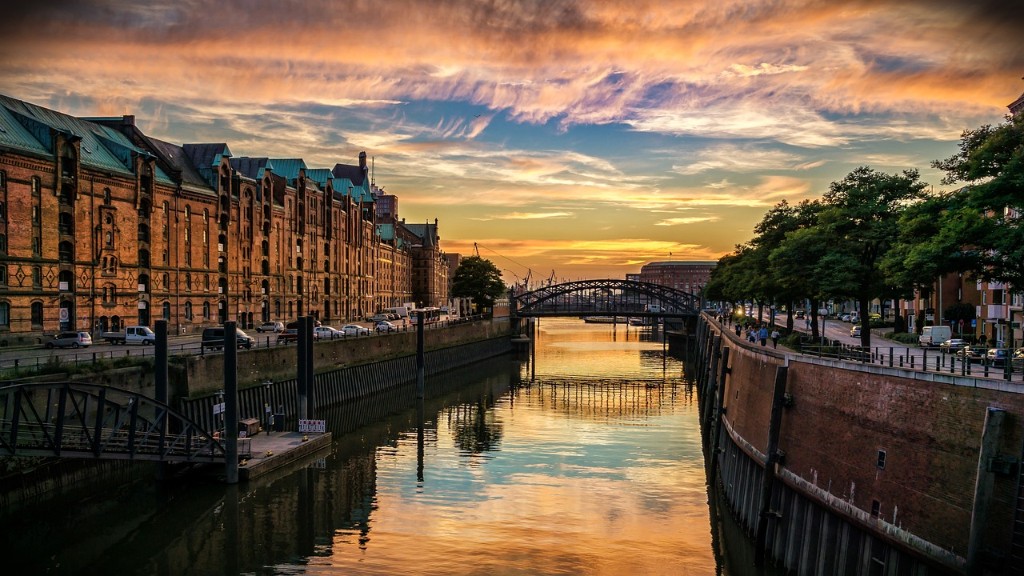
Introduction to Travel Etiquette in Germany
Germans have their own set of customs and etiquette when it comes to travelling in their country. Knowing what is considered proper and polite travel behaviour in Germany is important to ensure that your vacation goes as smoothly as possible. In this magazine article, we will discuss in detail what to expect in the form of travel etiquette when visiting Germany.
Basic Etiquette
When out in public, such as on the street, in stores or restaurants, German etiquette expects that you make a good impression. This means dressing appropriately, keeping your voice at an appropriate volume, and using German phrases for gröetings and thank-yous. In addition, politeness is highly valued when interacting with locals.
Food Etiquette
eating at a restaurant in Germany can be a very different experience from what you may be used to. In German culture, it is considered bad manners to leave your fork on the table with the tines facing upwards. Additionally, leaving food on your plate is also considered rude, because it implies that you have not been fed enough. It is also customary to wait to be seated at a restaurant instead of just picking a table at random. After being seated, you ‘ll usually receive a menu and be asked what you ‘d like to drink. The waiter might also ask if you have any food allergies. When ordering, it is polite to use the formal ‘Sie’ or the informal ‘Du’. Depending on the waiter or waitress, they ‘ll let you know which one to use. When you’re finished eating, be sure to ask for the bill. It is considered an insult if you just get up and leave without asking for it.
Transportation Etiquette
When taking public transportation in Germany, there are certain courtesies to follow. It is considered rude to take up an entire bench with your things, such as a backpack, as this prevents other people from sitting down. Additionally, when taking the stairs, it is expected that you step aside to let people who need to go faster past you. On the bus, the priority seats should be given to elderly passengers and those with disabilities. In Germany, it is generally expected that you buy your ticket before boarding the train or bus. If you’re caught without a ticket, you face a hefty fine. It’s also considered polite to give your seat to pregnant women, people with disabilities, or elderly passengers.
Hotel Etiquette
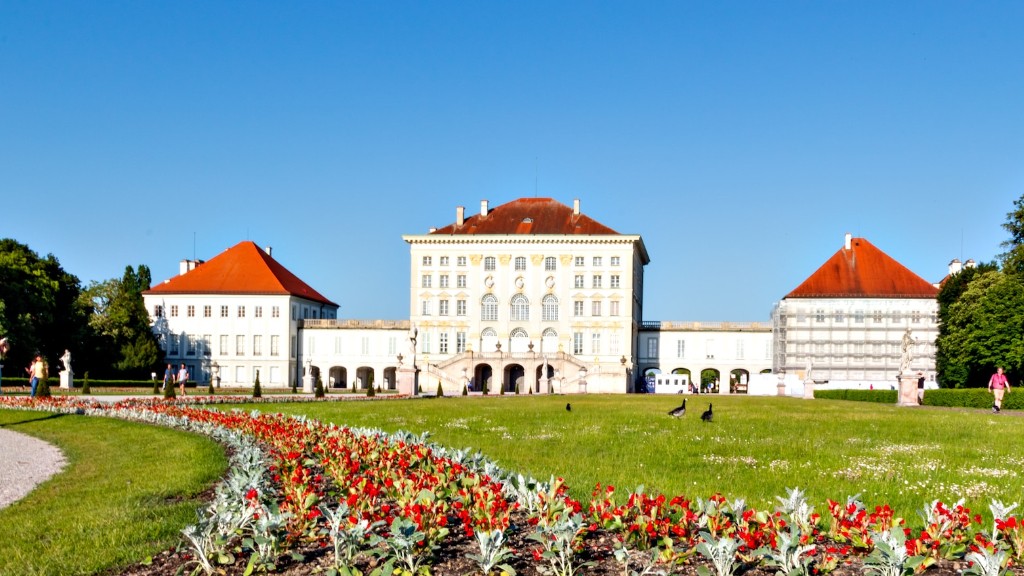
When staying in a hotel, it is important to adhere to certain customs. For example, when knocking on someone ‘s door, be sure to wait a few seconds after knocks before entering. Also, if there are housekeeping staff in the room, it is polite to leave or at least not intervene in their work. When sharing public spaces like swimming pools or gyms, be respectful of others. Don’t be loud, and follow any instructions that may be posted in those areas.
Tipping Etiquette
Tipping in Germany is not customary, although it is still appreciated by servers. Generally, a 5-10% tip is considered polite. When deciding how much to tip, it is important to take into account the quality of the service as well as the price.
Travelling to Germany can be an exciting cultural experience as long as you follow proper travel etiquette. Taking the time to understand what is considered polite and inappropriate behaviour can help make your trip smoother and more enjoyable.
In Germany, it is important to be aware of the cultural differences and try to conform to the norms of the society. Public displays of affection, such as hand-holding or hugging, should be avoided. It is also wise to show respect for authority.
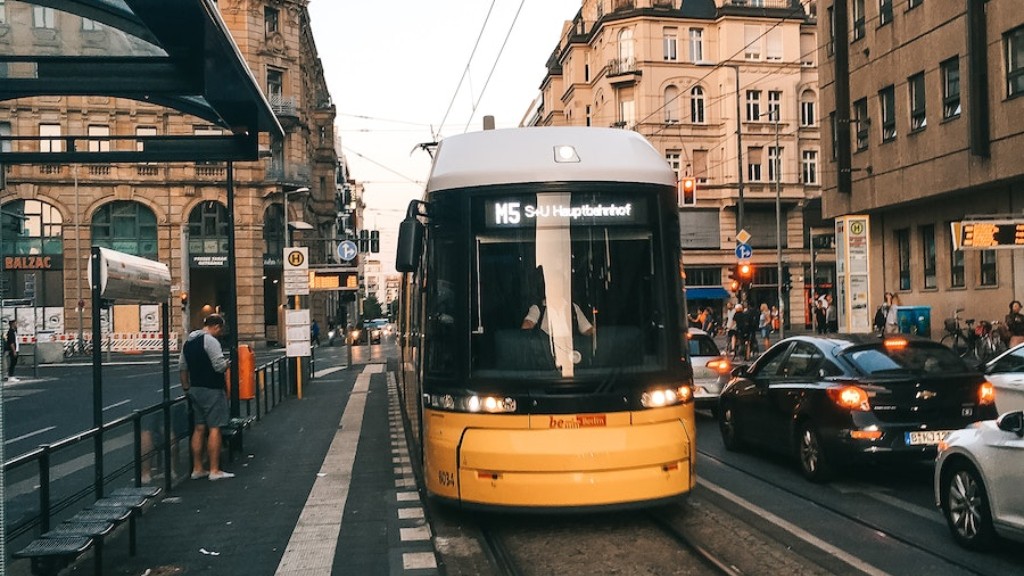
It is common courtesy to try and learn some basic German phrases whenever visiting a new country. This will demonstrate respect and an effort to communicate with the locals. Even if you only know a few words, locals will appreciate the attempt and be more willing to help you out.
Social Etiquette
Germans are generally more formal when it comes to social interactions. Therefore, it is important to show respect and follow general social rules of etiquette. Small talk is generally kept to a minimum and conversations tend to involve more meaningful topics.
Giving gifts is a common practice in Germany, and it is often viewed as a sign of politeness and appreciation. It is best to give gifts that are made in Germany, such as chocolates, wine, or clothing. Additionally, it is polite to open the gift immediately on receiving it.
Is Technology Allowed?
Using technology in public, like phones or tablets, may be seen as a sign of disrespect. Therefore, it is best to be aware of the situation and not use it to disturb other people. It is more polite to use headphones or other audio devices if you need to listen to something.

Smoking in public is not tolerated in Germany and may result in hefty fines. It is important to check for signs that indicate if smoking is allowed in a certain area before lighting up. Additionally, it is polite to move away from people when smoking.
Public Recreation
Public parks and other recreational areas such as beaches are generally well-maintained in Germany. It is important to be respectful of these spaces and clean up after yourself if you bring food or other items. In addition, swimming or playing in certain areas may be restricted depending on signs posted.

Jessica Stewart
Jessica T. Stewart is an experienced writer and researcher with a passion for exploring German culture and history. Through her writing, Jessica hopes to bridge the gap between German and English-speaking cultures and foster greater understanding of Germany's rich history.
Leave a Comment Cancel reply
- See all results

Sustainable Munich: Discovering the Bavarian Capital with Fresh Eyes!

Making the Next Camping Trip Sustainable

Track by track through the Black Forest

Rules of Etiquette for a Pleasant Stay in Germany
Germans can be funny. By that, we mean quirky. At least sometimes. Here we’ve listed a few situations that you might handle differently than most Germans would. But hey, you never stop learning… Here’s what you need to know about German etiquette.
In restaurants, Germans tip around 10% of the total bill. In cafes or in cabs, they’ll just round up to the next Euro or two. Customers who give more stand out as tourists, but are sure to get more love. So now you have to make up your own mind: Cash or love?

The older generation of Germans still prefer to be addressed formally by their surnames; as “Herr“ or “Frau“ . Wie geht es Ihnen heute, Frau Müller? How are you today, Mrs. Mueller? Under no circumstances should you, at a first meeting, address an older person simply by their first name.
But it can be even more complicated in Austria. Although the use of aristocratic titles (like Count or Duke) has been banned since the foundation of the republic in 1919, Austrians love to use academic titles in front of their names. Don’t be surprised to hear “ Frau Doktor“ for someone with a doctorate, or perhaps “Frau Ingenieurin“ for a certified engineer, or even “ Herr Magister“ , for someone with a masters degree.
Everywhere else in the world, it seems to be standard practice to give the birthday boy or girl a present, a cake or some kind of treat on their special day. But if you work in a German company, one thing is certain: Don’t expect any flowers. On your birthday, it’s you who will have to dip into your pockets, and invite your colleagues to coffee and cake or a round of drinks.

Punctuality
German punctuality is a global stereotype, right? Well this time, it’s pretty much correct. In Germany, most people are punctual; rather too early than too late . Within reason, of course. Don’t turn up 30 minutes early to dinner. Most Germans tend to be fairly straight-talking too. Small talk is not a German virtue, so get to the point.
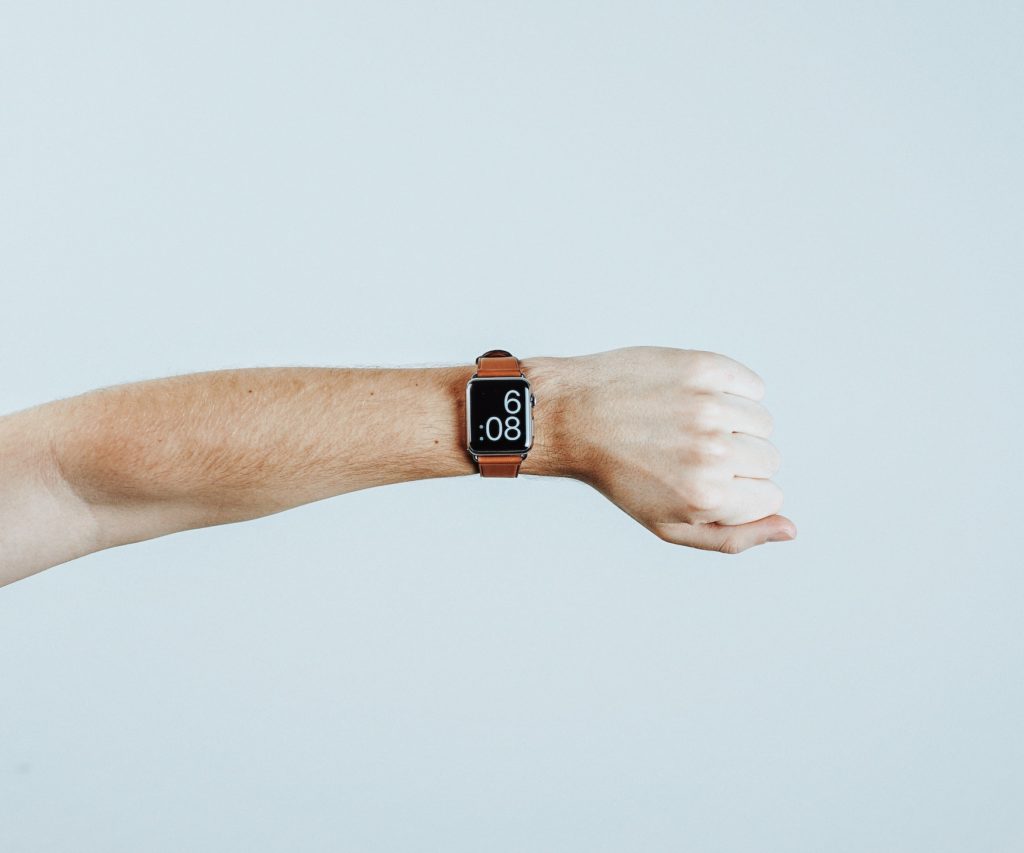
In Germany, smoking is also not allowed in restaurants or bars, but is ok on the street . At train stations and airports there are designated smoking areas . Smoking outside of these areas will get you at best some very withering looks, and at worst, will cost you a fine. But one thing is a no-go for all smokers: Never light a cigarette on a candle. A common superstition says doing so kills a sailor.

Public toilets aren’t usually free in Germany. You should have at least 50 cents in your pocket, just in case. At rest stations on the Autobahn, in shopping malls or in train stations, a trip to spend a penny might cost 70 cents or a Euro . What’s a little unusual for visitors is that this cost is sometimes “refunded“ in the form of a shopping voucher , that can be put towards the cost of a coffee or something similar. Ah, and do NOT expect contactless payment. In a lot of Germany, cash is still very much king.
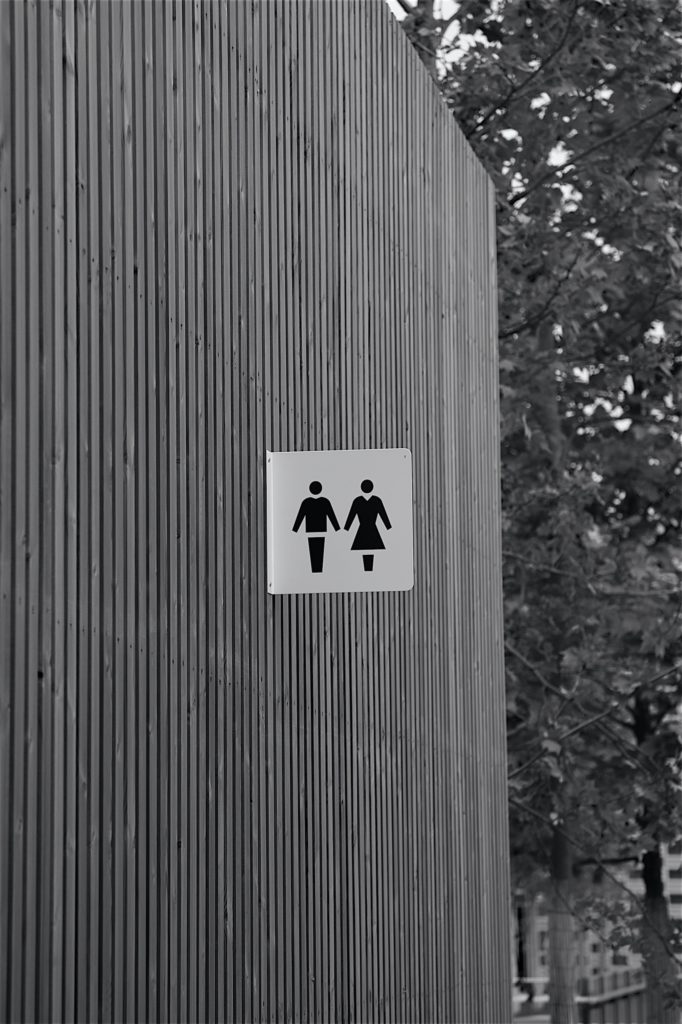
Men, if you’re lucky enough to be invited to attend a German wedding, it’s important to keep a close eye on the groom. Male guests at a wedding tend to take their fashion cues from the groom; only when the host loosens up his tie or takes of his jacket, may his guests do the same. But exceptions of course confirm the rule.

If you visit a local German bar, try ordering a “Herrengedeck“ . You’ll be served a beer and a schnapps – normally a pilsner and a “Korn“, which is a clear, mild grain spirit. Although the consumption of alcohol per capita has been decreasing year on year, it’s fair to say that most Germans like a drink .

And the laws allowing for that might surprise some visitors. Beer and wine, for example, can be consumed in a bar or cafe by customers aged 16 and above , rather than 18 or 21 years old, as is standard in many other countries.
But no matter where you are, even in a brewery, if you’d prefer something non-alcoholic, just order it. No-one will mind. For a typically German soft-drink, try ordering a “Spezi“ or a “Mezzo Mix“ . It’s a blend of cola and orange soda, and tastes better than it sounds!
The disposal of rubbish in Germany should be a subject of academic study. First things first: It’s important to separate waste . Germans take a lot of pride in that. One bin for paper, one bin for recyclables, one bin for organic waste (like food scraps or vegetable peelings), one bin for the rest.
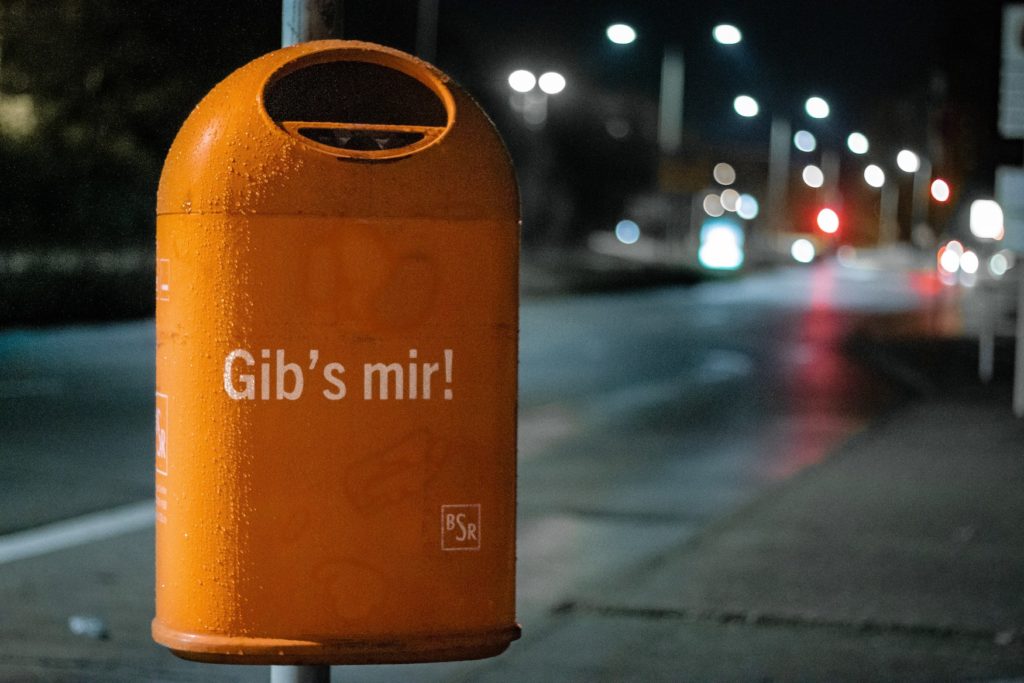
Then the Germans dispose of their old batteries separately. And their old light bulbs too. And it’s crucial to distinguish between different drinks bottles. There are “Mehrweg“ bottles (which are bottles that are cleaned and reused) and there are “Einweg“ bottles (which are mostly plastic bottles that are only used once and can be destroyed or recycled). Normally, there is a deposit on both. Sometimes it’s eight cents, sometimes 15 and sometimes 25. But not always. Most supermarkets have an automatic machine where you can bring your returnable bottles, and collect a voucher for your deposit.

Christmas for All: Käthe Wohlfahrt in Rothenburg ob der Tauber
The rest of your glass jars and bottles can be brought to the recycling centre, where you may dipose of them according to their colour: clear, brown or green. And what if you have a blue glass bottle? Put some flowers in it and turn it into a vase.
Clinking glasses and saying a short toast before drinking is common in Germany. But there is something very important to remember… ALWAYS, and we mean ALWAYS, look the person you are clinking glasses with directly in the eye . According to German superstition, a failure to adhere to this rule will be punished with seven years of bad sex! And you never cross your arms when talking with someone. There’s no punishment for that, but it’s considered poor manners.

Knife and Fork
If you’re eating in a restaurant or at a dinner party and need to leave the table briefly or just need a little break, you can show that you haven’t yet finished eating by leaving your knife and fork crossed on your plate . Lay the tines of the fork across the blade of the knife. If you have finished, however, and want to have your plate cleared or you want to indicate that you don’t want to eat any more, then place your knife parallel to your fork on the plate, at the five o’clock position. That way the waiter or your host will know you’re finished.

Unlike in many other countries, there is no such thing as free water in German restaurants. If you order water, you’ll normally get bottled mineral water. If you want tap water, you’ll have to specifically ask for it, and there will likely be a service charge on it. As tap water is far more environmentally friendly than the bottled kind, some restaurants are changing this behavior though. But don’t expect free ice. Ever.

If you are invited to someone’s home in Germany, there are only two small things you need to keep in mind. Firstly, be on time and secondly, bring a small gift for your host. A bottle of wine, some flowers or a small box of chocolates is always fine. The more personal the better.

Table manners are generally important in Germany. They show respect for your host and for those dining with you. Sit up straight and keep your elbows off the table. Be sure to use both your knife and fork while eating, not just your fork. When eating soup with a spoon, bring your spoon up to your mouth. Don’t slouch over your plate. It’s considered sloppy behavior.

In Germany, when eating, most people like to talk about the food they’re enjoying, so drop in a positive comment . If you like what you’ve been served, it’s perfectly ok to ask for another portion. Indeed, it’ll be seen as a compliment. If you’ve brought wine or dessert, and there’s some left after the meal, it stays with your host. Don’t be tempted to take it with you. As we say in Germany, a gift is a gift.

- Value Package
- Blocked Account
- Health Insurance
- Bank Account
- Study Finder
- Study Eligibility Checker
- Accommodation
- Learn German
What We Offer
- Living in Germany
- Studying in Germany
- Working in Germany
About Germany
- German Cities
- Tourism in Germany
- German Culture
- Visa for Germany
- Costs of Living in Germany
- Finance in Germany
- Health Insurance in Germany
- Driving in Germany
- Renting in Germany
- German Universities
- Free Studies in Germany
- German Education System
- Germany vs. other Study Destination
- German Degrees
- Application Process to Study in Germany
- Financing your Studies in Germany
- Best Universities in Germany
- German Business Culture
- Best Cities in Germany for Expats
- After your Bachelor's in Germany
- After your Master's in Germany
- About Expatrio
- Partner log in
- Partner Log-in
German Etiquette - Do's and Don'ts

It is important to learn about German culture if you are planning to move to Germany. This article will show you the do's and don'ts when it comes to German etiquette.
Cultural differences can sometimes cause misunderstanding. What may be considered polite in your home country may be seen as bad if you do the same in Germany. That’s why it is essential to learn about German culture if you are planning to move to Germany. Read on to learn more about the do's and don'ts of German etiquette.
German Etiquette: Do's
Do #1. Shake hands
Germans love shaking hands. When joining a group, it is common to shake hands with each person for greeting. Similarly, German people also shake hands when they leave. This practice is not limited to the business environment but also happens on social occasions.
If you meet close friends or family, you can give hugs instead. Do not give hugs at work, though. A handshake is more appropriate in business.
Do #2. Say hello and bye
When you enter a shop or a waiting room at your doctor's office, greet the people there. You do not need to initiate a conversation afterward. Just move on with your shopping, or sit down quietly.
You can say Auf Wiedersehen or Tschüss when you leave, which means bye.
Do #3. Be on time
After moving to Germany , you will probably notice that German people are very punctual. When a German person wants to meet you at 3 p.m., they really mean 3 p.m., not 3:15 pm or 3:30 pm.
It may be acceptable if you are a few minutes late. But if you are going to be later than that, make sure to call the other person and let them know beforehand. It is rude to be late without a valid reason.
This rule also applies to business meetings and social situations. If you have other important appointments, such as a flat visit when looking for a rental flat , it is even better to arrive a few minutes earlier.
Do #4. Make an appointment
Germans love appointments. This does not only apply to business meetings. You should also make a Termin when visiting a doctor, a hairdresser, or any governmental body. If you want to hang out with your friends, it is better to call or text them shortly before seeing them. This is to make sure that they have time for you.
Do #5. Separate your rubbish
Germany is a very environmentally friendly country . People separate their rubbish at home (e.g., organic waste, paper, glass, and plastics). It may be a bit confusing for foreigners at the beginning. Ask your roommates or neighbors how it works if you are not sure. Never throw your rubbish randomly into the bins. This practice is considered very bad, and you may even receive complaints from other people if they see you doing so.
Do #6. Make eye contact with clinking glasses
In Germany, it is common to have alcohol with lunch or dinner. When you are in a group, you should wait until everybody has their drink and only start drinking after clinking glasses. When clinking glasses, it is essential to look into each other's eyes. Believe it or not, not doing so will result in seven years of bad sex . You probably won't want to risk that.
Do #7. Bring your own cake
If it’s your birthday, don't expect your friends to throw a party for you. Should you want a party, you will have to host it yourself. You are supposed to provide food and drinks for your guests. And they will give you birthday gifts in return.
It is common for the birthday person to bring a cake for their colleagues at work. Sometimes, the colleagues may have a small gift for the birthday person. But it is not always the case.
Do #8. Bring a gift when you visit someone
You should learn about gift-giving in Germany when living here. For example, if you visit someone, it is polite to bring a small gift. If you are not sure what to get, just buy something general like a bottle of wine, chocolate, or flowers. Those will go well in most situations. Please note that gifts are usually opened when received.
If you are invited to a house party or a dinner at home, you can ask the host if he needs something. For example, he may want you to bring some drinks, snacks, or dessert.
German Etiquette: Don’ts
Don’t #1. Cross the street when the traffic light is red
German people are very disciplined. Even when no car is coming, they do not cross the road on the red pedestrian light. This “don’t” is fundamental when children are around. You should be a good role model for the children. Breaking the rule and crossing the street on the red light is very frowned upon.
Don’t #2. Make loud noise in public
Compared to many other countries, German people are very quiet. When you are on public transportation or in the doctors' waiting rooms, you are supposed to stay silent. Having a loud conversation, talking loud on the phone, or listening to loud music are considered very impolite as you will disturb other people.
Don’t #3. Open closed doors without knocking
German people love to have their privacy. If you see a closed door, it doesn’t mean that the person inside does not want you to come in. However, it is very impolite if you just open the door. You should always knock first before entering the room. This rule applies to office spaces and also at home.
Don’t #4. Call people late in the evening
Unless you are very close friends, you should not call people late in the evening. If you will be working in Germany, it is essential to learn the German business culture . You should not call your colleagues after office hours or on the weekend. German people like to keep their private and business lives separate.
Don’t #5. Make jokes about nazism
Foreigners could associate nazism with Germany. And some people may bring up this topic during a conversation with other German people. However, you should know that this theme should only be discussed seriously. Until today, World War II can still be a very sensitive topic to many German people. Never make jokes about nazism or the war.
Don’t #6. Stare at naked people
In Germany, people may be more open to public nudity than in your home country. You are allowed not to wear your swimming suits in certain saunas. You may also see naked people in restricted lake areas. And you could see people walking around naked in the changing and showering area when joining a gym. German culture does not always associate nudity with sex. And you should not stare at naked people, as that is considered rude.
Don’t #7. Expect everyone to speak English with you
German is the official language in Germany. Even though many people in Germany can speak English, not everyone will necessarily speak English with you. You should try your best to speak some German in your everyday life. If you really cannot speak the language, ask politely in German if you can have the conversation in English.
Learning German is essential, especially if you want to stay in Germany for the long term. You could take intensive German classes or use some apps to learn German to adapt faster in the country.
Don’t #8. Wish someone a happy birthday before their birthday
In Germany, it is considered bad luck if you wish someone a happy birthday before their actual birthday. It implies that the person may not make it until their birthday. Make sure you say happy birthday only on the day of or after their actual birthday.
When living in Germany, you should be thoughtful about the German culture and the habits of people living in the country. That is why it is essential to learn how things work in Germany before moving . We hope that this article helps you to have an understanding of basic German etiquette. Following these rules will help you adapt faster to your new life in Germany.
About the author: Sindy came from Hong Kong and moved to Germany in 2010. Her blog My Life In Germany provides helpful info to expats about studying, working, and living in Germany.
Excellent Careers In Germany for People Who Know Foreign Languages | expatrio.com
The Highest-paying Degrees in Germany | expatrio.com
Reasons Why You Should Study Your MBA in Germany | expatrio.com
This might also be of interest to you

10 Good Reasons to Study an Engineering Master's in Germany in 2022
Germany is a good country to study in if you want to be successful. An engineering degree from Germany is regarded as highly pretentious, so this is...

The 10 Best Movie Theaters and Film Festivals in Germany
Germany is a country with a rich cinematic history. From the expressionist films of the 1920s to the New German Cinema of the 1970s, German...
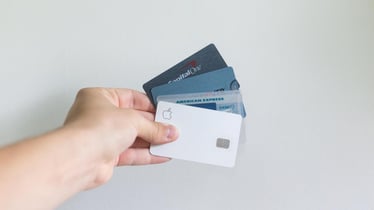
Highly Recommended Credit Cards in Germany
Germany is an excellent place to live and work, with a high standard of living and many job possibilities. If you are a student or working...

Summer Music Festivals- 2022
Summertime in Germany means one thing – music festivals! There's something for everyone, from small, intimate gatherings to massive open-air events....

Tips on How to Keep Healthy During Quarantine
As Germany faces its second lockdown, you might be wondering how to keep healthy during the winter time at home. Although most of the world is...

5 Ways To Get Your Own Pet In Germany
If you're planning to move over to lovely Deutschland, chances are you’re searching for reliable ways to bring home a pet in Germany to keep you...

How to Choose a German University That’s Right for You
Find out how to compare various higher education institutions and make the right choice. There are more than 400 universities in Germany, and all of...

13 Reasons Why Studying Medicine in Germany is a Great Idea
Find out the advantages of pursuing your MBBS in Germany. If you are considering studying medicine in Germany, read this article! This blog post will...
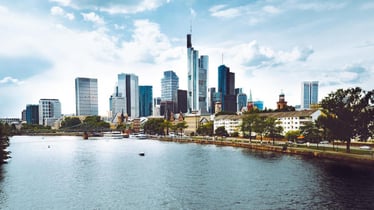
Reasons Why You Should Study Your MBA in Germany
Thinking about enrolling in an MBA? We listed the top 8 benefits that make studying for your MBA degree in Germany worth it. When an average person...
How to Get a Loan in Germany [Requirements and Tips]
Expatrio takes part in the Sino-German Annual Meeting for Business Cooperation and Technology Exchange

Top German Etiquette and Manners

What’s the first thing that comes to your mind when you think about German people?
You’ve probably heard things like “German people are always on time,” and “They’re direct and have good manners.” Well, I would say this is almost always the case. But now the question is: What are these so-called good manners and what does German etiquette look like?
Almost every nation defines this a little bit different. Let’s just take some Asian countries, such as China, for example. While in most European countries, you can’t burp, smack, or slurp at the table, in most Asian cultures this is called good etiquette. This means that the food was tasty and that you’re satisfied. But when doing this at the table of a German family, this would be considered bad table etiquette; they might think your parents didn’t show you how to use a spoon at home.
But on the other hand, in Asia, you shouldn’t touch your nose at the table. Can you see anything bad about touching or scratching your nose at the table if you need to? At least in Germany, this wouldn’t be a problem.
What I want to show you is this: Other countries = Other morals and manners.
In this article, we want to show you the Do’s and Don’ts in Germany. Be aware that these German etiquette tips might apply to other German-speaking countries, such as Switzerland and Austria (but not necessarily, as their cultures differ from ours in Germany).

Table of Contents
- Do’s and Don’ts for Dining
- German Social Etiquette in Public Places
- German Greeting Etiquette: Do’s and Don’ts for Greetings
- German Guest Etiquette: Manners When Visiting Another House
- German Travel Etiquette: Do’s and Don’ts in Public Transports
- German Business Culture and Etiquette: How to Behave in Business
- How to be a Good Part of German Society
- How GermanPod101 Can Help You Learn More German
1. Do’s and Don’ts for Dining
As mentioned above, when it comes to etiquette at the table in general, it becomes really difficult to handle as every culture is different. Even within Europe, you’ll find differences. For example, while French people like to extend their dinners until very late, Germans just try to finish as fast as possible. I guess we just try to be more efficient. Here are some German etiquette dining do’s and don’ts.

1- Don’t: Eat with an open mouth or make unnatural noises.

While in other cultures, burping or smacking might be a signal that the food was good and enough, in Germany you try to eat as quietly as possible.
That doesn’t mean you’re not allowed to talk; quite the reverse, you should talk as much as you can to boost your German. But don’t open your mouth while eating, and don’t make any slurping sounds when eating soup.
We prepared a free lesson about manners in Germany . Take a look before reading the rest of this guide to German etiquette to make the most of it!
Vocabulary List
- Schmatzen — “to smack”
- Bitte hör auf zu schmatzen . — “Please stop smacking.”
- Mit vollem Mund spricht man nicht . — “You don’t speak with a full mouth.”
2- Do: Say Prost and make eye contact.
Beer and alcohol have a long German tradition . You’re probably familiar with the Oktoberfest. But even outside of this famous festival, beer is highly accepted in Germany. When you’re out with your family and friends, alcohol will be a subject. We like to enjoy a nice Weizen or a cold Lager with our meal.
There can be many reasons you’re with your family or friends in a restaurant. Usually, it’s one’s birthday, you’re joining your weekly Stammtisch , celebrating the graduation of a family member or you just went with your family for a Sonntagsessen . Whatever it is, you’re there probably for a reason, and you’ll want to cheer (or toast) for the occasion. Maybe the party organizer even makes a short speech if he’s not too shy.
At a certain time during dinner, usually before the food arrives at the table, you’ll raise your glasses to cheer the occasion you’ve gathered together for. Everybody will raise their glasses and say Prost . Then you’re supposed to answer with Prost , and you’ll try to clink glasses with everybody at the table.
Important when clinking your cup with someone: MAKE EYE CONTACT .
It may sound a bit stupid, but Germans say that if you don’t look each other in the eyes when clinking glasses, you’ll have seven years of bad luck in the bedroom.
3- Don’t start eating until everybody has their food.
I know from my own experience that some cultures in South America have the attitude that when you’re making a barbecue, or even when coming together with friends and family on the weekends, there are a lot of people around you and it’s quite normal to have lunch or dinner with ten or more people.
This sometimes makes it difficult to get everybody at the table at the same time, and everybody starts eating whenever he or she wants. But be assured that this isn’t the case in Germany. When you come together, you serve everybody first, and then you start eating.
4- Do: Say Guten Appetit.
There is one similarity between French and German culture: We enjoy telling our guests that they can enjoy their meal. And we don’t just say it for fun, we really mean it. We hope that the food we prepared is tasty and will satisfy everybody.
But this isn’t just to say that you’re supposed to enjoy the food. This is also a good indicator for you, as a foreigner, to start eating. Earlier, we mentioned that you shouldn’t start until everybody has their food. When the cook, or the person who prepared your meal, says Guten Appetit , this also means that we’re ready and everybody can start eating.
There’s even a phrase that we teach our children when they’re fairly small: Pip pip pip – Guten Appetit – “Enjoy your meal!”
2. German Social Etiquette in Public Places

When going out in public, you should at least maintain a certain level of politeness. But no worries. With common sense, you’ll survive this.
1- Don’t: Cross the street on the red traffic light.
In many countries the traffic lights are only for orientation and the people mostly ignore them. Not in Germany. Remember that we’re talking about a country which is known for the phrase:
- Ordnung muss sein “There must be order”
Germans value their laws, so being in Germany you should do it as well. Crossing the street on a red light in Germany might draw the attention of other pedestrians and it might end with getting a ticket which will cost you around 5€. For ignoring the red light while being on the bicycle, the fine can grow even up to 60 – 180€ and you can even earn some Punkte in Flensburg , which might cause losing your drivers licence for a few month.
Watch out especially when children are around. Germans are very sensitive when it comes to their children. Be a good role model and show them how to behave properly in the road traffic.
2- Don’t: Squeeze in lines facing people.
You know that feeling when you’re arriving a bit late to a movie in the cinema, or you come to the theatre and your seat is right in the middle of a row?
Well, the first hint we can give you is this: If there are other free and empty seats, it might be better to just choose one of those seats, though it’s also fine to make your way to your booked place.
Just remember to be friendly at all times. While passing other visitors, you can say:
- Entschuldigung “Excuse me.”
But always remember to pass the people in the same row face to face. If you don’t do so, you might offend them. They probably won’t say something to you, but why offend someone when you can avoid it?
3. German Greeting Etiquette: Do’s and Don’ts for Greetings

German etiquette and customs for greetings can be really different from what you may be used to. You may ask yourself questions, such as:
“Should I greet everybody?” “Should I give a hug or a kiss on the cheek?” “Should I shake their hand, or maybe just say hello?”
To give you more insight on the topic of German cultural etiquette for greeting people, we’ve published a video about greetings on our site.
1- Do: Say “Hello” to everybody.
When entering a party or a family meeting, you’ll usually be introduced by the owner or the host to everyone who’s already there. But if this isn’t the case, you should introduce yourself to everybody. You don’t need to tell your life story, but a nice Hallo, ich bin [add your name] is perfect. Make sure to shake their hand.
This also applies when entering a restaurant, shop, or most other places.You don’t need to greet everybody, but for example, when entering a small shop, at least say a friendly Hallo or Guten Tag , and Tschüss or Auf Wiedersehen when leaving again. If you’re more extroverted even a short small talk is fine. That’s more than enough. This especially applies when you’re entering a waiting room at the doctor’s office.
2- Don’t make the polnischer Abgang .
British people call it the “French leave”, French people call it the “ filer à l’anglaise ” or “to leave English style” and Germans use their eastern neighbours to name this specific style of leaving.
Polnischer Abgang means literally “Polish leave”, and it describes when you’re sneaking away from a party or some other place without saying goodbye to someone (or even everybody). This is considered rude, and you should avoid doing so. Don’t be shy, and let at least the owner know that you’re leaving.
3- Do: Use the correct form of the day.
According to proper German etiquette, there are different ways to greet people depending on the time of the day. We won’t give you an extensive guide for this, but be sure to remember this:
- Guten Morgen — “Good morning” (used until noon)
- Guten Tag — “Good day” (used until it’s dark)
- Guten Abend — “Good evening” (used when it’s dark or you’re out for dinner)
- Hallo — “Hello” (almost always used in an informal situation)
- Tschüss — “Bye” (almost always used in an informal situation)
- Auf Wiedersehen — “Goodbye”
For some better insight, we have a lesson in our free course about greetings .
4. German Guest Etiquette: Manners When Visiting Another House
If your lucky, on your trip to Germany, a stranger or a friend may invite you to his home. It might be for a party or just to hang out. But in either case, there are some unwritten German etiquette rules that you should follow.
1- Do: Use the formal Sie first.
In English, addressing a person is fairly easy as you just have one word for formal and informal situations: “You.”
In German, there are some differences that you should know, and even some rules. We’ll give you a quick overview.
- The formal way to talk to someone is by using Sie .
- The informal way is to use Du .
- The actions are called siezen and duzen .
When to use which form can be confusing, so here are some general rules:
- Rule: If you’re not sure which one to use, be formal.
- Rule: When the person is older than you, use formal.
- Rule: At work, use the formal way, until the other person offers you the informal way.
- Rule: If you know the other person will use the informal way, also be informal.
- Rule: Offer du if you’re older.
If you want to extend your knowledge about formalities and etiquette in Germany , take a look at our free course.
If you want to address someone in a formal manner:
- Herr [last name] — “Mr. [last name]”
- Frau [last name] — “Mrs. [last name]”
If you want to offer the du , say:
- Du kannst ‘du’ sagen . — “You can say du .”
- Ich glaube, wir können uns duzen . — “I think we can use the informal you.”
2- Do: Make a small gift.
This is an easy one. When you come to the home of a friend or family member, just bring something small. You don’t need to invest too much time into thinking about the gift. This can be something quick and small, such as:
- A bottle of wine
3- Don’t choose the wrong topics.

Have you heard that there are some parts of German history that aren’t as bright as those of other nations? I’m talking about the Second World War.
Actually this is a very important topic to talk about, especially since Germany has shifted to the right in the past few years, giving opportunities for politicians who are denying German war crimes to grow in popularity. So if you’re interested in the topic, ask people about the war and discuss with them, but be aware of some things:
- This is still a very sensitive topic for some people. Don’t be too harsh, many people have emotional connections to this time. Try to remember that there are still many people who fought in the war, lost their families due to the war and suffered from the consequences.
- Don’t make stupid jokes about this time. Sure, they might be funny to you, but remember that there is a possibility that someone in the room lost their family members in the war.
- Evaluate what people have told you. Germany has a growing problem with fake news and with people denying or marginalizing the crimes of the Nazi Germany. It’s always better to double-check the information.
Other than this, you should avoid the topics that generally make people uncomfortable and make things awkward, like politics, money, or religion, at least when talking to people you don’t know very well.
In general, be careful with potentially sensitive topics.
5. German Travel Etiquette: Do’s and Don’ts in Public Transports

1- Don’t: Listen to loud music.
I know you might have a long ride on the subway from home to work, or the other way around. It’s also just fair that you listen to your music and enjoy the time that you’re there.
But it’s not necessary to share the music that you like with the rest of the train. They might like some other type of music. So just plug in your headphones and listen to the music without disturbing anyone.
Listening to your music loudly is even considered offensive to some people, and at some point someone will surely tell you to “Shut the f*** up.”
2- Do: Offer your seat.
When there are free seats and you have a long trip to your destination, feel free to sit down. But during the ride, people will enter and leave the train, and the closer you come to the center, the fuller the wagon gets.
Public transport is the easiest way in German cities to get around, so everybody uses it. Even pregnant women, older ladies and gentlemen, and disabled people.
Be polite and offer your seat to them. They’ll thank you, the people around you will see it, and it gives you a good feeling. We say in Germany:
- Jeden Tag eine gute Tat . “Every day a good act.”
To offer your seat, you can say:
- Möchten Sie sich vielleicht setzen, hier bitte . “Do you want to sit down here, please.”
Point to your seat while saying this.
3- Let other people leave the train first.
As in most other countries, the metro and buses are fairly full, and even more so during the rush hour. Everybody is stressed and just wants to get home to their loved ones.
Before entering the subway, make space in front of the doors so that other people can get out first. This ensures that they don’t need to squeeze past. If you’re standing in front of the door, I’m sure that someone will be impolite to you. And to be fair, with good reason.
6. German Business Culture and Etiquette: How to Behave in Business

In this section, you’ll learn about some German professional etiquette rules. When it comes to German etiquette, business depends on knowing your way around it! Here are some German etiquette do’s and don’ts for doing business in Germany.
1- Do: Bring your own cake.
This mainly applies to business culture as opposed to private birthday parties. But when it’s your birthday and you’re working in an office, then colleagues expect you to bring something to the office to share with everybody.
From experience, this doesn’t have to be a cake; a small breakfast or something for lunch is good as well. The idea of giving something to them is more important than what you give.
2- Don’t: Be late.
Don’t be late, but neither be early. It can be quite difficult for some people to be exactly on time.
Trains, buses, or anything else regarding public transport, won’t wait for your arrival. They’ll leave without you. This can also be the case with friends. You agreed on a certain hour to meet, so you’re expected to be there at that time.
When it comes to punctuality, Germans don’t mess around. Of course, no one will kill you because you’re five minutes late. But it’s better to be five minutes early, than to be five minutes late.
If you’re too late, you can lose your hour at the doctor, miss meetings at work, and miss out on other important times and events.
3- Do: Shake hands, but don’t overdo it.
While in other countries, such as France or most parts of South America, a hug or a kiss on the cheek are common, even in daily business culture. In Germany, however, you shake hands with both genders.
In more relaxed situations, you can give hugs and people won’t refuse them. But in business, a handshake is more acceptable.
Don’t get too touchy. Once a person has accepted your handshake, that’s enough. You don’t need to touch their shoulders or grab their waist, or anywhere else. Give them their personal space.
Take a look at our website to learn some helpful business German .
7. How to be a Good Part of German Society
1- do: recycle your garbage..

The “green” movement has already taken place in Germany, and we’re trying our best in everyday life to not stress the environment more than necessary.
For this, we have a recycling system. For glass, for example, we divide them into brown, green, and white glass; there will be extra recycling containers for each sort.
Also, you should separate your waste between plastic, paper, and natural garbage.
In addition to this, we have a recycling system for plastic bottles. That means that when buying a plastic bottle, you have to pay a certain amount extra. After you bring the bottle back to a machine in the supermarket, you’ll get back the extra amount you paid. This system is called Pfand . Believe it or not, foreigners love this.
2- Don’t: Open closed doors unasked.
Sometimes Germans just need time for themselves and don’t need to be out in public. For this, we have a common practice of keeping the door to our room shut when we don’t want anyone to come in.
At the same time, this means that if your door is open, a person can enter the room almost unasked.
This applies to almost every situation: at home when sharing your flat, or in the office.
8. How GermanPod101 Can Help You Learn More German
In summary, we’ve introduced you to important German etiquette regarding: public transport, greetings, visiting public places, being in friends’ homes, and the business culture in Germany. Apply our do’s and avoid the don’ts, and you’ll be more than fine visiting all parts of Germany.
Are there similar etiquette rules or cultural customs in your own country? Let us know in the comments!
If you’re interested in boosting your German skills faster, we recommend you our private teacher program . It focuses on your personal goals and your current German level, to help you improve at your own pace and toward your own goals.
We won’t just release you without making you even happier. So we’ve prepared some free-of-charge lessons on GermanPod101.com . There are classes for:
- Intermediate
Make sure you get a spot today and boost your German to the sky. But don’t forget German etiquette on your way to the top.
Or sign up using Facebook
Got an account? Sign in here

How To Say ‘Thank you’ in German

Hi, What’s Up, and Beyond: How to Say Hello In German

How to Say I Love You in German – Romantic Word List

The 5 Go-To German Podcasts for Language Learners

Intermediate German Words to Level Up Your Vocab

German Animal Names: The Ultimate Vocabulary List
How to celebrate april fools’ day in german.
- Forum Spotlight
- Scheduled Maintenance
- German Holidays
- German Dictionary
- German Language
- German Translation
- German: one word at a time
- Guest Bloggers
- Advanced German
- German Alphabet
- German Grammar
- German Lessons
- German Online
- German Phrases
- German Podcasts
- German Words
- Tips & Techniques
- Life in Germany
- Living in Germany
- Media Coverage
- News in German-speaking countries
- Feature Spotlight
- Speak German
- Success Stories
- Teaching German
- Team GermanPod101
- Uncategorized
- Word of the Day
- Immigration, Visas
Copyright © 2024 Innovative Language Learning. All rights reserved. GermanPod101.com Privacy Policy | Terms of Use . This site is protected by reCAPTCHA and the Google Privacy Policy and Terms of Service apply.
- Travel Tips Germany for planning and on the go
Book your individual trip , stress-free with local travel experts
- roughguides.com
- travel-advice
- Travel guide
- Itineraries
- Local Experts
- Travel Advice
- Accommodation
Plan your tailor-made trip with a local expert
Book securely with money-back guarantee
Travel stress-free with local assistance and 24/7 support
Elisabeth and Alain Wilbois
This e-mail is to express how we enjoyed the trip we had with Henry as driver and guide, all over Malaysia. Henry was very committed in his role: he could ...
More travel information for Germany
From travel safety to visa requirements, discover the best tips for traveling to Germany
- Eating and drinking in Germany
- Culture and Etiquette in Germany
- Getting around Germany: Transportation Tips
- How to get to Germany
- Shopping tips for Germany
- Sports and Outdoor activities in Germany
- Travelling with children in Germany
- Best time to visit Germany
German weather can be a real mixed bag at any time of year, thanks to the way in which continental and maritime air masses collide in this part of Europe. That said, those used to British variability and poor weather are likely to find German weather much better; while those used to the searing summer heat of much of North America will also be pleased. Summer temperatures rarely hit 30°C and temperatures tend to stay comfortable well into the evening, allowing beer gardens and outdoor cafés to bustle as darkness falls as late as October. Winter tends to be cold enough to be a very different season, unlike the UK, but not so savage that many activities have to halt entirely, as in much of the US or Canada.
Crime and safety
Electricity, emergencies, entry requirements, gay and lesbian travellers, left luggage, living in germany, money and banks, opening hours and public holidays, tourist information, travellers with disabilities, bin there, done with that: recycling in germany, tailor-made travel itineraries for germany, created by local experts.
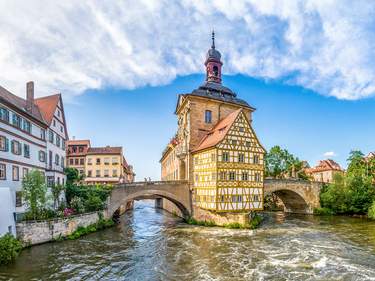
9 days / from 2242 USD
A self drive exploration of UNESCO Sites in Southern Germany
Explore UNESCO World Heritage Sites across different German states. This self drive trip allows you to design your own days with recommendations stated for each day.
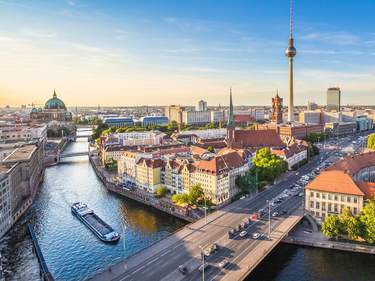
7 days / from 2878 USD
Explore Berlin and Potsdam in depth
The German capital Berlin has plenty to offer: from historical sites to world-class museums and a vibrant nightlife. Enjoy this private tour to explore a wide range of activities in Berlin and Potsdam, including several UNESCO World Heritage Sites.
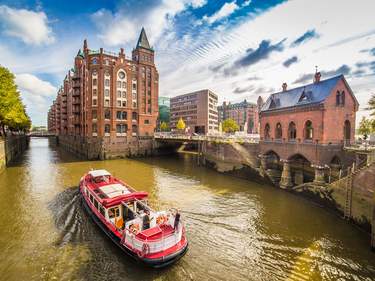
8 days / from 1487 USD
Explore Northern Germany on Your Own
From Bremen to Stralsund - Northern Germany offers plenty of gems to explore. With well-developed public transportation links, this itinerary is suited for everyone wanting to explore on their own - getting lost on the cobble-stoned streets of many UNESCO World Heritage Highlights.
By European standards, prices in Germany are reasonable; Berlin, for example, is well short of the excesses of Paris and London and with quality to match. Nevertheless, the country has the potential to become expensive, especially if you’re set on flashy nightspots, swanky restaurants and smart hotels. There can also be large differences in prices between regions and cities – Cologne is noticeably cheaper than near-neighbour Düsseldorf, for example.
Assuming you intend to eat and drink in moderately priced places, use public transport and stay at hostels, the bare minimum living-cost you could get by on is around €40 (£35/US$58) a day, including a hostel bed (around €20), snacks and an evening meal (€10), and a little for museums and entertainment. Make lunch the main meal of the day and you may save maybe €5 per day; but overall a more realistic typical holiday budget is about twice that of shoestringers, at €80 per day.
Student discounts
Full-time students can expect discounts at almost all sights and attractions – often around thirty percent – as well as being able to save money on transport such as rail travel. In general you’ll need to be under 27 to qualify for many of the discounts, and in possession of some kind of proof of your status. The International Student Identity Card (ISIC; isic.org), available from student travel agents, is the most widely recognized way to prove your status.
Crime is low by Western standards, but not nonexistent, and standard modern tensions exist. Statistically, crime is more prevalent in eastern states of the former GDR, fuelled by rising prices and depressed economies. Small-minded attitudes also often exist here, and xenophobic neo-Nazi thugs can target those who look “foreign” – non-white. Paradoxically, east German city centres, and German cities in general, are safer in comparison with other European cities. Petty crimes such as pickpocketing or bag-snatching in shopping precincts or busy U-Bahns are the most likely crimes you’ll encounter.
As far as personal safety is concerned, even the rougher city neighbourhoods feel more dangerous than they actually are. Those run-down U-Bahn stations or train stations with a crowd of drunks look alarming when compared to the rest of the country, but wouldn’t stand out in most other European cities. The situation in city suburbs is a little trickier, in Berlin, for example. With caution it’s fine, but muggings and casual violence do occur, particularly to those who stand out.
If you do have something stolen (or simply lost), or suffer an attack you’ll need to register the details at the local police station: a straightforward, but inevitably bureaucratic and time-consuming process. Note the crime report number – or, better still, get a copy of the statement itself – for your insurance company.
The two offences you might unwittingly commit concern identity papers and jaywalking. By law you need to carry proof of your identity at all times. A driver’s licence or ID card is fine, but a passport is best. It’s essential that you carry all your documentation when driving – failure to do so may result in an on-the-spot fine. Jaywalking is also illegal and you can be fined if caught.
Supply runs at 220–240V, 50Hz AC; sockets generally require a two-pin plug with rounded prongs. Visitors from the UK will need an adaptor; visitors from North America may need a transformer, though most of those supplied with electrical equipment – like cameras, laptops and mobile phones – are designed to accommodate a range of voltages.
Fire and ambulance:112
British and other EU nationals can enter Germany on a valid passport or national identity card for an indefinite period. US, Canadian, Australian and New Zealand citizens do not need a visa to enter Germany, and are allowed a stay of ninety days within any six-month period. South Africans need to apply for a visa, from the German Embassy in Pretoria, which will cost around R260 depending on the exchange rate. Visa requirements vary for nationals of other countries; contact your local German embassy or consulate for information.
In order to extend a stay once in the country all visitors should contact the Ausländeramt (Alien Authorities) in the nearest large town: addresses are in the phone books. For embassies in Berlin. Some countries have consulates in major cities elsewhere in Germany.
German embassies abroad
UK 23 Belgrave Square, London SW1X 8PZ, 020 7824 1300, london.diplo.de.
Ireland 31 Trimelston Ave, Booterstown, Blackrock, Co Dublin, 01 269 3011, dublin.diplo.de.
US 2300 M St. NW, Washington, DC 20037, 202/298-4000.
Canada 1 Waverley St, Ottawa, ON K2P 0T8 , 613/232-1101, ottawa.diplo.de.
Australia 119 Empire Circuit, Yarralumla, Canberra 2600, 02 6270 1911, canberra.diplo.de.
New Zealand 90–92 Hobson St, 6011 Wellington, 04 473 6063, wellington.diplo.de.
South Africa 180 Blackwood St, Arcadia, Pretoria 0083, 012 427 8900, pretoria.diplo.de.
Germany has a legendary gay and lesbian culture in its major cities and gay pride event Christopher Street Day is celebrated throughout the nation. Along with the two metropolises of Berlin and Hamburg, Cologne is one of the world’s great gay cities, with one in ten of the population either gay or lesbian. The scene in Berlin – home to the world’s first gay organization in 1897 and ruled by openly gay mayor, Klaus Wowereit – centres around the districts of Schöneberg, Kreuzberg and Prenzlauer Berg. That of Hamburg is in St Georg, and in Cologne there are two main gay districts – around Rudolfplatz and close to the river around Alter Markt and Heumarkt. Other thriving gay centres are in Munich and Frankfurt. Details of local scenes are provided in the sections on relevant destinations. Otherwise newsstand listings magazines have information on gay and lesbian clubnights and events.
Small-town Germany is inevitably more socially conservative – staunch Catholic towns of Bavaria can be hostile and physical assaults are not unknown in depressed towns of eastern Germany.
The standards of healthcare in Germany are world-class. For immediate medical attention, head for the 24-hour emergency room of a major hospital ; details are provided in major destination listings. In the event of an emergency , phone 112 for an ambulance ( Krankenwagen ). If you simply need a doctor call 01805 32 13 03 ( calladoc.com ; calls cost €0.14 per minute) for an English-language service that will discuss your symptoms and refer you or send an English-speaking doctor. Doctor surgery hours are 9am to midday and 3 to 6pm weekdays except on Wednesday afternoon.
As a European Union member, Germany has free reciprocal health agreements with other member states, whose citizens can apply for a free European Health Insurance Card (EHIC; www.ehic.org.uk), which will give you free, or cut-rate treatment, but will not pay for repatriation. The EHIC is available from post offices in the UK. Without this you’ll have to pay in full for all medical treatment, which is expensive – currently €30 for a visit to the doctor. Non-EU residents will need to insure themselves against all eventualities, including medical costs, and are strongly advised to take out some travel insurance.
Staff at Apotheken (pharmacies) provide over-the-counter advice, often in English, and basic medicines for minor health upsets. Marked by a green cross, pharmacies are generally open on weekdays 8.30am to 6.30pm and on Saturday mornings. They also operate late opening hours (24hr in cities) by rota – a list of the current incumbent and its address is displayed in windows. For prescription medicines you must provide a Rezept (prescription) from either your home doctor or a local one.
Since pre-Roman days, Germany has sworn by the curative powers of spa waters , a fixation which peaked in the mid-1800s. Towns with a “Bad” prefix to their names, or which include Baden (baths) in their titles (spa doyenne Baden-Baden or Wiesbaden) still offer extensive spa facilities.
Even though EU healthcare privileges apply in Germany, an insurance policy is a wise precaution to cover against theft, loss and illness or injury.
If buying a policy check small print for waivers on “danger sports” – common activities such as mountain biking can be classed among the likes of skiing and rock climbing. A supplemental payment provides cover. If you need to make a claim, keep receipts for medicines and medical treatment, and in the event you have something stolen, obtain an official statement ( Anzeige ) from the police.
Germany has fully embraced the internet. Most German towns operate a municipal website with good tourism information and helpful databases of festivals and events as well as accommodation booking engines. Larger cities provide an English-language version. Many museums, hotels and even restaurants also have a web presence. Be aware when hunting addresses that letters with an umlaut are rendered with an e – ä becomes ae, ü becomes ue and ö becomes oe.
Online access is good in medium-sized towns and cities, where internet cafés cost about €1–4 per half-hour. “Callshops” – discount international call centres – often in the streets around the main train station, usually have computers. Most backpacker hostels also provide a connection, often free. Larger hotels and a growing number of cafés have free wi-fi hotspots. Even a national laundry chain has started offering free wi-fi .
Larger hotels generally provide a laundry service – but at a cost. Most hostels offer a cheaper wash-and-dry service for around €5 a load. Launderettes are a little cheaper still, with an average load costing around €4 to wash and dry.
Hours tend to be daily 7am to 10pm; addresses can be found listed under “Waschsalon” in the Yellow Pages ( GelbeSeiten ). One popular nationwide chain is Schnell und Sauber which sometimes have bars and free wi-fi.
Left-luggage lockers at the large main train stations allow storage for time periods of 24 to 72 hours. Charges for lockers are around €2 for 24 hours. Many hostels provide free storage for a few days if you have stayed or intend to.
Berlin and to a lesser extent Hamburg are magnets for young people from Germany and all over Europe. The capital’s reputation as a politicized, happening city with a dynamic arts scene and tolerant attitudes means there is a large English-speaking community: something that will work to your advantage for jobs and housing, and to your disadvantage in competition. Work permits ( Arbeitserlaubnis ) aren’t required for EU nationals working in Germany, though everyone else will need one – and, theoretically, should not even look for a job without one. Long-term permits are a world of complicated and tedious bureaucracy. It’s essential to seek advice from an experienced friend, especially when completing official forms. The best official place for advice is the Auswärtiges Amt (German Federal Foreign Office; auswaertiges-amt.de), whose website has the latest information – in English – on entry into Germany and local contact details.
All those who want to stay in Germany for longer than three months – including EU citizens – must technically first register their residence ( Anmeldung ) at an Einwohnermeldeamt . For non-EU nationals – North Americans, Australasians and everybody else – finding legal work is extremely difficult, unless you’ve secured the job before arriving in Germany. The best advice is to approach the German embassy or consulate in your own country. Citizens of Australia, New Zealand and Canada between 18 and 30 can apply for a working holiday visa, enabling legal work in Germany for 90 days in a twelve-month period: contact German embassies for details.
For long-term accommodation , while newspapers advertise apartments and rooms, it’s much quicker and less traumatic to sign on at one of the several Mitwohnzentralen , accommodation agencies that specialize in long-term sublets in apartments. When you find a place to live, you need to register your residence as explained earlier. The form for this requires a signature from your landlord.
Post offices of Deutsche Post (deutschepost.de) and their unmissable bright yellow postboxes pep up the streetscape. Post offices are often located near (or with a branch inside) the main train station. Standard post office opening hours are Monday to Friday 9am to 6pm and Saturday 9am to 1pm, although the main office will operate longer hours. These often have separate parcel offices (marked Pakete ), usually a block or so away; and you can also buy stamps from the small yellow machines next to some postboxes and at some newsagents.
Mail to the UK usually takes three days; to North America one week; and to Australasia two weeks. A postcard or letter under 50g costs €0.75 to send worldwide. When posting a letter, make sure you distinguish between the slots marked for various postal codes. Boxes marked with a red circle indicate collections late in the day and on Sunday.
Your best bet for a country map is the companion edition to this guide: the Rough Guides Map: Germany (£5.99/US$9.99/CAN$13.99) produced on rip- and waterproof paper. Town maps are available from tourist information offices, usually free of charge, otherwise for a nominal sum. Larger bureaux in cities or tourist regions – the Rhine valley, Harz mountains or Black Forest, for example – also provide free regional maps. Both are generally adequate for orientation, though don’t rely on the latter for touring. Commercially produced maps available at larger bookshops are a joy. Falkplan and motor organization Allegmeiner Deutscher Automobil Club (ADAC) are consistently excellent, with distances indicated for the smallest lanes and clear town plans. Kompass (kompass.at) publish a full range of walking and cycling maps.
Germany uses the euro as its currency, which divides into 100 cents. There are seven euro notes – in denominations of 500, 200, 100, 50, 20, 10 and 5 euros, each a different colour and size – and eight different coin denominations, including 2 and 1 euros, then 50, 20, 10, 5, 2 and 1 cents. Euro coins feature a common EU design on one face, but different country-specific designs on the other. All euro coins and notes can be used in twelve countries that share the currency (Austria, Belgium, Finland, France, Germany, Greece, Ireland, Italy, Luxembourg, Portugal, Spain and the Netherlands). At the time of writing, €1 was worth £0.88/$US1.44/AUS$1.32/ZAR9.70; for current rates go to xe.com.
Banks are plentiful and their hours usually weekdays 8.30am to 5pm and no later than 6pm. It may be worth shopping around several banks, as the rates of exchange vary, as can the rate of commission. The latter tends to be a flat rate, meaning that small-scale transactions should be avoided. In any case, the Wechselstuben (bureaux de change) at the main train stations in cities, offer better rates, as well as being open outside normal banking hours and weekends, usually daily 8am to 8pm, a couple of hours longer on either side in the nation’s principal travel hubs.
Debit and credit cards , once a foreign concept, are becoming a part of everyday life, though their use is not as widespread as in the UK or North America. Cash is still the currency of choice, particularly in bars and restaurants. Major credit and debit cards (such as American Express, MasterCard and Visa) are good in department stores, mid- to up-market restaurants, and an increasing number of shops and petrol stations. Should you want to get cash on your plastic, the best way is from the many ATMs . You can withdraw as little as €20; however they do charge a minimum fee, often around €2.50, and charge two to four percent of the withdrawal as commission. In addition to credit cards, most bank debit cards, part of either the Cirrus or Plus systems, can be used for withdrawing cash, and carry lower fees than credit cards; your home bank will almost certainly levy a commission for use of the card abroad. Various banks will also give an advance against your credit card, subject to a minimum of the equivalent of £60/$100 – stickers in bank windows indicate which cards they’re associated with. Make sure your personal identification number (PIN) will work overseas.
Shops and markets : Business hours are generally Monday to Friday 9am to 6pm and Saturday 9am to 2pm, although some bakeries open on Sunday mornings, and department and chain stores will stay open till 8pm on weekdays and till 4pm on Saturday, both legal closing times. Conversely, many shops in smaller towns still close for lunch, generally from midday to 2pm. Outside of trading hours, small supermarkets in train and petrol stations supply the basics. Produce markets (usually weekdays in towns) operate between 9am and 1pm.
Tourist information : Typically Monday to Friday 9am to 6pm, Saturday 9am to 2pm, closed Sunday; but consult relevant chapters.
Museums and tourist attractions : Tend to open Tuesday to Sunday 9am to 6pm, though occasionally some open on Mondays too. Many museums close from November to March, particularly in very tourist-orientated regions like the Rhine and Mosel.
Restaurants : Generally 10am to midnight, although smarter restaurants tend to take Sunday or Monday as Ruhetag (closing day).
Churches : Access is generally excellent, usually open all day and all week, though respect services.
Opening hours on public holidays generally follow Sunday hours: most shops will be closed and museums and other attractions will follow their Sunday schedules. Public holidays fall on January 1, Good Friday, Easter Monday, May 1, Ascension Day (40 days after Easter), Whitsun, October 3, November 3, and December 25 and 26.
You can make local and international calls from most phone boxes in the city – marked international – which are generally equipped with basic instructions in English. Another option is to use one of the many phone shops offering cheap international calls and calling cards, usually alongside internet services, which can be found throughout the city. The cheapest time to call abroad is between 9pm and 8am.
Most British mobile phones should work in Germany, but if you haven’t used your phone abroad before, check with your phone provider whether it will work in Germany, and what call charges are. Unless you have a tri-band phone, it is unlikely that a mobile bought for use in the US will work outside North America.
If you are in Germany for a while, consider buying a local SIM card for your mobile phone. These are available through the phone shops and even corner stores and tend to cost around €15, often including some credit. Technically German SIM cards are only available to German residents and you will be required to register it at an address in Germany. In practice you can supply the address of your accommodation for this.
To use a different SIM card in your phone, it will need to be unlocked, if it isn’t already, to accept the cards of different providers. The phone shops will be able to advise where this is possible locally. Expect to pay around €10 for this instant service. Top-up cards can be bought in supermarkets, kiosks and phone shops.
Calling Germany from abroad the international code is 49. For directory enquiries in English call118 37; the service costs an initial €0.20, then €1 per minute.
Germany is in the Central European Time Zone, one hour ahead of Greenwich Mean Time: one hour ahead of British time, nine hours ahead of US Pacific Standard Time and six hours ahead of Eastern Standard Time. Daylight savings time (summer time) applies from the end of March to the end of October, when clocks are put forward one hour.
In a word, excellent. The national tourist board (germany.travel) produces stacks of brochures on regions and holiday themes; its website is great for ideas and planning and you can order a range of free brochures. Most regional tourist boards, cities and small towns also maintain an online presence, the majority with pages in English. On the ground, you’ll find a walk-in tourist office almost wherever you go, even in many villages; details are provided in the guide. These typically stock a good spread of pamphlets and brochures – usually in English in larger towns and cities, where one member of staff will be near-fluent. Tourist information offices will reserve accommodation, either for free or for a nominal charge.
Access and facilities for the disabled ( Behinderte ) are fair to good in large towns and cities: most major museums, public buildings and much of the public-transport system are wheelchair-friendly, and an active disabled community is on hand for helpful advice. Nearly four hundred Deutsche Bahn train stations have lifting aides or ramps. The company also offers assistance to travellers with disabilities upon reservation; call 01805 99 66 33, daily 8am to 10pm. Under certain conditions, the disabled and their escorts travel by train free or at reduced rates. For full information check on their English-language website, bahn.co.uk, under “Services” and “Barrier-Free Travel”.
The German Tourist Board website has links to dedicated state providers. NatKo (Nationale Koordiationsstelle Tourismus für Alle; National Tourism Coordination Agency for All; natko.de) handles enquiries concerning accessibility issues, supported by the main German disabled associations. Its German-language website publishes information and addresses for state travel-advice centres for tourists with disabilities as well as a list of tour operators with suitable programmes. For formal, in-depth information in Berlin, try disability activist group Mobidat (mobidat.net). They provide information on wheelchair-accessible hotels, restaurants, city tours and local transport services. Finally if you speak German, you might like to browse the online version of quarterly magazine Handicap (i-motio.de), for its hundreds of articles and active forums.
Travel anywhere in Germany by train and you’ll see an array of coloured bins on the platform, evidence that Germany takes recycling seriously. The recycling industry turns over around €50 million annually and Germans, who have a long tradition of social consciousness, recycle more of their rubbish than most other European nations. Using the Grüne Punkt (Green Dot) icon that indicates material can be recycled, they now recycle up to seventy percent of some materials, including 41 percent of plastics. In Bavaria, only one percent of rubbish goes to landfill. Visitors are expected to do their bit – novices placing items in the wrong container may be quietly reprimanded.
Bins – of which there are up to five – are colour-coded. One, usually green or blue, is for paper ( Papier ) and cardboard, including waxed cartons; boxes should be flattened and emptied of any plastic wrappers. Plastic goes into the yellow bin, along with milk cartons, cans, polystyrene and aluminium (marked with the Green Dot icon of two interlocking arrows). Straightforward enough, so long as you don‘t stuff different materials inside each other; this stuff gets sorted by hand, so a plastic cup hidden inside a tin is strictly verboten . There’s no need to rinse items but most Germans empty cans and plastics. Glass is usually collected in hostels to be taken to bottle banks, commonly in supermarket car parks. However, most bottles – glass and plastic – usually have a deposit ( Pfand ) on them of around €0.30–0.50 per item to be cashed at specified re-collection centres, most conveniently supermarkets. It’s standard practice to return items in bulk rather than singly. Biodegradables – including coffee grounds and teabags – go in another bin, usually brown, after which there‘s hardly anything left over. What is goes in the one bin that takes genuine Müll (rubbish) – grey or black and usually empty.
The Rough Guides to Germany and related travel guides
In-depth, easy-to-use travel guides filled with expert advice.

Travel advice for Germany
Find even more inspiration here.

Ready to travel and discover Germany?
Get support from our local experts for stress-free planning & worry-free travels.
- Travel advice
- Where to stay

17 Hilariously True Must-Knows Before You Travel to Germany
Last Updated: August 12, 2022
*FYI - this post may contain affiliate links, which means we earn a commission at no extra cost to you if you purchase from them. Also, as an Amazon Associate I earn from qualifying purchases. Check out our Privacy Policy and Disclosure. for more info.
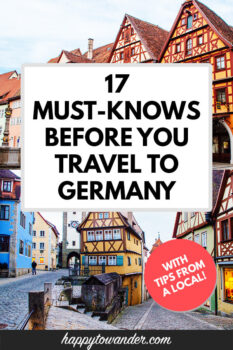
While I love exploring new places, there’s something special about travel in Germany that just gets me.
There’s mindblowing nature next to fairytale towns, big vibrant cities next to mounds of potato and meat 😉 By my accounts, it’s a near-perfect place.
… and that’s why I love it here!
There are certain quirks however that I wish was aware of before I decided to travel in Germany (and um, you know, eventually move there).
Save this post for later on Pinterest:

Despite being so similar to North America in many ways, there are radical differences to home that disorient even the most seasoned travellers.
Having learned most of these things the hard way, I’ve decided to valiantly compile my best tips for you – the important things you must keep in mind when you travel to Germany!
PS: I know, I know – Germany is a massive country, and it’s bad to generalize.
Much of my experience has been in Bavaria , where I live, and no, not all these tips will apply everywhere, but I have travelled a fair bit around the country as well and have found that much of this holds true.
Anyways, enough yapping – grab a beer and notepad – it’s time to travel Germany through these 17 important tips!
TIP: If you are still doing research for your trip to Germany, here are some recommendations. I always use Omio to compare/book transport options in Europe. It’s a free site that compares planes, trains and buses all at once and sorts them by price, convenience, etc. Also HotelsCombined offers a similar price check for hotels if you’re still needing a place to stay 🙂
17 Important Must-Knows Before You Travel in Germany
1. it’s all about that cash money, yo.
You might expect Germany, producer of supercars and epic technology to be on board with the whole credit card trend, but this simply isn’t the case.
I know it’s weird, but you’ll find that many places in Germany don’t actually take credit card, even shops in major transit hubs like central train stations.
So, if you plan to frolic/travel Germany for a while, make sure you have plenty of cash on you.
BONUS TIP: Coins are good to have as well. Carry at least some change with you at all times, especially if you have a weak bladder because…
2. Good luck if you wanna pee for free
The chance to travel in Germany is really like a fairytale come true… but sadly one where happily ever after involves paying to urinate.
Free public restrooms are quite rare, which means you’ll usually have to cough up 50 cents or more to pee at train stations, bus stations, shopping malls and even McDonalds (yeah, for real!)
NOTE: Often these places with paid washrooms will give you a little coupon to use on a future purchase, so if you need to go, head to the washroom first before buying your McNuggets.
Even restaurants and clubs aren’t immune to this, so that’s why I say you should bring change with you at all times.
Often washrooms in busy restaurants/clubs/events will have an attendant there who keeps it clean. In these cases, a tip isn’t mandatory, but heavily expected, sooo unless you enjoy getting vicious side-eye, bring some change with you.
3. On Sundays, may the odds be ever in your favour
So I’m not saying that Germany becomes the Hunger Games on Sundays…. but Germany kinda becomes the Hunger Games on Sundays.
In many parts of Germany, Sundays are a day of rest, which means that most shops (supermarkets, retail stores, malls, etc.) will be closed. Many restaurants will still be open, but if you’re hoping to run any errands or do any shopping, plan around the Sunday closures……. or you know, starve. It’s cool.
4. German punctuality is not a joke
Germans are crazy punctual. And for the most part, so is their public transport (at least in Munich, anyway!)
This means you should always get to your bus, tram and train and few minutes early, otherwise it will mercilessly leave without you.
Likewise, when making plans with a German person, don’t expect to get the whole 30 minutes buffer time you get in North America, where you both message “on my way! sorry! traffic is bad!” back and forth until one of you dies. No, a German will be on time. Maybe even ten minutes early.
Do not disappoint the German.
5. I hope you like staring contests
In my experience, Germans seem to really like staring.
Sometimes I like to pretend it’s because I’m a radiant goddess, but then the sensible part of me realizes it’s just a cultural thing.
If you think you’re being judged by that grumpy grandma sneering at you from two seats away, let’s be honest: you probably are.
We even have a special word for the older judgey people – the Oma and Opa-Polizei, (aka the grandma/grandpa police) who are sure to cast shade at you for even the most minuscule of offenses.
One time, an old woman stopped a friend of mine and yelled at him because she didn’t like his lederhosen. It’s just a way of life. Learn to laugh at it and move on. On that note…
6. Keep your voice down, lest you be judged
Germans don’t tend to speak very loudly (unless they’re shrieking folk songs after a few beers).
In fact, public transit is often eerily quiet, and if you don’t keep it down, your English voice will surely pierce through the calm and tear through the entire fabric of German social propriety.
Refer to #6 – people will stare at you, and you will feel awkward.
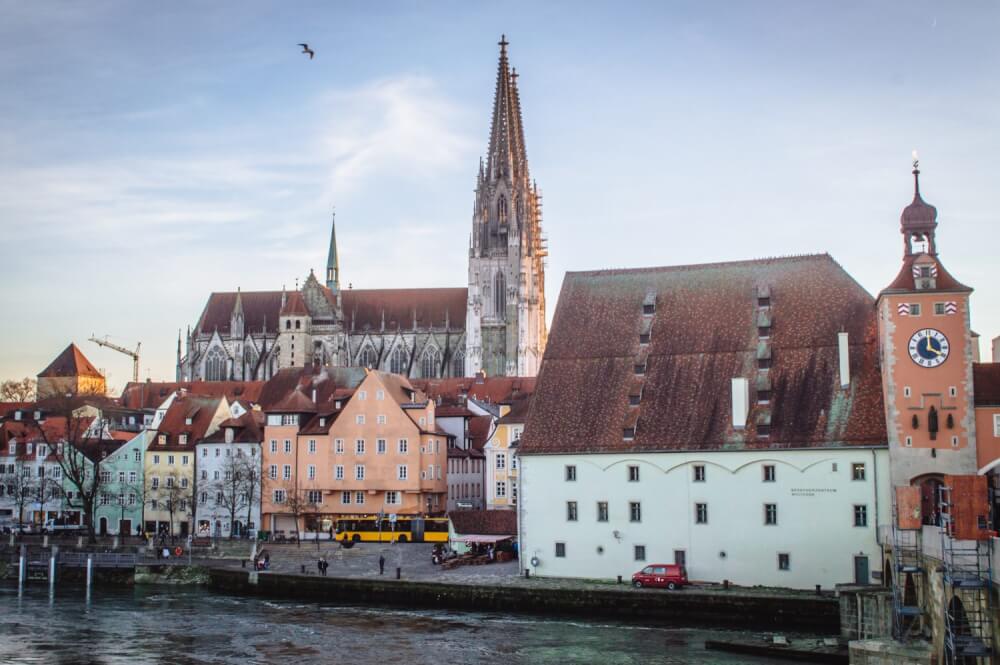
7. You might see some naked people
Ironically, for people who hate small talk and being loud on public transit, Germans are weirdly down with being nude.
Like, you wanna go to the park in the summer time? You will likely see a naked human being.
I mean maybe this is an odd Bavarian thing, but I learned it the hard way.
Once upon a time, I tried to have a peaceful picnic by the river in Munich’s English Garden (one of the world’s largest city parks). Eating my pretzel was difficult as an elderly man ran naked, wild and free across the river from me, periodically bathing himself and flaunting his body like he was Ryan Gosling on steroids.
Anyway, nudity can be common – just prepare yourself.
PS: In many saunas, wellness spas, etc., nudity is not only expected, but mandatory. This is another lesson I learned the hard way. *cringe*

8. When you travel in Germany, look for group discounts on travel/train tickets
If you decide to travel Germany by train, make sure you take advantage of all the amazing discounts!
Germans LOVE rewarding you for having friends, so group tickets will often save you ludicrous amounts of money.
As an example, in Munich a one-way bus ticket is 2.80, whereas a 3 day group ticket for unlimited travel for up to 5 people is less than 30! That’s only 6 euros a person, for 3 days of unlimited joy rides. It’s insane.
Likewise, look into special regional tickets for trains which get cheaper the more friends you bring. In Bavaria, we call this a “Bayern ticket”, but I know other states have them too. For us, you pay 25 euros for the first person, then 7 euros additional for every extra human you get on there, which means huge savings if you get up to 5 (the maximum) on the same ticket. It’s also valid for unlimited train travel within that region, which means Godzilla-sized savings. For more info, you can click here for my full Bayern ticket guide.
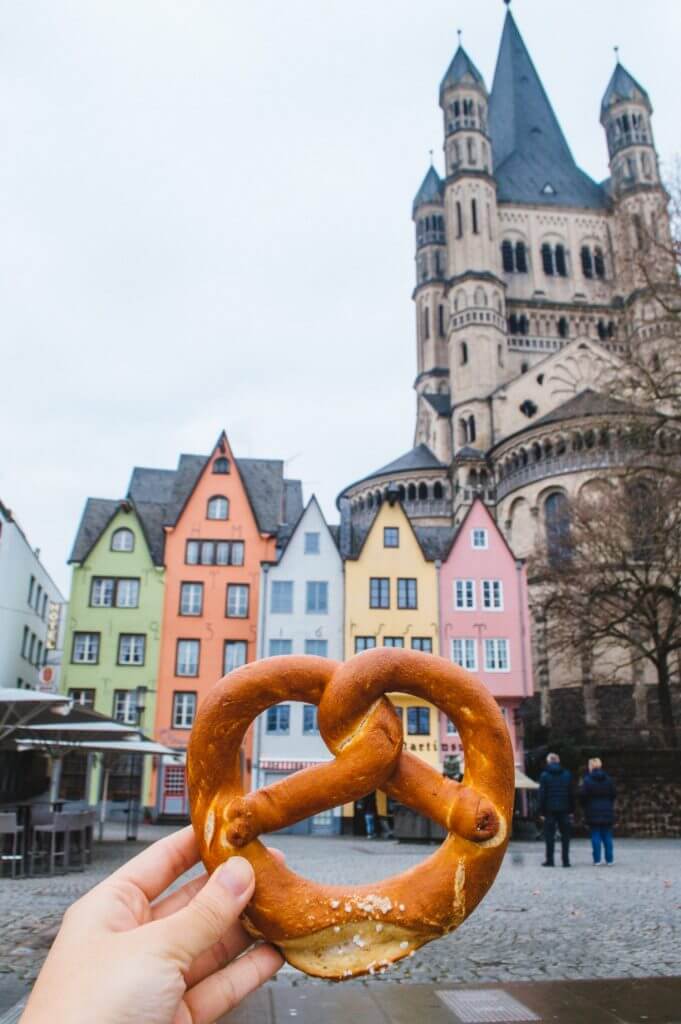
9. Water will cost you, and it’ll probably be fizzy
One of the biggest shocks for North Americans who travel to Germany is that in restaurants, a) water isn’t free and b) fizzy, carbonated water is usually what you get by default.
This thrills me because I would literally carbonate everything if I could, but I know a lot of folks hate fizzy water (ugh, weirdos ).
So, be sure to clarify whether you want still or sparkling. Sadly, there’s not much you can do about paying for it though (unless you have your own sneaky bottle of water with you).
PS: Buying bottled water at the shop will become the most confusing thing in the world (and a significant source of anxiety).
Every brand has their own colour code/name for which water has gas or not.
Some consider “natural” to be with gas, some without, some use blue for fizzy water, others use green…. They even categorize by how fizzy it is (e.g. Medium), and I just about lost it when once, I saw a teal bottle that said “EXTRA STILL” on it. What even is extra still water? How could still water possibly get any still-er? Turns out, it’s a cryptic German code for mildly fizzy water. Nothing is safe, folks. Enjoy your Russian roulette of hydration. [Sorry for the rant, I am just weirdly passionate about this topic]
10. Most people speak English, except (weirdly) where it counts
I always joke with friends that I could stop anyone on the street here in Germany and they would probably speak fluent English, yet as soon as I step into any bureaucratic environment (e.g. to get my visa sorted, to open a bank account, etc.), I’m left flailing in broken German.
Fair enough though – after all, remember that you’re in a foreign country so you shouldn’t expect people to automatically speak your language. That’s why it’s helpful to brush up on some basic German phrases, although you shouldn’t worry too much because there usually at least some fluent English speakers lurking around, especially in big cities like Munich and Berlin.
Craving more fuel for your wanderlust? Connect with me on Instagram for real-time updates, photos and stories!
11. Avoid the bike lane or risk certain death
Biking culture is pretty big here, especially in Munich where I live. Trust me when I say that you have not gotten a real taste of travel in Germany until you’ve stared death in the face while accidentally prancing down a bike lane.
There’s not often a clear division between the path for bikes/for people, and they tend to exist side by side to really shake things up and get you that sweet adrenaline rush. Here’s your best survival tip: check whether or not you’re in the bike lane!
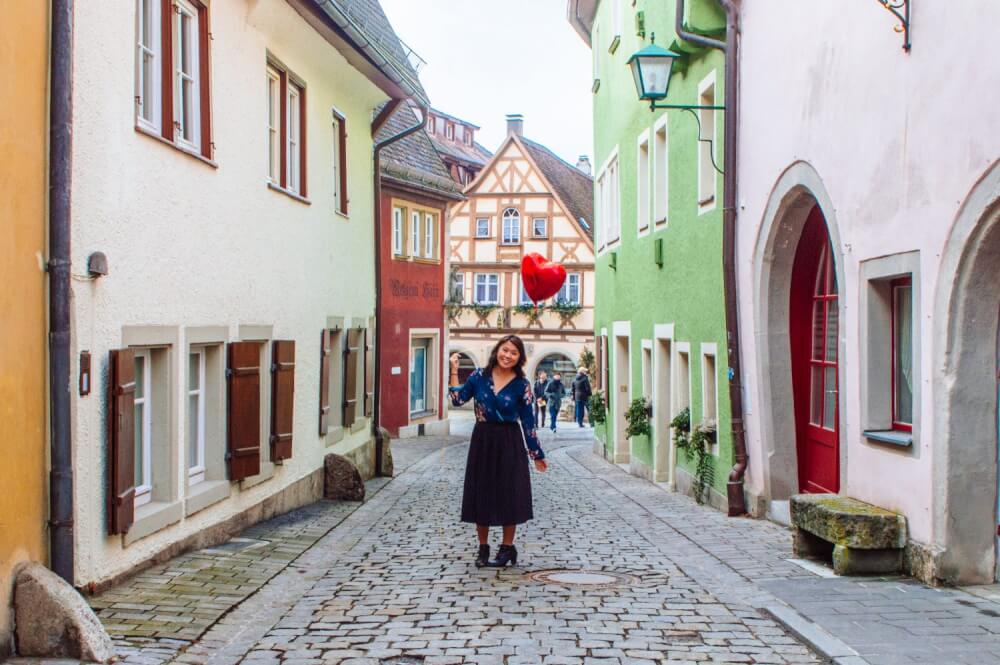
12. Oh yeah, jaywalking is worse than murder
So sure, maybe I’m exaggerating but I have literally never met a group of humans so collectively and vocally against jaywalking.
I once saw a guy in the suburbs who still waited dutifully for the light to change before crossing, despite not a single car or witness in sight (besides me, always a’lurkin).
Especially when there are kids around, parents get super angry at you for setting a bad example (which is fair enough), so it’s better safe than sorry.
There are few things more terrifying than being yelled at by an old German woman from across the street. Well, apart from trying to select the right water at the grocery store that is. Sorry – still not over it.
13. Travelling to Germany is a lot of Pfand
This is a very lame pun that won’t make sense unless you speak German, but Germans are really into recycling and the term “Pfand” essentially refers to a refundable deposit that you pay on things like cans, bottles and even glasses/mugs at beer gardens and Christmas markets.
It functions as an incentive for you to return those items to get your money back. So, in the case of cans/bottles, it encourages recycling and in the case of glasses/mugs, it prevents you from pocketing them as fun souvenirs (though many still do).
This is a really important word to know, because often items will be more expensive than the listed price at the store because of the pfand. So that 1 euro can of Coke might become 1.25 at checkout. Similarly, let’s say you’re at a German Christmas Market for the first time and want to get yourself a nice mulled wine for 3 euros. You might end up paying 5 euros at first, because of the 2 euro pfand on the mug. Extra picky places will even give you a token to return alongside your glassware to get your refund back.
Soooo remember: if your cashier slides you a plastic coin at the beer garden, it’s not some kind of sketch business dealing, it’s just something you must return to get your moola back.
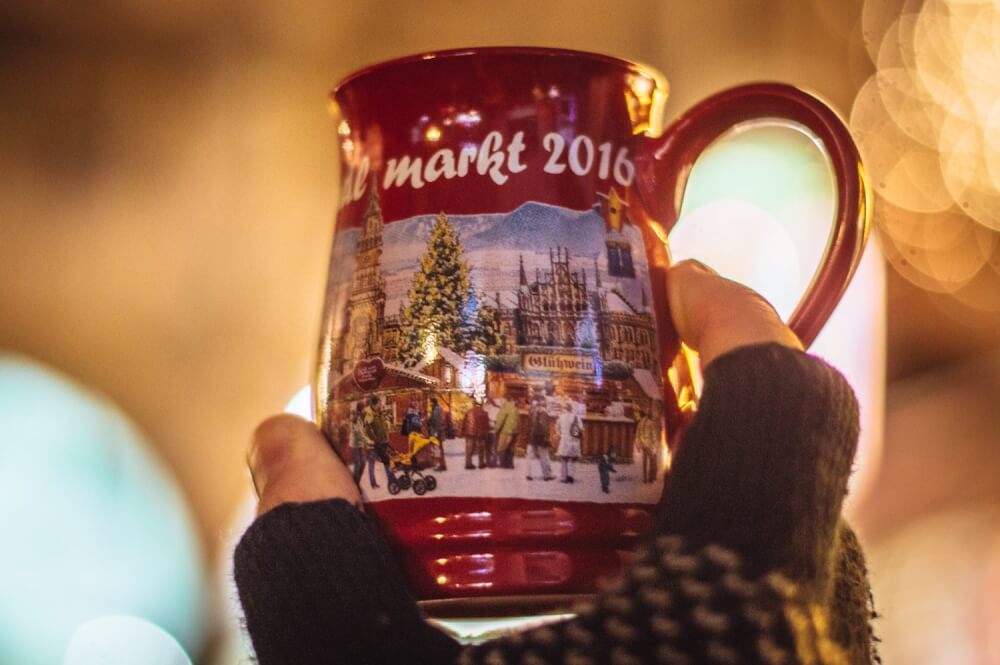
14. Small talk and pleasantries are not a thing
As a Canadian, it’s in my DNA to fill any voids of silence with meaningless chit chat. “It’s a windy day out, eh?” I’ll often murmur, yearning for that sweet human connection as I do.
Germans hate this.
Germans literally do not understand the point of small talk. Often, if you try it, they will be confused at why you are wasting their time and getting all up in their personal space. On that note…
15. Expect customer service to be frostier than a snowman on skis
There are of course exceptions to this, but generally speaking, customer service is not very friendly or warm in Germany. This goes for restaurants, retail shops and yes, official places like banks.
But hey, if you play your cards right and smile sweetly, you might get a vague acknowledgement of your presence in return 😉
Yay, little wins.
So, the next time your waiter ghosts you and doesn’t return for like, 10 years, don’t take it personally – it’s not you!
On that note, tipping is still expected – but not to the crazy extent that we take it to in North America. Generally, rounding up is enough.
16. Good luck at the Grocery Store AKA the freaking Olympic Games
Never in my life did I think I’d need to do warm-up exercises before visiting the grocery store.
… Then I moved to Germany.
I swear the cashiers in Germany are all training for the Olympic Games.
They scan items so absurdly quickly that it’s like a duel every single time. Like, dude – I just wanted some bananas, why are you rushing like your wife has gone into labour?
So, be prepared if you choose to visit the grocery store (which you should, because it helps you save loads of money!!).
Another important thing is to bring your own bag – most people do. There are bags you can buy at the checkout, but remember to pick one up and put it at the front of your item haul, otherwise you’ll be left with a million items from the Usain Bolt of groceries and nowhere to put them.
17. Be ready to giggle at fun words like “fahrt”
German is a different language than English. Duh, yes, hi – Captain Obvious reporting for duty.
BUT, there are some German words that sound just like words we have in English, usually with very different meanings.
Fahrt is one such word.
To complicate matters, it is SO common. You will literally see it everywhere – road signs, transit hubs, everywhere . And while I wish the Germans were simply big fans of flatulence, the truth is the word “fahrt” means a lot of things like trip, drive, way, outing, etc. Feel free to giggle about it though – you’re an adult who can do whatever you want.
Full disclosure: even after 2 years here, I still giggle when the little ticket machine tells me “Gute Fahrt!” after I’ve purchased a ticket. They really are trying to say “Have a good trip!”
PS: “Rathaus” (aka Rat House) means town hall and “schmuck” is actually jewellery. Heh. German is such a fun language.
A post shared by Christina 🇨🇦 happytowander.com (@happytowander) on Oct 17, 2017 at 10:09am PDT
I hope you enjoyed this roundup of must-knows for those who plan to travel in Germany! As always, if you have any more travel in Germany tips, let me know in the comments!
My Go-To Travel Favourites:
🧳 Eagle Creek: My favourite packing cubes
💳 Wise: For FREE travel friendly credit cards
🍯 Airalo: My go-to eSIM
🏨 Booking.com: For searching hotels
📷 Sony A7IV: My (amazing) camera
✈️ Google Flights : For finding flight deals
🌎 WorldNomads: For travel insurance
🎉 GetYourGuide: For booking activities
88 thoughts on “17 Hilariously True Must-Knows Before You Travel to Germany”
You crack me up Christina!!! I actually met a German trauma surgeon working here I. Seattle for a year and I am laughing out loud cuz I witnesssed some of these very things ha! ( no not the nudity )
I am actually thinking of going there to teach .. I am 3/4 German but have so many questions lol … maybe sometime I can email you and ask ?
Thx for sharing this ! Xo Valerie
Sure! I’d be happy to answer any questions you have, but I don’t have a load of experience with regular work visas (I’ve been here on student and youth mobility visas). Happy to chat about the experience of moving here though! And hehe so glad you liked the article!
I loved when shops were closed on a Sunday, they used to be like that in the Netherlands too until a few years ago. I see many similarities to the Netherlands really, great read.
It’s not so bad once you learn how to plan around it, and I totally get why it’s a thing, but I do miss the convenience of shops being open almost all the time hehe. I bet the Netherlands are super similar! Really happy you enjoyed the read 😀 Thanks for stopping by!
Haha, as a European I relate to many things, but I do think it’s funny 🙂 no. 16 is sooo true, but super weird i know 😀
Hahah so glad you could relate 😉 thanks for reading!
I love Germany SO much and loved this post! You captured so many of the great German idiosyncrasies. One other thing my husband and I can’t get enough of in Germany is how everyone always has to get the last word – or “Chuss!” in when we leave a store or a restaurant. If we say “Chuss” back they’ll end it with an “Abend!” It could go on forever! Love it 🙂
Oh my goodness you are SO write! I never realized that. I’m gonna be on a quest to always get the last word now hahah. Thanks for reading!
One of the few blogs that actually makes me laugh out loud! I really love your writing! (Yay you!! :-D) Great blog post and defo a few things I’ll keep in mind when I visit Germany.
oh my gosh you are too sweet! Thank you for appreciating my lame jokes hahah. You rock!
I have been to Germany once. Your tips just added to my knowledge. You’re a good writer, and if you lived my next door I would love to have you over for coffee. PS don’t get nervous your likely the age of my kids. GOOd JOB
Couldn’t agree more with everything! I live in Germany, in fact even Regensburg and I was surprised to see a picture of my beautiful adopted home town!
I LOOVE Regensburg! Naturally I needed a way to fit a photo in hehe. So happy you relate to this! Thanks for reading 🙂
I am a Canadian living in Germany for four years. Been here for two and a half – and agree with every single thing you said! Loved the article!
Hahaha hello from a fellow Canadian living in Germany!!! <3 Thanks for reading and laughing along.
This was very interesting, I had no idea about many of these, except for the naked people thing… I have a friend, he`s German and he loves being naked (he took his clothes off at a wedding party!!!) I had to send him this article… Like “Ahhhh, now I get why you do it!”
Hahaha that’s too funny, and I kinda want to know the story behind that wedding nudity….. 😉 but yes, I find that Europeans as a whole just find nudity a lot less taboo than we do in North America. It’s kinda nice actually – after the initial shock wears off!
I’m a German who’s living in Lima, Peru. When visiting Germany, I simply don’t have the patience anymore to wait for the green light, I’m too used to crossing the street when it’s somehow possible. On the other hand, I still remember my first grocery shopping in Lima. Oh great, just two people in front of me. Well, it would have been faster in Germany with 20 people in front of me ;-). As far as water is concerned, just drink tap water, cheaper and good quality. Punctuality is my most German habit and constantly giving me trouble in South America. I mean, I warn people beforehand that I am punctual and if I’m lucky, they’re just 10 minutes late :-).
Hahaha it’s so cool to hear your perspective! It must be so interesting bouncing between such different cultures. I had a Spanish friend I went to school with here in Munich and his lack of punctuality really drove our instructors insane lol.
I found this post so informative and helpful.
thanks for reading!!
Hahaha! I was laughing all along! The water bit, the jaywalking… it was all just spot on! Amazing article!
hahah yesssss! so happy you liked it 🙂 thanks for reading!
I’m glad Germany takes cash instead, haha, since I like to carry cash with me when I travel! When I went to London I felt like a dinosaur being the only one not paying with a debit card lol! 😛 – Charmaine Ng | Architecture & Lifestyle Blog https://charmainenyw.com
Sometimes I prefer cash too – helps me keep track of my spending haha
I think the naked thing is just much a stereotype as Lederhosen but I guess it does stick out to people that it is legal to go topless to the beach and that we do have coed saunas where everyone is naked. I remember it used to freak my American friends out.
I will send your post to the Deutsche Bahn because when it comes to punctuality they definitely have to catch up (pun fully intended).
Interesting about the stares – I never notices this as compared to countries like India. But as I said on FB I think it might also be a north south divide 🙂
Yeah it’s exactly those things! In North America we can be very prudish when it comes to nudity (being topless at the beach/naked saunas are definitely not a thing), so even those pretty “normal” things stand out to us a lot. And also re: the staring, it could very well be too that you blend in seamlessly whereas we expats/tourists have our ways of sticking out (being loud, speaking English, etc.) Just yesterday, my backpack accidentally grazed the tram ticket machine, which made a tiny sound and then this angry man looked up from his book and stared me down for a solid 5 seconds. It was awkward hahah
Hahahaha – this is so true!! The water thing – not being able to get tap water ANYWHERE drove me up the wall. And one of my colleagues (English) got done by the police for jay walking – now we just check for police before doing it! Oh and I ran into a nude man in my hotel… in the hallway…. gotta love the Germans
No way! I’ve never witnessed anyone actually getting ticketed for jay walking. I bet it wasn’t cheap either! I’ll definitely be more careful now. And LOL I feel like I need more context behind this nude encounter…….
Nicely done! I enjoy your witty writing and especially love the pictures.
Aw thanks so much, Mary!
So I learned some things about myself today. 1. As much as I hate the cold, I will definitely be visiting Germany in the winter so as to avoid the frolicking old naked men. 2. That Christmas mug is adorable and I will definitely steal it.
PS- your photography is so ridiculously gorgeous.
Hahahaa to be fair, it’s not like they’re *everywhere*. You’ll be more likely to see topless women around the parks than wrinkly old men. Maybe I just got lucky 😉 Also YES all the markets have different mugs too and it’s just the best thing. I highly recommend a separate suitcase just for them haha
You made me laugh so hard, Christina! I love this! I lived in Germany for 2 years and I can testify, everything is true!! I love this post.
Your comment makes me so happy!!! Thanks for reading, girl <3
I‘m German. I visited 18 differnt countries for job reasons, from US to Japan. And yes, you are totally right. It really tooks a smile on my face reading your 17 tips. They are so true. Brilliant. We are really a funny kind of peoples here. But wait, someone can easily write 17 funny facts for visiting the US
I would LOVE if somebody wrote that post. Even as a Canadian, there are certain funny things about the US I could write about haha
This is a fun idea for a post. I live in Germany, and what you listed is normal to me by now (still getting used to the staring, though). But I might try one about my passport country, or rather the Midwest. Something to ponder over the holidays… I only recently stumbled across your blog, and I’ll be back to read more.
Aw Beth – thanks so much! really glad you enjoyed it 🙂 One about the Midwest would be great! Let me know if you end up writing it!
Being of German descent and having visited Germany before this article rings so true and made me laugh out loud. I am taking my partner to Germany next year and this article is perfect for him as he is like the quintessential opposite of a German. One point made me want to share a story with you…. My friend and I weren’t aware of the jaywalking law and crossed on the red Ampel Man on a Sunday afternoon in Berlin, there was literally no one around and next thing we know we hear the revs and then screech of a police car mounting the kerb within a foot of our (now soiled) pants! The officer got out screaming at us, all the German I knew flew out the window. Let’s just say he thought it Germanly amusing when we finally muttered “Australien”! I still laugh about this to this day.
Hahaha wow – what a story! Thanks for sharing, Lear <3
I legit laughed out loud! Your righting is fan-freakin-tastic. I am an American who grew up around German culture here and have visited Germany many times so I can totally relate! I did not know about #8 – good to know! And #17… omg driving and you the AUSFARHT signs… I die every time! Thanks so much for sharing. Can’t wait to spend the rest of my day procrastinating real work and reading your blog!
Hey, I’m german and yes, you are so damn right about all those things! Really made me laugh! About speaking english in public offices (town hall, Bürgerbüro…) : Most of these guys there speak english, but they are not allowed to by law…
So glad you enjoyed it, Andrea! That’s really interesting – I had no idea there was a legal reason behind it. I’d love to learn more about why! Do you have a link or anything about the law in question?
I’m an American who’s been living in Munich for 5.5 years and I can say these are ALL true….hilarious. I’d also add to the supermarket olympics section to mind your spot in line so no one cuts in front of you!
Hahaha that’s a good one… some of those omas can be ruthless in getting ahead! Thanks for reading – so happy you liked it!
Great Article. I’m sure my husband will fail at #14 as he talks to everyone when we travel about anything! As for me, I’m just plain loud, so #6 is going to get me lots of stares, LOL As my husband is half German, your list also provided me with insight to his personality, ie #1 he likes paying cash for everything, #4 he has never been late a minute in his life, #7 he loves being naked (but what guy doesn’t). As for #2 we are in trouble…..he pees as if he were in his last month of pregnancy! LOVE your humor….and the article.
Hillarious read, quite entertaining. I loved it. Filled with useful information. I plan to visit Germany in the near future, I’ve been doing research and found your site. Gracias!
Thanks so much for the kind words, Ana! Glad you enjoyed it <3 <3 I hope you have an amazing time in Germany!
Always carry change! My 2 sister in laws and myself were chased out of a bathroom by “Broomhilde” the bathroom attendant. We figured out we only had 1 coin and all needed to pee . We didn’t let the door close and when she realized what we were up to chased us down the street shaking her fist and lecturing. It’s still our best story after 21 years!
I have a great jaywalking-story, as well. When I once crossed the street 3 seconds too early (the traffic lights for cars already switched to red), a police officer drove up to the christmas market I was heading to, jumped out of his car yelling and asked me if I planned to give my parents a dead daughter for christmas – then I had to pay 5 Euros. Haha he was crazy! However, here in NRW, the western part of Germany, people are generally much more friendly open-minded than in e.g. Bavaria!
What a fun read! I am a German, living in Texas with my family for 8 years. My 14 y old daughter often tells me “Don’t stare at the people!” while I am not aware of starring. I am just curious and interested … is that starring? The punctuality is really a thing. People who let us wait are rude because they are wasting our precious time (keeping us from being efficient). When we had our first big party here (Oktoberfest – what else – and I had cooked authentic food from scratch for three days) nobody showed up at the given time. We were totally irritated, double checking the (written!) invitations for time and date, calling some guests if they thought it would be in Oktober (since Oktoberfest is always in September!) etc. . The first guests showed up about 40 minutes late, some came more than an hour late and the most shocking thing: Some left after an hour, telling us that they also have to go to another party … this is like a total no-go in Germany. Well, we learned and adapted … to a certain point. But we are still always on time!
The credit card thing explained: The bank in Germany takes a high fee for credit card transactions. If you buy something for a small amount, it often would cost the store owner more to pay for the transaction than the item you bought. Germans have some sort of debit card which usually comes at a lower fee for the shop owner. But cash is still highly appreciated.
All 100% true, and not only for Munich. I grew up in the North of Germany and it is the same story. Then of course this stuff was normal for me until I moved abroad 😀 hilariously written!
Are the Christmas markets also closed on Sundays? Thank you!
Nope! Of course it depends on the actual market, but most will be open and very, very crowded haha 🙂
Hi Christina You just made my day I read your post and I as laughing sooo many times loud out . I am from Germany live now in the US ( east coast ) since 20+ years and same as you I LOVE TO TRAVEL and see the world. Mostly Asia You are mostly SO RIGHT in your description about Germany.Lucky me I am not from Bavaria but from the NORTH but most of your tips is true for all of Germany Again LOVE LOVE LOVE YOUR POST
Some are really hilarious .Nice Tips for travelers who are planing for germany trip.
Hi Christina, Germany is one of my favourite countries to visit and for many of the reasons above, especially the silence on public transport. And yes, the towns are pretty. My blogging never does them enough justice!
Hillarious read, enjoyed it. Was planning to visit Germany, found your site during my research, learnt quite a lot. Cheers!
Hallo Christina,
I love your post. I am German (from Oldenburg in Loxer Saxony) and have been looking for something exactly like this as I’ll be welcoming a Texan friend in summer time. How cool. I didn’t wanna bore her with my “preparation list” (I wouldn’t even have known how to start it!) and then I found your blog. How cool. Thanks for your brillant descriptions of literally everything a foreigner needs to know about Germany and Germans. 🙂
We Germans are so weird but of course pretty friendly and funny, too. 😉
Have a great time and be safe.
Susanne :-).
thanks for the information
Just moved to Bavaria from the states – reading up on some tips after being here nearly a month. This is super helpful but mostly a hilarious read! I loved reading your take on things! Well written. Thanks for the tips for my German adventures!
I love Germany and have travelled there three times and hopefully will visit again. I feel that the whole Ampelmann thing is peculiar as an American, but also, charming. I saw stores with Ampelmann merchandise in Berlin and in Munich. I also scratch my head over getting assorted wursts…in the U.S., long rolls are used to accommodate the shape… but I’ve only seen round rolls used, especially what we here call Kaiser rolls.
Bravo for the wonderful write up Christina. very helpful. anyone looking for further information about Germany or needs travel documents to Germany can contact this email [email protected]
Christina, my son was stationed in Germany and loved it. He’s been back home in USA for some time longing to go back. He just got notice he has job in Germany and will be moving there with his family soon. My sister and I will go visit him and travel around Europe for first and probably last time (we are 70 +) and your tips are great! I live in Louisiana and it is a very funny state.
ha ha, loved this. So much of it I remember from my German holidays
Love your article! I met my German husband in Austria, and have had 39 happy years! Our grandchildren call us Oma and Opa. You nailed it with the punctuality for sure! Germany is a wonderful country with friendly people. Love Munich, Rothenburg, Berchtesgaden, ….. Enjoy your stay!
Germany is a beautiful country with a Rich cultural heritage and the people here are honest and straight forward, thanks for sharing the travel tips which are of great help to travellers and save them from getting into awkward situations. October is the best time to visit Germany as Oktoberfest the best folk festival is held in this month.
Hi Christina, My husband and I are planning a trip to Munich, then Vienna, Italy and Switzerland in September 2020. I came across your article on “17 Hilariously True Must-Knows Before You Travel to Germany”…loved it. I would also enjoy advise on what to wear on our trip. We’re from Florida, where shorts and t-shirts are the norm. Thank you.
Your Travel Blog is really nice. I love german and culture. maybe I will do to visit one day. I would like to do a marathon run if someone invites me.
I don’t ever comment on blogs but I have quite a bit of experience in Germany and Munich is one of my favorites. Your post made me laugh out loud a couple times. I’m forwarding the link to my husband so he can enjoy it too. Thanks!
I agree with whatever you have mentioned here. I am here in germany for study and I have to change a lot of habits that is mentioned above. Speak in small voice, urinating, puncuality, taking care of cycle lane. Even some older people scold you, this is the most wierd thing. I thing the yonger genration is much better the older are sucking. But you will find good old people who speaks in english and help you. You cracked all the things i n your article. Thanks.
Next year I plan to visit Germany. This will be my first trip. Thanks for the exchange and your advices.
I love these tips! There is just so much to see in Germany! I went last year during the holidays and am dying to go back. There are too many cute towns to see!
Thanks for travelling tips to visit Germany. I will be visiting their very soon and I will probably use your tips and travel recommendation. Much grateful for the information though.
You made me laugh so much! Ah these are so true. Thank you for writing about them in such a hilarious way. It’s been four years since I moved home from Germany and escaped a few of these – and have missed some others. 🙂
Aw thanks for reading and for the kind words, Ava!! Hope you can make it back to Germany again sometime soon to visit haha 🙂
I LOVED this article! I have been living in Munich for about 18 months and all of these were spot on! I definitely laughed out loud when I read the one about the grocery stores. I still get soo stressed trying to bag my stuff! You just never get used to it!
Hey Christina, this very good written! I am actually german and do also live in Munich. I find it very interesting to see the german way of living from another perspektive from time to time 😛 Anyhow i wanted to add something about the jaywalking…(i think that is walking across the street with a red traffic light?) If you are unlucky and the police sees you while doing that it can be very expensive. I got caught once running over the strees a few seconds after the light changed and i had to pay 80€ So i do highly recommend to cross the street far far away from a traffic light (ofc after you made sure that there are no cars that could run you over) or just wait until the light turns green, because sometimes policemen also wait in plain clothes behind the traficlight for someone to cross it while its red… And there is someting else that i wamted to add to your list. I think that almost every household in Germany is a shoes off household. So if you get invited to someones house or appartement, take your shoes off or ask if you should/can leave them on. This could keep you from leaving a rude expression 🙂
Hi Lisa, thanks so much for reading and thanks for sharing your experiences/extra tips! I grew up in a shoes-off household too so it never crossed my mind that this was a cultural difference haha. Definitely a good tip for those who aren’t used to it!
The part about Still water killed me , i literally LOL! every time im in europe i break my head trying to find still water..
Doing research for my book where they visit Germany and this article was so HILARIOUS and helpful, thank you so much for taking the time to make it! <333
A very informative article about the German travel.I really appreciate your research. Thanks for sharing. Hope to read more articles on your blog…!!! Keep it up.
Christina I was laughing the entire time I read your blog thank you for the laughs and information I’m sure I’ll have a great time in Germany!
I AM a German living in Canada since a couple of years now. And what should I say: You are perfectly right with your accurate analysis. I laughed my ass of reading your blog. Thank you.
Great post, I want to thank You for sharing this as it contains a lot of details and it has been very useful.
It is great to know about places, I find such blogs which tell about a country like living, food, places to visit. Like I found a lot in this blog and I enjoyed reading it. I hope you will share such good blogs.
Thank you for sharing your valuable insights and tips on traveling in Germany. Your article is well-written, informative, and packed with useful information that will undoubtedly help anyone planning to visit Germany.
I appreciate the practical tips you’ve provided on topics such as transportation, accommodation, food, and culture. Your personal experiences and anecdotes add a relatable and authentic touch to the article, and I found your advice on interacting with locals and adapting to the local culture particularly helpful.
Your suggestions for off-the-beaten-path destinations and hidden gems in Germany were also a great addition to the article, and I appreciated the detailed descriptions and recommendations for each place.
Leave a Comment Cancel reply
By using this form you agree with the storage and handling of your data by this website. *
Latest Articles
Top tips for travelling in germany.

A Voyage Through Germany: the Lowdown on River Cruising

Craft and Culture in the Lesser-Known Gems of Eastern Germany

The Best Hotels to Book in Thuringia, Germany

The Best Spa Hotels in Baden-Baden

The Best Hotels in Germany for Every Traveller

The Best Hotels to Book in Garmisch for Every Traveller

Stay Curious: Experience Germany From Your Living Room

10 Reasons Why You Should Visit Bavaria

Inspiration
Get inspired to travel. explore lgbtq+ travel experiences, hidden stories, and the unique attractions that make a destination worth visiting., 12 wonderful ways to connect with nature in germany.

Hungerlust: The Berlin Chef Leading a Revolution in Insect Tapas

Photographer Frank Thiel On Today’s Berlin: ‘No Boundaries Between People’

Ostalgie: Journey Back to Communist East Berlin

An Urban Explorer’s Guide to Abandoned Berlin

Why You Should Visit Berlin, According to DJ and Café Entrepreneur Peter Duran

Tropical Islands: Berlin’s Surreal Beach Paradise on a Former Airfield

Leaving Berghain: Anna-Lena Krause Captures Clubbers in the Cold Light of Day

Kitsch-Fest or Nation-Building Tool: What Does Eurovision Mean for Eastern Europe?

Guides & Tips
Get expert guidance for your trip. from tips on packing to cultural etiquette, our travel advice will help you make the most of your journey., a christmas weekender in berlin.

How to Spend a Wellness Weekend in Baden-Baden, Germany

Culture Trip's Guide to Berlin

Innovative Tours That Offer a Different View of Berlin

The Story Behind Germany's Neuschwanstein Castle

Beyond Brandenburg Gate: An Afternoon Discovering Berlin’s Mitte District

Berlin by Bike: Exploring the German Capital on Two Wheels

Immerse yourself in the local arts, literature, and design. Explore the cultural fabric of the destination through art, literature, and design.
A tour of berlin's bauhaus neighbourhood, hansaviertel.

Places in Germany for History Lovers

13 Places To Discover Spectacular Design in Germany

The Berlin Wall Murals Tell a Story – Just Not the One You Think

The Opera That Made Upper-Class Berlin Fall in Love With London’s Underworld in 1928

Experience Multicultural Berlin Through These Local Heroes

Beyond the Club: LGBTQ Art and Culture in Berlin

The Film Locations That Shaped ‘The Girl in the Spider’s Web’

Places To Stay
Find the perfect place to stay. whether you prefer boutique hotels, luxury resorts, or budget hostels, we have recommendations for you., the best hotels to book in winterberg, germany.

A Bar Owner’s Guide to Cologne With Tobi Breit

Street Wise: A Stop-by-Stop Guide to Oranienstrasse, Berlin

A Time-Traveller’s Guide to Berlin With Arne Krasting

The Greener Guide to Seeing Berlin More Sustainably

The Best Hotels to Book in Trier, Germany

The Best Hotels in Aachen, Germany

The Best Hotels in Heidelberg, Germany

Things To Do
Plan your sightseeing and activities with our recommendations. explore attractions, book tours, and immerse yourself in the local culture., see a different side of berlin with these unique tours.

Queer Nightlife in Berlin: The Best LGBTQ Bars and Clubs

Breathtakingly Beautiful Buildings in Germany

The 11 Best Experiences in Berlin

9 Recommended Tours in Berlin

An Insider’s Guide to Shopping in Berlin

How To Relax and Recharge in Berlin

Food & Drink
Explore the local culinary scene, from breakfast to michelin-starred restaurants. sip cocktails, savor desserts, and discover the best local markets., the best german restaurants in berlin, germany.

Where To Find Cologne’s Best Breakfasts and Brunches

The Best Bars and Cafés for Board Games in Berlin

City on a Plate: Seeing the Real Berlin With Germany’s Most Exciting Restaurant

Explore Berlin’s Food Scene With the Chef Putting Insects on the Menu

A Chef’s Guide to Berlin With Evgeny Vikentev

10 Unmissable Burger Joints in Berlin’s Coolest Neighbourhoods

The Most Delicious Dishes You Must Try in The Ore Mountains

The Most Delicious Dishes You Must Try in Saxony


Unveiling the Ultimate Germany Travel Tips: Insider’s Guide
Germany travel tips: be prepared for unpredictable weather and visit off-season to avoid crowds. Germany offers a wealth of history, culture, and natural beauty, from the bustling cities of berlin and munich to the enchanting landscapes of the bavarian alps and the black forest.
Whether you’re interested in exploring ancient castles, sampling local cuisine and beer, or simply enjoying the great outdoors, germany has something to offer everyone. However, before you pack your bags and hit the road, there are a few things you should know to make your trip as enjoyable and hassle-free as possible.
Through this post, we’ll provide you with some helpful tips for traveling to Germany, so you can make the most of your visit.

Credit: soundcloud.com
Understand The Culture
Germany is a country with a rich history and culture that dates back centuries. As a traveler, it is essential to understand the cultural norms and values of the people to make the most out of your visit. Here are some tips for understanding and respecting germany’s culture and its people.
Research Germany’S Cultural Norms And Values
To avoid cultural misunderstandings, it is essential to research and understand the cultural norms and values of germany. Here are some important points to keep in mind:
- Germans are punctual, and being late is considered disrespectful.
- Personal space is crucial, so avoid getting too close while interacting with people.
- Germans value privacy, so avoid asking personal questions.
- Eye contact during conversations is appreciated, and not maintaining it indicates dishonesty or disinterest.
- Tipping is not mandatory in germany, but it is customary to add a 5-10% tip on the total bill.
- Dress appropriately, especially when visiting cultural and religious sites.
Learn Basic German Phrases And Etiquette
While english is widely spoken in germany, learning some basic german phrases can help you communicate and show respect for the local culture. Here are some essential phrases to learn:
- Hello – guten tag
- Thank you – danke
- Please – bitte
- Goodbye – auf wiedersehen
- I’m sorry – es tut mir leid
- Excuse me – entschuldigung
Additionally, knowing basic german etiquette will help you navigate social situations comfortably. Here are some crucial points to remember:
- Shake hands when greeting someone.
- Do not interrupt while someone is speaking.
- Address people with their last name and a formal title (herr or frau) unless they suggest otherwise.
- Do not raise your voice or use aggressive body language while speaking.
Tips For Interacting With Locals
Interacting with locals is an excellent way to learn more about germany’s culture. Here are some tips to help you interact comfortably:
- Learn a few german phrases to show respect for the local language.
- Be punctual for appointments to demonstrate respect for other people’s time.
- Follow social etiquette and respect personal space.
- Avoid wearing casual attire in formal settings.
- Carry cash for small transactions as not all places accept credit cards.
- Be open to trying new foods and beverages.
Understanding germany’s culture and values is crucial for respectful and enjoyable travel experiences. With these tips in mind, you can avoid cultural misunderstandings and experience the country’s rich traditions.
Plan Your Itinerary
Germany is a beautiful country that offers a diverse and rich cultural experience for any traveler. With so much to see and explore, it’s crucial to plan your itinerary to make sure you don’t miss out on any of the fantastic attractions and hidden gems that germany has to offer.
The Best Time To Travel To Germany
Germany experiences four distinct seasons, making it a year-round destination. However, the best time to visit depends on your preferences and what you want to see and experience.
- Spring (april to may): This is the best time to visit if you want to avoid the crowds and enjoy a pleasant climate. The cherry blossoms are also in full bloom during this time, making it an excellent time for nature lovers.
- Summer (june to august): This is peak tourist season, and the weather is perfect for outdoor activities and sightseeing.
- Fall (september to november): This is an excellent time for wine lovers, as germany’s wine regions are in full swing during this time. It’s also a great time to enjoy autumn foliage and festivals.
- Winter (december to february): Germany is a winter wonderland during this time, with christmas markets and snow-covered landscapes. It’s also an excellent time for winter sports enthusiasts.
Top Destinations To Visit
Germany has several iconic cities and landmarks that every traveler should visit at least once.
- Berlin: Germany’s capital is a vibrant and modern city that offers a rich history, art, and culture.
- Munich: Known for oktoberfest and its beautiful architecture, munich is a charming city that offers a perfect blend of modernity and tradition.
- Frankfurt: This is the financial hub of germany and a perfect destination for history lovers. Visit the old town to see the restored timber-frame houses, museums, and churches.
- Cologne: Cologne is known for its spectacular cathedral and vibrant nightlife.
Lesser-Known Hidden Gems To Explore
If you want to escape the crowds and experience something unique and offbeat, consider visiting these lesser-known hidden gems.
- Spreewald: A stunning location with interconnected waterways, spreewald offers a serene and peaceful escape.
- Heidelberg: This beautiful university town is home to germany’s oldest university and has a rich history and culture to explore.
- Aachen: Aachen is a beautiful spa town famous for its thermal springs and roman baths.
- Rügen island: This picturesque island is located in the baltic sea and is a perfect destination for nature lovers and those seeking a slower pace.
Planning a trip to germany can be overwhelming, but with these travel tips, you’ll be able to create a memorable itinerary that includes the best destinations and hidden gems that germany has to offer.
Accommodation & Transportation
Germany is a beautiful country, with impressive castles, picturesque landscapes, and booming cities. There are plenty of things to experience in germany, and it’s always a good idea to prepare ahead of time. In this section, we’ll discuss accommodation and transportation options that will help make your trip to germany as smooth and enjoyable as possible.
Types Of Accommodation Available
Germany offers a wide range of accommodation options to fit any budget. Whether you’re looking for a budget-friendly hostel or a luxurious hotel, you’re sure to find the perfect accommodation. Here are the key types of accommodation available:
- Hotels: Germany offers an extensive range of hotels, from budget-friendly options to luxury accommodations. You can choose to stay in a stylish boutique hotel, a high-end chain hotel or an expensive historical estate.
- Hostels: Germany has some of the best hostels in europe that offer budget-friendly accommodation options. Hostels are an excellent choice if you’re traveling solo and want to meet other travelers or if you’re traveling on a shoestring budget.
- Airbnb: With airbnb, you can rent an entire apartment or house in germany. This option is ideal if you’re looking for a home-like experience, especially if you’re traveling with a group or family.
Finding The Best Location To Stay
When choosing a place to stay in germany, it is essential to consider a few things.
- Location: The location of your accommodation is crucial as it affects the experience you get from your travels. If you’re looking for privacy, consider staying outside of the city center. If you want to be in the thick of things, try booking accommodation in the heart of the city.
- Safety: Germany is a safe place to travel, but you should always research the area you plan to stay in before booking your accommodation.
- Local attractions: Look for accommodation near local attractions to make exploring germany’s sights more comfortable and more convenient.
Getting Around In Germany
Germany is a well-connected country, and getting around is easy. Here are the best transportation options you can use while in germany:
- Trains: Germany has an extensive rail system that connects cities and towns throughout the country. Traveling by train is fast, reliable, and relatively inexpensive.
- Buses: Long-distance buses are a cheaper transportation option in germany and are operated by various private companies.
- Taxis: Taxis are a convenient transportation option in germany, especially when traveling from the airport to your accommodation.
- Car rentals: Renting a car in germany is the perfect option if you’re planning on exploring the country at your own pace.
Finding the right accommodation and transportation options in germany is a crucial part of your trip. With careful research and planning, you can enjoy a comfortable and stress-free vacation in germany.
Food & Drink
Germany is a food lover’s paradise. From the hearty meals of bavaria to the gourmet cuisine of berlin, there is something for everyone. In this section of germany travel tips, we will explore the must-try german cuisine, the best places to eat and drink, and recommendations for different regions.
Must-Try German Cuisine
German cuisine is known for its meat dishes and heavy sauces. However, there is much more to german food than sausages and sauerkraut. Here are some must-try german dishes:
- Schnitzel: Thinly pounded, breaded, and fried meat, usually pork or veal
- Currywurst: Grilled or fried pork sausage seasoned with curry ketchup
- Käsespätzle: A type of soft egg noodle mixed with cheese
- Rindfleisch eintopf: A hearty beef stew
- Brezel: A large, twisted pretzel, typically served with mustard
Best Places To Eat And Drink
Germany is full of gastronomic delights. Here are some of the best places to eat and drink:
- Hofbräuhaus, munich: This is one of the oldest beer halls in munich, offering traditional bavarian food and beer.
- Schwarzwaldstube, baiersbronn: A three-michelin-starred restaurant located in the black forest, offering gourmet cuisine.
- Brauhaus schmitz, philadelphia: A traditional beer hall in the usa offering a taste of germany.
- Vöner, berlin: A vegan kebab shop in the heart of berlin.
Recommendations For Different Regions
Each region of germany has its own cuisine and specialties. Here are some recommendations for different regions:
- Bavaria: This region is famous for its large portions and meat dishes. Try the weißwurst, a traditional bavarian breakfast sausage.
- Rhineland: The region is known for its wine and beer. Try a glass of kölsh, a top-fermented beer, and some reibekuchen, grated potato pancakes.
- Saxony: The region is famous for its sweet treats, such as eierschecke, a type of cheesecake, and pflaumentoffel, a pastry filled with plum jam.
Germany has something for everyone, whether you want to indulge in hearty bavarian dishes or gourmet cuisine in berlin. Follow these food and drink tips to make the most of your visit to germany.
Safety & Money Matters
Germany is a beautiful country to visit with a rich history and culture, but it’s important to keep safety and money concerns in mind during your travels. Here are some essential safety and money tips to make your trip to germany a memorable experience.
Tips For Staying Safe In Germany
Germany is generally a safe country to travel to. However, it’s always wise to take necessary precautions to prevent any mishaps. Here are some tips to keep in mind:
- Be aware of your surroundings, especially in crowded areas such as train stations, markets, and tourist hotspots.
- In case you feel threatened or need help, dial 110 for police assistance or 112 for an ambulance or fire brigade.
- Be cautious of pickpockets in busy areas and public transport.
- Avoid walking alone at night in cities and stay in well-lit areas with a lot of foot traffic.
- Do not leave your luggage unattended, and keep important documents such as passports and tickets safe.
Handling Money And Currency Exchange
Visitors to germany can use euros (€) as currency, and most establishments accept major credit cards such as visa and mastercard. Here’s what you need to know about handling money in germany:
- Withdraw cash from atms, which are available in all major cities and towns. It’s advisable to use atms located in banks or malls.
- Notify your bank before travelling to germany to avoid any issues with transactions.
- Keep small cash amounts for small expenses and use credit cards for larger purchases.
- Avoid exchanging money at airports as they charge higher commission rates.
Emergency Contacts And Important Documentation
It’s essential to keep important documents such as passports, id cards, and tickets safe during your visit to germany. Also, make a note of the emergency contacts and their numbers in case of any unforeseen incidents. Here’s what you need to know:
- Keep copies of all essential documents including passports and travel documents in a separate safe place to make it easier to replace them if lost or stolen.
- Call 112 for emergencies and 110 for police assistance.
- In case of any health-related emergencies, visitors can access emergency medical services by calling 116117.
- Visitors should know their embassy and consulate’s contact information in case of emergencies.
Frequently Asked Questions Of Germany Travel Tips
What are the must-see attractions in germany.
Some of the must-see attractions in germany include the brandenburg gate, neuschwanstein castle, and the berlin wall memorial.
What Is The Best Time To Visit Germany?
The best time to visit germany is during the summer months (june to august) when the weather is warmer and there are various festivals and events held.
What Is The Currency Used In Germany?
The currency used in germany is the euro (€), which can be easily obtained from various currency exchange offices or atms.
Is It Necessary To Learn German Before Visiting Germany?
While it is not necessary to learn german before visiting, it is recommended as it can help with communicating with locals and understanding the culture better.
What Are Some Traditional German Dishes To Try?
Some traditional german dishes to try include currywurst, schnitzel, sauerkraut, bratwurst, and bavarian-style pretzels.
As you can see, germany has much to offer for travelers seeking adventure, culture, and history. Whether you are a first-time visitor or a seasoned traveler, it is essential to plan your trip beforehand to enhance your overall experience. Exploring the country’s diverse cities, indulging in german cuisine, and immersing yourself in the local culture are just a few of the highlights waiting for you.
Additionally, learning some basic german phrases, understanding their customs, and following the various rules and etiquette will make your trip memorable and enjoyable. With the tips mentioned in this guide, you are now ready to embark on an unforgettable journey to germany.
So, pack your bags, grab your passport, and set off on an adventure of a lifetime. Prost!

Welcome to auto france
Use our services in the past? Please sign in so we can keep track and reward you for being a loyal Auto France client!
Forgot password? Click here
No account? Sign up here
4 Travel Etiquette Tips to Guide Your Travel in Germany
PICK UP DATE
DROP OFF DATE
Home • Blog • 4 Travel Etiquette Tips to Guide Your Travel in Germany
Experienced travelers know just how important it is to learn about the culture of the country you're visiting. And the longer you stay in a country, the more important your travel etiquette becomes.
Germany is a fascinating country with a long history and a vibrant, multi-faceted culture. It’s a popular travel destination , to be sure. However, due to how rapidly it modernized after World War II and the fall of the Berlin Wall, there is often a misconception that it’s more similar to the United States than it really is. This is the mistake many tourists make when they make their first trip there, which can lead to some rather interesting faux pas.
So if you're planning a long-term trip to Deutschland, whether you're a student , business person, or simply a long-term vacationer, here are 4 travel etiquette tips that should guide your travel.
1. Don't Generalize
From the outside, it's easy to judge Germany as a single cultural entity of inhabitants who love Sauerkraut and beer, know how to party in October , and enjoy their Christmas markets. But as anyone who has lived or stayed in the country for a while will tell you, the reality is much more diverse.
Germany, as you probably know, was not established as a single nation until 1871. Before then, it was a loose collection of independent states, all with their own customs and cultural habits. And as it turns out, regional cultures still reflect that independence between the various states.
Northern Germans will scoff at the suggestion that Sauerkraut is a delicious meal, much like Southern Germans will raise their eyebrows at the wide variety of fish meals that are ingrained in Northern German culture.
Of course, we realize that we're falling into the generalization trap ourselves here; you will find northern Germans who like Sauerkraut, and southern Germans who love pickled herring. But as a whole, going into Germany with the assumption that you already know the local culture can lead to misunderstandings and irritation.
2. Know the Language—At Least A Bit
One great aspect of traveling to Germany is the fact that you will encounter a wide range of people who just can't wait to show off their English skills. Depending on your exact location, you can stay in the country for months without speaking a single word of English. But that doesn't mean you should.
Knowing at least a couple of polite German words and phrases —from "Danke" and "Bitte" to "Auf Wiedersehen" and "Guten Tag"—can help you endear yourself to local residents, who will appreciate your effort to learn their language.
If you stay long enough, additional knowledge of the language will come natural. Until then, learning a couple phrases while still relying on your hosts' English knowledge is an ideal combination.
3. Know Your Tipping Rules
One of the most important aspects of travel etiquette in any country is knowing how to behave in a restaurant, and that's no different in Germany. Generally accepted tipping rates are 5-10%, but you should always end the final payment in a full amount.
There is one caveat to this rule: do not tip the owner of a restaurant. Doing so is considered an insult in Germany, as the owner of any establishment is already considered in the original bill. If you have trouble establishing whether your waiter is the owner (which, especially in small restaurant, is not uncommon), don't be afraid to ask.
One final tip when it comes to restaurants: be sure to carry enough cash. Many restaurants still don't accept digital payments , and checks are long out of fashion in the country, so cash is your safest route when it comes to paying your bill.
4. Be Honest and Direct
Many foreigners, especially Americans, report being thrown off by the directness of interactions with Germans. If you ask someone how they're doing, don't be surprised if you get an honest answer that may not always be positive. When you offer someone a drink and they say no, they mean it.
Germans generally avoid "floskeln," polite small talk whose meaning can't be taken seriously. Instead, they try to make conversations count, saying what they mean with less worries about how it might be received. Once you get used to this direct honesty, it will actually be refreshing.
The longer you stay in Germany, the more important it becomes to understand and adjust to the various customs of the country. For more information about travel tips and tricks (along with a great way to get around the country and continent as a whole), subscribe to this blog !
- Academic Travel Tips (13)
- Auto France News & Updates (12)
- European Travel Tips, Tricks, & Advice (77)
- Lion's Den: Peugeot News & Updates (10)
- One way car rental Europe (1)
- Travel Ideas & Itineraries (50)
Subscribe To Blog
Enter your information below to start receiving the latest news and helpful travel tips from AutoFrance and the world of Peugeot.
Etiquette in Germany

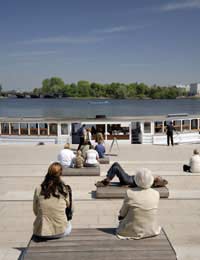
Germany is a popular holiday destination for many people especially as travelling from Britain to Germany is now easier and quicker than ever. In terms of social customs and etiquette, whilst the basic rules remain largely the same as with any other European country, you should make yourself aware of some slight but important cultural variations of German etiquette.
Introductions – Sie or Du?
Familiarising yourself with the basic appropriate use of ‘Sie’ and ‘du’ is advisable. Basically, the use of “Sie” is reserved for professional and unfamiliar acquaintances, senior figures and those in a superior social or business standing. Generally, if a person refers to themselves as Mr (Herr) or Mrs (Frau) followed by their family name, you will then know that it is appropriate to use the more formal “Sie” form of address.
Once you become more friendly and well-acquainted with a German person, your friendship may develop into a first-name basis. This is often an indication that the use of “du” is now appropriate – however it might be best to see if your German friend initiates this gesture. Generally do not use 'du' unless specifically requested to do so by the other person.
Commonly, young children, friends and peers will address each other using the more familiar “du” form of address. If your German counterpart introduces himself using their first name, this is usually an indication that you can use “du”. If you are still not sure, the best course of action is to listen and note how your counterpart addresses you, so that you can then follow suit.
Introductions
In informal situations, female friends and family will often meet and greet by offering a cheek and kissing the air. Men can pat or slap each other on the arm or back, but it is best to only do this if your German equivalent does so first.
Punctuality
Make sure that you give plenty of notice if you intend to call on a German person at home or in business. Merely turning up on someone’s doorstep is considered to be very bad manners. Similarly, if you think that you might be late to an appointment, meeting or social event, you should always make a point of calling your host or acquaintance to explain your late arrival. This is thought to be a common courtesy in Germany.


15 Best Germany Travel Guides
This post may contain affiliate links. Read my disclaimer policy.

Looking for the best Germany travel guide to take on your trip? Here are 15 of the most useful options for travelers planning trips to Germany!
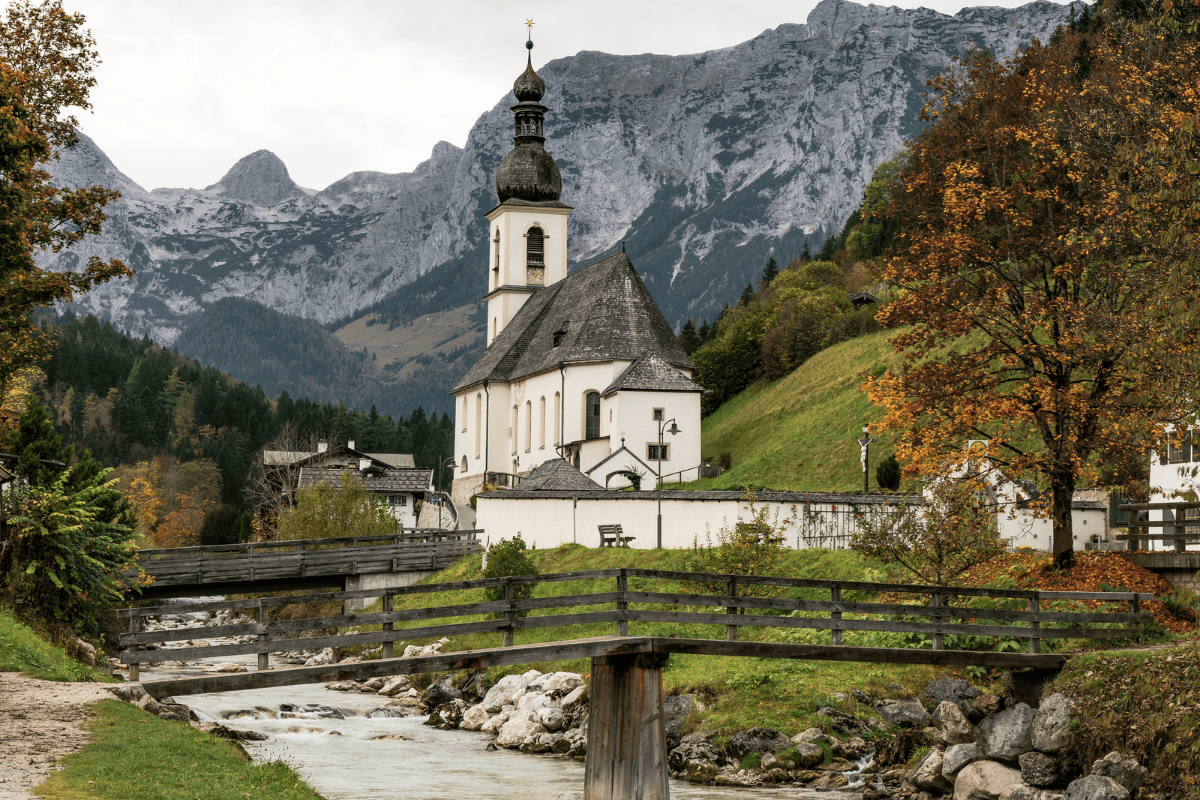
Germany is a world class tourist destination in the heart of Europe.
Every year, millions of people travel there to taste its many famous beers and traditional German cuisine , visit enchanting fairy tale castles , national parks, and beautiful sights, learn about its rich history and culture, and much more.
No matter whether you plan to visit busting big cities or Germany’s many thriving smaller cities, you’ll find tons of attractions and points of interest. But they can be difficult to explore effectively without a guide to help you along the way.
Join our FREE Germany Trip Planning Facebook Group!
This article shows you the best Germany travel guides out in the market today (both in hard copy and Kindle) and how you can choose the best one for your trip.
Whether you plan to spend time in Berlin, the Rhine, Bavaria (or elsewhere!), want to travel by cruise, train or take a road trip, or are traveling solo, with a partner or your entire family, there’s a guide for every kind of itinerary and traveler!

- 1 Quick Guidebook Recommendations
- 2 Why Use A Travel Guide?
- 3 Germany Travel Guides Comparison Chart
- 4 How To Choose The Best Travel Guide For You
- 5 15 Best Germany Travel Guides
- 6 What To See And Do In Germany?
- 7 When Is The Best Time To Go To Germany?
Quick Guidebook Recommendations
Check out this quick list of our favorite guide books if you’re in a hurry, or continue scrolling to see our full list with in-depth reviews.
- For Insider Tips On Hidden Gems : Fodor’s Essential Germany
- For Kindle Unlimited Users : The Rough Guide to Germany
- For First-Time Travelers to Germany: Rick Steves Germany
- For multiple formats and off-line maps: Lonely Planet Germany
- For DIY Berlin Walking Tours: National Geographic: Walking Berlin
- For Visiting Munich, Bavaria & The Black Forest: Lonely Planet: Munich, Bavaria, and the Black Forest
- For Visiting Rothenburg & the Rhine: Rick Steves’ Rothenburg & the Rhine
- For Road Trips & Day Trips in Germany, Austria & Switzerland : Lonely Planet’s Guide to Germany, Austria, and Switzerland
- Best City Pocket Guide s: Lonely Planet’s Pocket Guide Berlin, Hamburg, Munich
- For Roadtrips in Germany: DK Eyewitness Road Trips
- For Rail Travel in Germany: Europe by Rail
- For River Cruises: Lonely Planet Cruise Ports European Rivers
- Best Guide for Kids: Kids Travel Guide Germany
- For Quickly Learning About German Culture: Culture Smart Germany
- For Learning German Language: 1,000 German Phrases
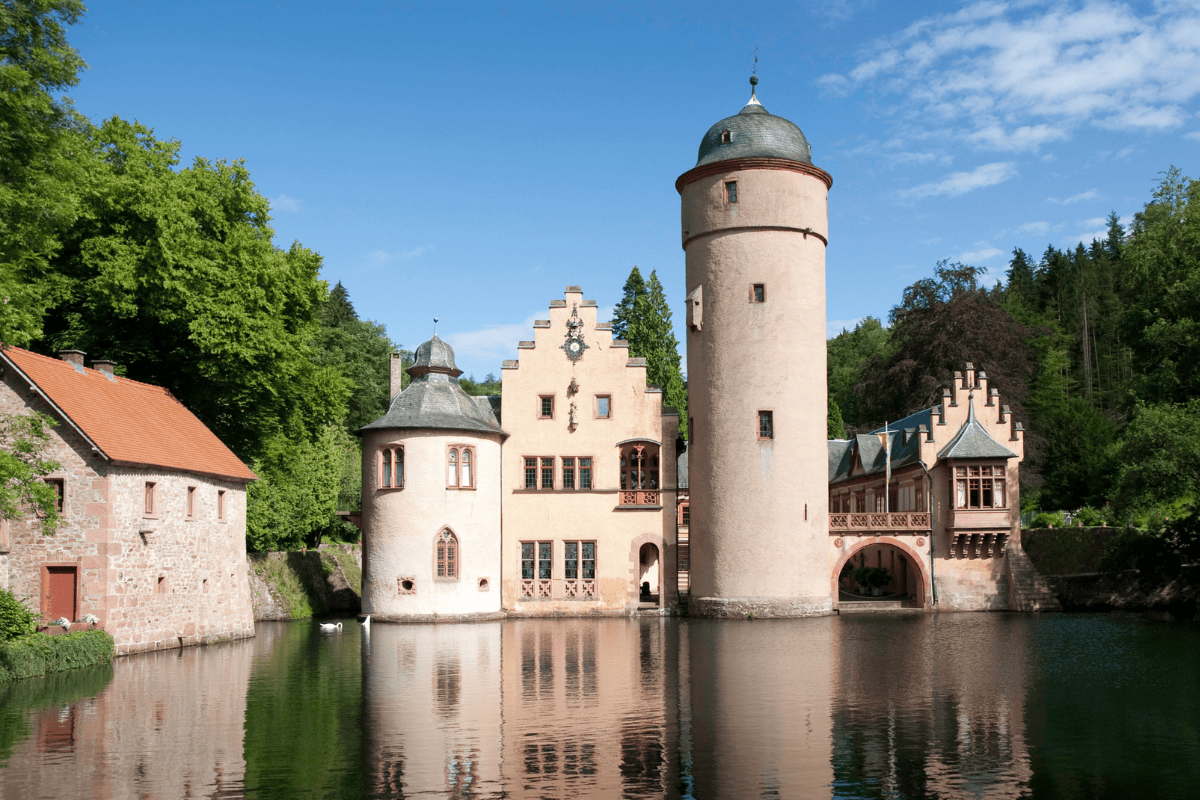
Why Use A Travel Guide?
Germany travel guides are a great resource for planning specific aspects of your trip, especially when combined with the info we provide on this website.
You can never have too much trip planning information, and a good travel guide provides essential travel information without the need for wifi.
Travel guides are especially useful for people who don’t have a lot of experience traveling abroad or who don’t speak the language of their destination country.
The guides we highlight below can help you find good restaurants, learn about regional customs and traditions, and avoid scams in specific locations.
If you’re looking for something more specific than general travel advice, there are many specialty travel guidebooks available that cover everything from hiking trails to famous literary locations around the world!
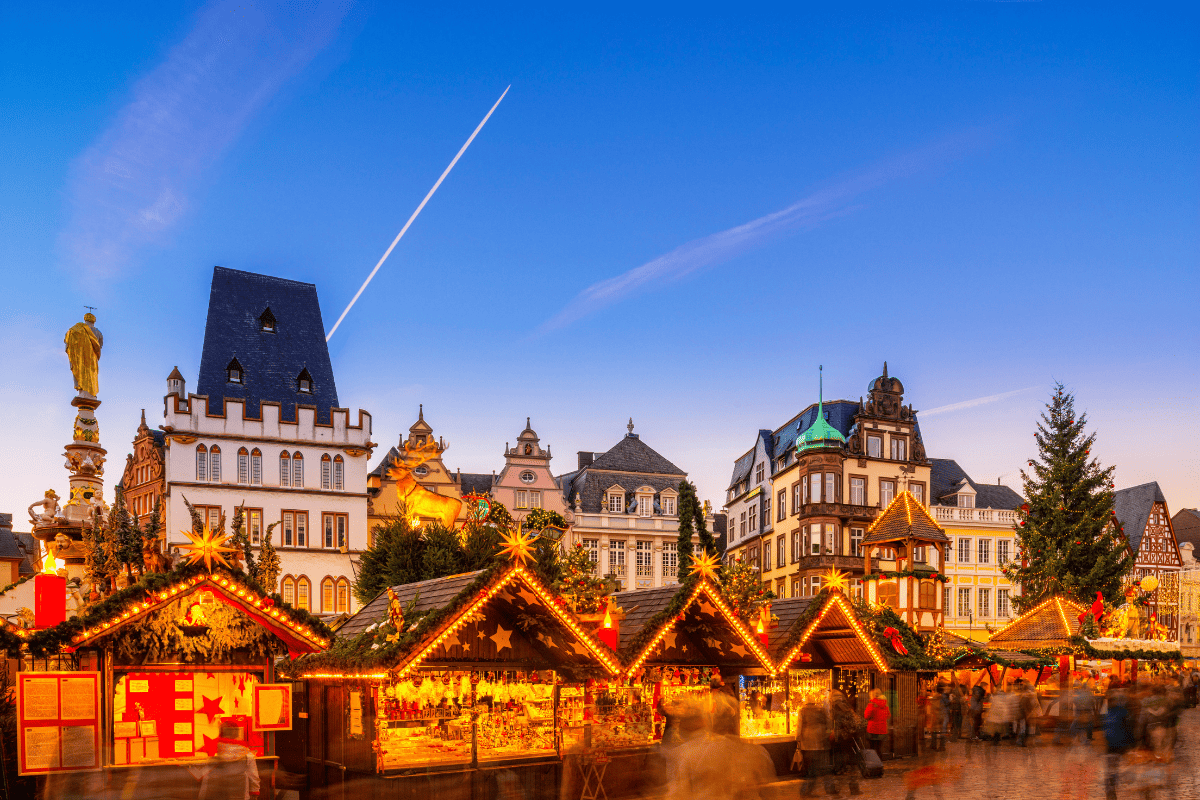
Germany Travel Guides Comparison Chart
Here’s an overview of the best guidebooks for Germany travel. Scroll down for a more detailed review of each book!
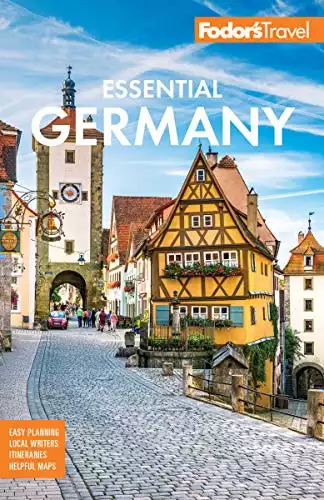
- Perfect for insider tips
- Full-size street maps
- Sample itineraries
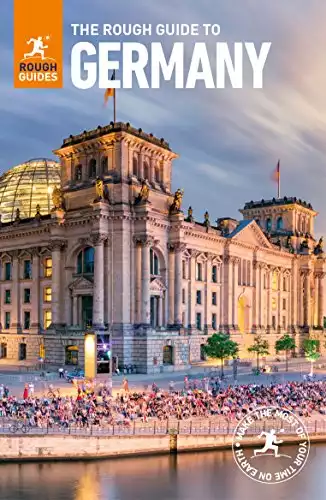
- Free with Kindle Unlimited (as of now)
- Carefully planned itineraries
- Full-color maps

- Perfect first timers
- Strategic advice for making the most out of your budget
- Tips on how to plan a multi-week trip to different cities in Germany

- Honest reviews of restaurants
- Free on Kindle Unlimited too
- Add notes to personalize your digital guidebook
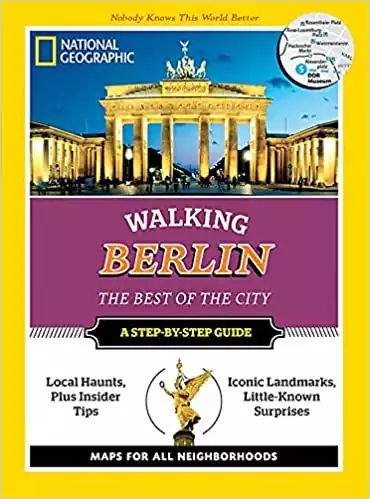
- 15 walking tours
- Step-by-step itineraries
- Detailed maps

- Up-to-date research on travel information and what businesses are still open after light of Covid-19
- “What’s new” sections featuring cultural trends
- New, up-and-coming areas to visit

- Insider travel tips
- How to avoid tourist traps
- Rothenburg & Rhine focused

- Germany, Austria & Switzerland
- 33 trip ideas
- Fastest travel routes & scenic detours

Small & handy
Books for Berlin, Hamburg & Munich
Expert advice on top tourist destinations & neighborhoods

- 24 well-researched driving routes.
- Discover stunning views and hidden gems off the beaten track
- Practical tips for driving in Germany

50 key routes
Tips on the best ticket deals
Fun sights to see along the routes

- Advice for first-timers
- Covers Germany & other European cruise routes

- Fun facts about Germany
- Language learning
- Coloring pages, quizzes, puzzles & journal pages

- German history
- Cultural values, traditions & etiquette
- Regional cultural differences

- 1,000 basic words, phrases, and sentences in German
- Small talk, asking for directions, finding a bank, ordering at restaurants
- Phonetic pronunciation guide!
How To Choose The Best Travel Guide For You
There are a lot of travel guides on the market, making it pretty overwhelming to find the right one. When choosing the best travel guide for your trip, there are a couple of things you should take into consideration.
Grab our FREE Germany Trip Planning Checklist Now!
What are your travel plans?
If you’re going on a multi-week trip across Germany, visiting several cities and regions, then the best travel guide for you will be a comprehensive general country guide on Germany.
These kinds of guides usually have multiple chapters dedicated to all the big cities and regions, making it easy to flip through whichever destination you’re going to along your trip.
On the other hand, if you’re mostly staying in a specific region or a couple of cities, then it’s better to find a regional guide that really narrows in the area you’re visiting. This way you won’t be bogged down with city information that may not be applicable to your trip.
What’s your travel style?
If you’re going on road trips, you’ll find guidebooks with specific information and helpful tips on driving in Germany, the best scenic routes, and more. Likewise, if you’re going on a river cruise, find a guide that covers that specific type of travel. There are also guides that are geared towards kids.
What’s your preferred writing style?
Do you prefer matter-of-fact, objective, no-frills writing? Or do you gain more value from reading personal guides filled with the author’s own anecdotes and experience of the city?
There are also guides that focus heavily on history, others on beautiful travel photography. Make sure to read reviews to get a gist of the style and content of the guide!

Fodor’s Essential Germany is the perfect guide for those who want insider tips on how to experience Germany like a local.
Fodor’s Travel Guides are all written and researched by local experts, who can offer you unique insights you might not find in other guides.
In this guide you’ll find fully updated information on all of Germany’s main attractions and hidden gems, which includes restaurants, hotels, and even outdoor activities.
As well as full-size street maps and beautiful photographs, you’ll also have access to multiple sample itineraries to help you make the most out of your travel time.

The Rough Guide to Germany is one of the best options for those who want a guidebook on their Kindle – it’s free with Kindle Unlimited (as of now)!
You’ll have rundowns of must-see landmarks, carefully planned itineraries, and full-color maps to navigate the streets of Berlin or Munich without the need to go online.
This guide covers a vast majority of areas in Germany, not just the major cities . If you’re spending more time in a certain region, then the detailed regional coverage will be very useful.

Rick Steves is one of the most well known travel writers from the United States. His mission is to empower Americans to go on fun and culturally enriching trips to Europe and his guidebook to Germany reflects that.
People who are traveling to Germany for the first time will find this guide very useful. It has strategic advice on how to make the most out of your budget and time with tips on how to plan a multi-week trip to different cities in Germany.
Other handy features include self-guided walking tours, a packing checklist, and a German phrasebook. This edition also has up to date detailed information reflecting the changes brought about Covid-19.

Lonely Planet has some of the best guidebooks in the market and the Lonely Planet’s Germany is no exception - it's currently the #1 best seller on Amazon.
They provide comprehensive and trustworthy information on everything you need to know about Germany, from the most visited tourist areas to less well known historic cities.
This guide makes sure to provide itineraries and honest reviews of restaurants, shops, landmarks that cater to every kind of travel style and budget.
The book is available in both digital (it’s free on Kindle Unlimited too!) and paperback versions. The digital version comes with downloadable PDF and offline maps that are great for preventing extra roaming charges, embedded links to recommendations with websites.
You can even add notes to personalize your guidebook. The paperback version is small and sleek, making it easy to bring around while traveling.

If you’re staying in Berlin for some time, then you’ll probably be spending a good amount of time walking (alongside using their excellent public transport).
And there’s no better way of getting to know a city than by walking! National Geographic Walking Berlin is the best guidebook for this.
This book contains 15 walking tours with step-by-step itineraries and detailed maps that will have you roaming and exploring Berlin like a true local in no time.

Lonely Planet just came out with their newest guide on Munich, Bavaria, and the Black Forest.
Whether you’re looking for the perfect spa town to relax along the Black Forest or celebrating Oktoberfest in Munich, this guidebook will have you covered.
Since it was just recently published, you’ll be able to find up-to-date research on travel information and what businesses are still open after light of Covid-19.
Aside from all the essential reading, there are also “what’s new” sections that feature cultural trends and new, up-and-coming areas to visit.

From wandering around quaint villages, going back in time exploring ancient castles ruins, or dining in good restaurants by scenic vineyards, the Rhine Valley is a must-visit.
It’s particularly known as a romantic destination, but every kind of traveler can enjoy it. Rick Steves’ guide to the Rhine is a great place to start planning your trip.
It includes insider travel tips on how to beat crowds and avoid tourist traps. The selective coverage also includes information on Rothenburg, a picturesque well-restored medieval city.

Lonely Planet’s Guide to Germany, Austria, and Switzerland is perfect for those whose travel plans always include day trips or road trips.
Especially if you’ve planned your itinerary with the goal of visiting neighboring countries like Austria or Switzerland, then this guide is for you.
This guide covers everything from the Romantic Road, Lake Bodensee, the Swiss Alps, Zurich, Lake Geneva, Vienna, Salzburg, and more! It features over 33 trips to take with useful advice on breaks to stretch your legs along the way, the fastest travel routes, and scenic detours.

The Lonely Planet’s Pocket Guide series are perfect for those taking shorter trips over a weekend or maybe those who have limited leisure time during business trips.
These guides are small and handy, getting down to the basics of each German city. It’s easy to use and concise, with expert advice on the top tourist destinations, neighborhood chapters, and day planners.
Click here for more information on Pocket Berlin, Pocket Hamburg , and Pocket Munich

DK Eyewitness Road Trips is ideal for those who want to explore Germany through road trips.
This guide contains 24 well-researched, easy to follow driving routes. Each lasts from 1 to 5 days, so you can choose any depending on your time and preference.
You’ll get to learn about stunning views and hidden gems off the beaten track that you can only discover on the road. It’s full of practical tips like road conditions, detours, parking info, and navigation details for GPS use.
Plus, each tour includes ideas for activities and sights along the way.

Europe by Rail is the definitive guide for planning your European trail travel journey using Interrail or Eurail.
This guide includes 50 key routes that you can follow or incorporate into your Germany itinerary.
It also contains tips on the best ticket deals, where to stay, and fun sights to see along the routes. It covers popular routes such as Glacier Express, the Rhine Valley, French Riviera, and the Scottish Highlands with information on new routes to Slovakia, Greece, and more.

River cruises have been gaining popularity, with many tourists loving the different perspective you get as you travel by water through scenic riverfront views.
Riverboats are usually much smaller than Mediterranean cruises, making for a more social experience and more frequent stops and onshore activities.
This Lonely Planet guide is perfect for those going on a European cruise through a number of different countries but who do not want to buy a guide book for each country.
It covers the following routes: Northern Rhine, Southern Rhine (France, Germany, Switzerland), Western Danube (Austria and Germany), Eastern Danube (Hungary and Serbia), the Seine (France), and the Elbe (Czech Republic and Germany).

Traveling with children to Germany for the first time can be intimidating. Kids Travel Guide Germany is here to help ease your worries!
This guide is a fun gift to give your kids as a way to cultivate their interest in traveling from a young age. Leonardo, the cute cartoon tour guide, will teach your kids fun facts about Germany and even basic German words.
It also comes with an activity book full of coloring pages, quizzes, puzzles, and journal pages to document their trip.

Nothing enriches travel experiences like immersing yourself in the country’s local culture. Culture Smart Germany shows you everything you need to know about German culture and way of life.
You’ll find chapters discussing history, values, cultural differences between regions, cultural traditions, and common etiquette to follow.
It’s great for navigating day to day life while you travel and even for more formal business trips.

This German phrase book is the ideal companion for your trip to Germany.
With more than 1,000 basic words, phrases, and sentences in German it covers every travel situation you could think of from small talk, asking for directions, finding a bank, and ordering at restaurants.
Easy to use and straight to the point, this guide will help you familiarize yourself with the German language and navigate social situations with locals. It also comes with a phonetic pronunciation guide!

What To See And Do In Germany?
If you’re not sure which guidebook will work best for you, consider where you most want to spend your time.
Germany is filled with tons of historic places to learn from, beautiful landscapes to admire, and fun cultural activities to experience. To get a gist of what awaits you in your Germany trip, let’s break it down to some of the main travel destinations in the country.
Berlin, the capital of Germany (and the largest city), is where you’ll find some of the most iconic landmarks of German history. You won’t run out of things to see from the Brandenburg Gate, the East Side Gallery, the Holocaust Memorial, the German Parliament Building (Reichstag), and many more.
For more information on the top historic places to visit in Berlin, read our guide to planning the ultimate Berlin itinerary.
This dynamic city has also undergone a lot of changes in the past decades, growing into one of the most interesting cities to visit in central Europe. Many people are drawn to the vibrant Berlin arts scene and music scene.
After all, the capital city is home to world-class museums (including some that give you a glimpse into what life was like in East Germany) and some of the best nightlife in Europe.
Plus, it’s the gateway to rugged Rügen island to the north on the Baltic Sea, historic Dresden to the south, as well as “Swiss Saxon” national park area.

Hamburg, located on the Elbe river in northern Germany, is one of the most unique German cities. Famous for its ports, lakes, canals, and rivers running throughout the city, Hamburg shows you a different side of Germany.
Whether you canoe through the canals (super fun!) or try delicious fresh seafood after a harbor cruise, you won’t run out of fun activities to do in Hamburg. It’s one of my favorite cities in Germany!
The Black Forest is a region worth visiting for its spectacular scenery, small towns, and close proximity to France and Switzerland. It’s one of the best places to visit for those who love outdoor activities. There are hundreds of miles of hiking trails to explore and lakes and waterfalls to admire.
In-between immersing yourself in nature, you can explore picturesque smaller towns like Baden-Baden, Heidelberg, or Freiburg, and villages like Titisee-Neustadt, Triberg, and Gengenbach. You can also spend an afternoon seeing how people used to live at the Black Forest Open Air Museum.
Making your way to southern Germany, you’ll find the Bavarian Alps. For a scenic drive that makes the most out of your experience, we recommend driving south down the Romantic Road.
This route connects storybook castles , medieval towns, and breathtaking landscapes. It’s also one of the best ways to get to Neuschwanstein, the fairy tale castle that’s undoubtedly one of Germany’s most popular attractions.
A staple in all Germany itineraries is, of course Munich, the biggest city in Bavaria. It’s a popular destination for good reason – it’s a beautiful city rich with history far beyond the famous Oktoberfest. Munich (and Bavaria in general) is what most people envision when they think of Germany.
From Munich’s beer gardens, lush urban parks, and historic plazas, you won’t run out of things to see! Check out our guide on how to plan the perfect Munich weekend itinerary here.

Before leaving southern Germany, make sure to stop by Lake Constance (Bodensee in German). Found along the country’s border of Austria and Switzerland, this region with its lakeside small towns is a great place for sunny summer holidays.
In Central Germany, you’ll find the Rhine Valley which holds great historical and cultural importance as a UNESCO World Heritage Site. It’s also a popular romantic destination where you can do activities like wine tasting in hillside vineyards and going on a cruise on the Rhine river. We recommend exploring the area on a boat tour to bring you to quaint villages and ancient castles.
Cologne is a great gateway city to the Rhine Valley. The city’s old town is home to the famous Cologne Cathedral and it’s a great walkable area with lots to see.
Another nearby major city is Frankfurt. Though you may only know Frankfurt as Germany’s financial capital or home to one of the world’s busiest airports, the city is fun to explore for its modern architecture, the contrasting historic old town, and interesting museums. Read our guide to spending a day in Frankfurt here or how to day trip to the many castles in the area.
We hope this gives you a good idea of all the exciting things to see and do in Germany. We know there’s a lot to take into consideration. That’s why we also prepared a step-by-step guide on how to plan the perfect Germany vacation that answers everything from where to stay, what cities to visit, and how to get around!

When Is The Best Time To Go To Germany?
We get this question a lot! The best time to go to Germany totally depends on what kind of experience you’re looking for. There’s really no bad time to visit because each season has something great and unique to offer!
During summer, you’ll get to enjoy warm and sunny weather. The long days are perfect for sightseeing since the sun sets as late as 10:00-10:30 pm. Be aware that you won’t always be guaranteed clear, blue skies, though. Some days can be rainy or windy but that kind of weather usually doesn’t last longer than a couple of days.
On the flip-side, it can also get really hot during heat waves, and you won’t find A/C in all restaurants and hotels.
Another downside is that since it’s peak season, streets and tourist attractions can be much more crowded with families from all over the world traveling during summer break. Prices for tickets and accommodations are also at their highest so we recommend booking reservations as early as possible.
Winter can also be a beautiful time to visit, but you’ll obviously have a very different experience. Snow, cold weather, and short days with the sun setting as early as 5 pm are just some of the things that you can expect.
Luckily, you’ll have the festive bright lights and cozy atmosphere of Christmas markets to make up for it. It’s also an ideal time to visit if you love winter activities like skiing or sledding.
Fall can be a good time to visit, especially if you want to participate in Oktoberfest festivities which take place late September to early October. The autumn weather means it’s still pleasantly enough for strolls, though you’ll have colder nights as you approach winter.
Weather during spring can be a bit of a toss-up. Some days can bring light breezes and warmth but other days can be gloomy and rainy. But you’ll get to see cities come alive and locals spend more time in parks or beer gardens as flowers bloom and outdoor activities kick into gear.

Cate has been traveling to Germany for 30+ years. She has lived in Germany, taught college German, and has a PhD in German Applied Linguistics. She loves helping travelers plan their dream trips to Germany!
Similar Posts
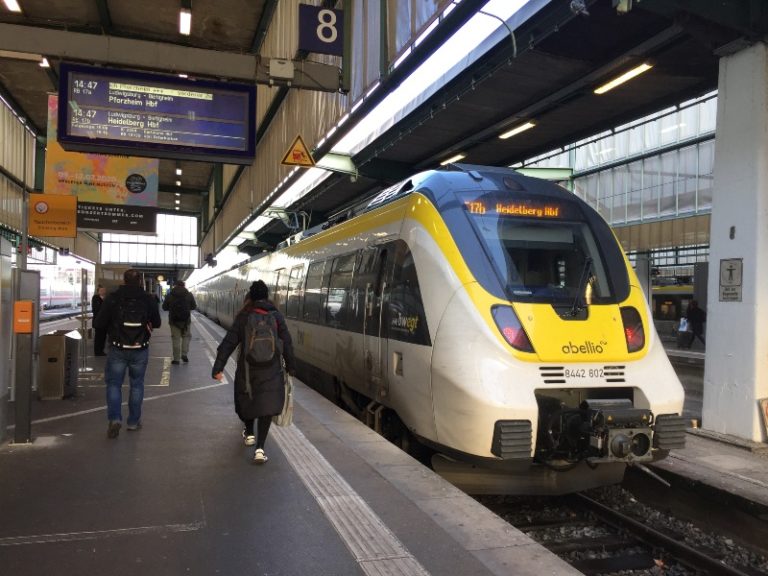
How to Buy the Deutschland-Ticket For Your Trip to Germany Without a German Bank Account
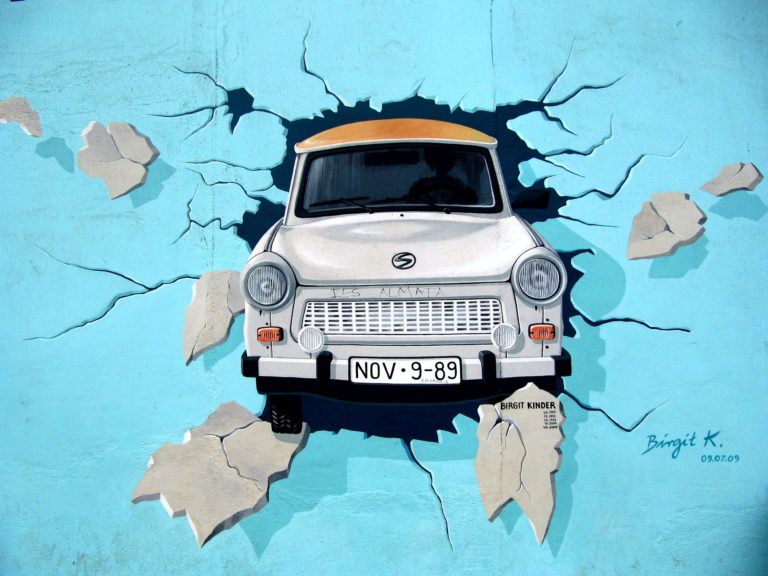
13 Books About Germany For Your Germany Vacation
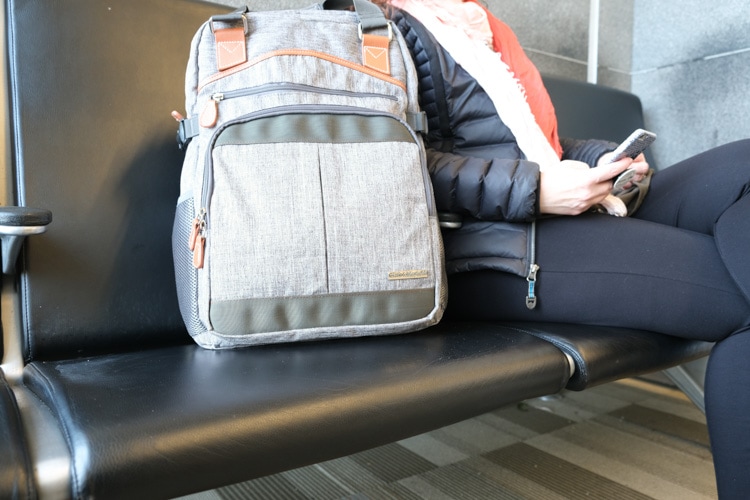
Clark & Mayfield Reed 17 Travel Backpack Review

The Best Beer To Try in Germany for 2024
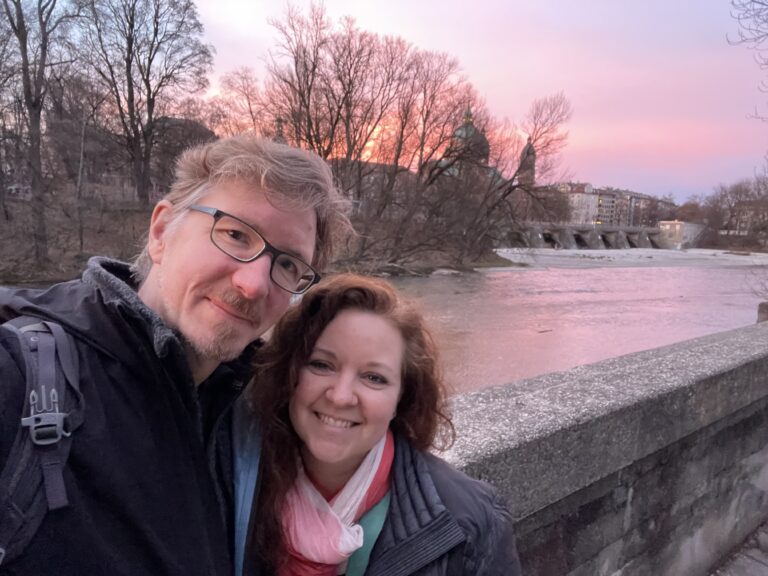
45+ Perfect Holiday Gifts For The Germany Traveler
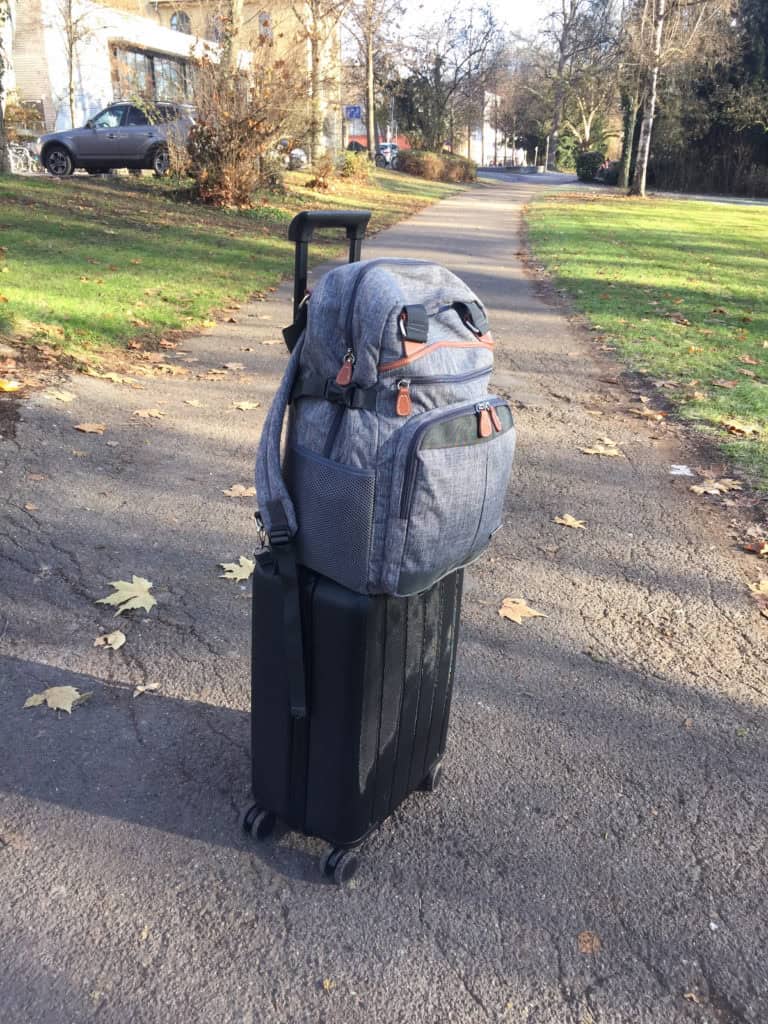
Best Germany Packing List for 2024
Here’s how we can help you plan your perfect trip in 2024.
GERMANY TRAVEL PLANNER: Just getting started? Have questions about Germany’s confusing train tickets or how to find the best guided tours? Not sure which parts of Germany should be in your itinerary (and what to leave out)? Our Germany Travel Planner answers those questions and more via how-to videos, our interactive Germany Planning Map, City Cheatsheets, and MUCH more. Click here to unlock the best of Germany the easy way!
GERMANY TRAVEL CONSULT: Feeling overwhelmed? Itinerary just not coming together? Wonder if a few tweaks would take your trip to the next level? Book a Mini or Full consult with Cate! She’ll help you create or tweak your itinerary, recommend train tickets/passes, hotels, things to do, guided tours, show you how to buy train tickets, orient you to specific cities, help you plan out day trips, and answer your Germany travel questions.
ACCOMMODATIONS: We recommend using Booking.com since they have widest range of accommodations available from hostels, boutique hotels, luxury chains, aparthotels, at the best prices. Check out our accommodation guides for specific recommended hotels.
WHAT TO PACK: If you’re bringing your phone, be sure to bring this plug adapter , this power bank , and this wrist strap . They’ve been lifesavers for us! You can see our other packing essentials here and here .
TICKETS & TOURS: For guided tours, day trips, private tours, and skip-the-line tickets, Get Your Guide is our go-to!
TRAINS & BUSES: To research train schedules and buy tickets or a Germany Rail Pass, we recommend the official Deutsche Bahn (German Rail System) website (and download their DB Navigator app). For buses, look at FlixBus , which offers tickets for routes within Germany and to other European countries. FlixBus is often cheaper than trains but can take longer.
Leave a Reply Cancel reply
Your email address will not be published. Required fields are marked *
Save my name, email, and website in this browser for the next time I comment.

IMAGES
VIDEO
COMMENTS
Drinking. Beer and wine are part of a normal dinner and alcoholic drinks are usually offered to guests. Not drinking, however, is completely accepted. Do not insist on alcoholic drinks if a person has rejected your initial offer and don't order them for them. A German who rejects a drink is not just being shy or polite but does not want to drink.
Don't get caught red-faced on your visit. This ultimate travel guide to German etiquette will have you exploring like a local. Use the proper greetings. Greetings in Germany are more nuanced than merely waving a casual "hi"and "bye". Appropriate greetings depend on who you're welcoming, and when you're doing so.
In German etiquette one thing is for sure: extending greetings to those you encounter is critical. When entering a room, at restaurants and shops, at the gym or doctor's office - it is expected that one say hallo (hello) in greeting and tschüss (bye) on the way out, even if you don't know anyone there. It's not limited to interactions ...
Dress the part. Don't stare at the naked people. Don't misinterpret the more reserved attitude. Get some "house shoes.". Keep an open mind about closed doors. Guys, think about how you pee. "Don't mention the war!". German Etiquette for Work. Plan, plan and plan again.
Here we inform you of our 20 Things to Know Before Visiting Germany, including crucial German etiquette standards and how to travel throughout Germany with grace and dignity. Crucial German Etiquette How to Visit Germany with Grace. There are only a handful of countries that are so different yet so similar to North America, then Germany.
A rich history, annual festivals like Oktoberfest, stunning architecture, beautiful forests, and even Bavarian pretzels are enough to bring travelers to Germany year after year. If you're visiting Germany for the first time, you may find the culture and rules of etiquette much different from your own.
In this magazine article, we will discuss in detail what to expect in the form of travel etiquette when visiting Germany. Basic Etiquette. When out in public, such as on the street, in stores or restaurants, German etiquette expects that you make a good impression. This means dressing appropriately, keeping your voice at an appropriate volume ...
German Manners for Greetings and Farewells What to say - Greetings and Farewells. In Germany you'll be expected to say "hello" and "goodbye" when you arrive and leave a meeting, a party, a store or any other public space. Depending on the time of day Guten morgen, Guten Tag or Guten Abend are appropriate greetings. In less formal settings you can also say Hallo.
Separating and properly disposing of glass, plastics, paper, organic waste and hazardous materials is a big deal in Germany. Many houses will have an array of different colored bins in the ...
Garbage. The disposal of rubbish in Germany should be a subject of academic study. First things first: It's important to separate waste. Germans take a lot of pride in that. One bin for paper, one bin for recyclables, one bin for organic waste (like food scraps or vegetable peelings), one bin for the rest. Leon Seibert.
German Etiquette: Don'ts. Don't #1. Cross the street when the traffic light is red. German people are very disciplined. Even when no car is coming, they do not cross the road on the red pedestrian light. This "don't" is fundamental when children are around. You should be a good role model for the children.
Germany, known for its rich history, stunning landscapes, and culture, has its customs and traditions that visitors should know. Here are some essential German customs and etiquette tips to help you easily navigate your trip. Greetings: When meeting someone in Germany, greeting them with a firm handshake and direct eye contact is customary ...
Speaking of money, one thing that shocks many Americans is the tipping system in Germany. The easiest rule of thumb is to just round up your bill. You are not required (or even expected!) to tip 15% in Germany. Waiters and waitresses in Germany get full wages, health insurance, and the whole shebang of worker's rights.
Don't walk in the bike lane. As long as you stick to the rules, cycling is a great way to get around. Berlin has twice as many bikes per head as cars, and an estimated half a million of them traverse the city every day, with new superhighways in the pipeline. But this can make things slightly more challenging if you're on foot.
Rough Guides® is a trademark owned by Apa Group with its headquarters at 7 Bell Yard London WC2A 2JR, United Kingdom. Learn about the local culture and etiquette in Germany. Prepare for your trip by acknowledging local customs, religions, and learning about national traditions in Germany. Get guidance on how to dress, how to eat and how to ...
6. German Business Culture and Etiquette: How to Behave in Business. In this section, you'll learn about some German professional etiquette rules. When it comes to German etiquette, business depends on knowing your way around it! Here are some German etiquette do's and don'ts for doing business in Germany. 1- Do: Bring your own cake.
Fire and ambulance:112. Entry requirements. British and other EU nationals can enter Germany on a valid passport or national identity card for an indefinite period. US, Canadian, Australian and New Zealand citizens do not need a visa to enter Germany, and are allowed a stay of ninety days within any six-month period.
17 Important Must-Knows Before You Travel in Germany. 1. It's all about that cash money, yo. You might expect Germany, producer of supercars and epic technology to be on board with the whole credit card trend, but this simply isn't the case. I know it's weird, but you'll find that many places in Germany don't actually take credit card ...
Food & Drink. Explore the local culinary scene, from breakfast to Michelin-starred restaurants. Sip cocktails, savor desserts, and discover the best local markets. Discover Germany's treasures with expert guides. Delve into the heart with locals' insights. Culinary hotspots off-the-beaten-path wonders await...
Germany travel tips: be prepared for unpredictable weather and visit off-season to avoid crowds. Germany offers a wealth of history, culture, and natural beauty, from the bustling cities of berlin and munich to the enchanting landscapes of the bavarian alps and the black forest. ... Follow social etiquette and respect personal space. Avoid ...
So if you're planning a long-term trip to Deutschland, whether you're a student, business person, or simply a long-term vacationer, here are 4 travel etiquette tips that should guide your travel. 1. Don't Generalize. From the outside, it's easy to judge Germany as a single cultural entity of inhabitants who love Sauerkraut and beer, know how to ...
Germany is a popular holiday destination for many people especially as travelling from Britain to Germany is now easier and quicker than ever. In terms of social customs and etiquette, whilst the basic rules remain largely the same as with any other European country, you should make yourself aware of some slight but important cultural ...
15. 1001 Easy German Phrases. $7.95. This German phrase book is the ideal companion for your trip to Germany. With more than 1,000 basic words, phrases, and sentences in German it covers every travel situation you could think of from small talk, asking for directions, finding a bank, and ordering at restaurants.